the R ecoRd

“We are called to live life to the full, to enjoy all that God has given us and not be so serious”


“We are called to live life to the full, to enjoy all that God has given us and not be so serious”
HE WENT to World Youth Day for “the worst of reasons” but it seems God’s will won out.
Marcus Beard shared his story with a crowd of about 400 at the post-World Youth Day “Sunday Sesh” on 18 September, organised by Perth’s Catholic Youth Ministry.
Eighteen months ago, he said, he was struggling with depression and anxiety when he heard about WYD Madrid from a friend.
“I decided World Youth Day would be a good idea – to get a cheap plane to Europe, make a few
apearances at Mass and then go off around Europe and do my own thing,” he said. “It didn’t exactly work out like that.”
Going to Mass in the lead-up to WYD, he “fell in love with the Church” and the “awesome people” around him. He then ended up becoming a youth leader at Our Lady of the Mission in Whitford.
The WYD experience also got him thinking about his vocation. He came to realise, he said, that all vocations – marriage, religious and single life – were valid and he would try to “keep his heart open” to discern the right one for him.
He recalled the storm that hit Madrid the night before the apex of WYD, the final Mass celebrated by Pope Benedict XVI.
Huddling with his fellow pilgrims, it was his turn to lead the
“God loves it when we have a good time.”
Rosary; something he had never done before and was reluctant to do. After some gentle persuading, he relented.
“It was the most at peace I’ve felt in a long time,” he said. “I was sur-
rounded by these people praying against the storm; people I had only known for a few weeks but I really care deeply for and know that they felt the same way.”
Marcus was one of several speakers at the Sunday Sesh event held at Corpus Christi College’s gym following a special WYD reunion mass at nearby St Thomas More Church, in Bateman.
The night also featured music from the band Youth Impact and international Catholic recording artist Fr Rob Galea. In an hour-long performance punctuated by preaching, Fr Rob
roused the crowd with material drawn from his four-album repertoire as well as several choice covers of songs by the Black Eyed Peas and Taio Cruz.
“One of the greatest passions I have is to tell people that God loves it when we have a good time,” Fr Rob said to a jubilant crowd.
“We are called to live life to the full, to enjoy life and all that God has given us and not be so serious.
“As Catholics sometimes we there with a candle in our handso sweat and so holy. But that’s not what holiness is about.
Continued on Page 5
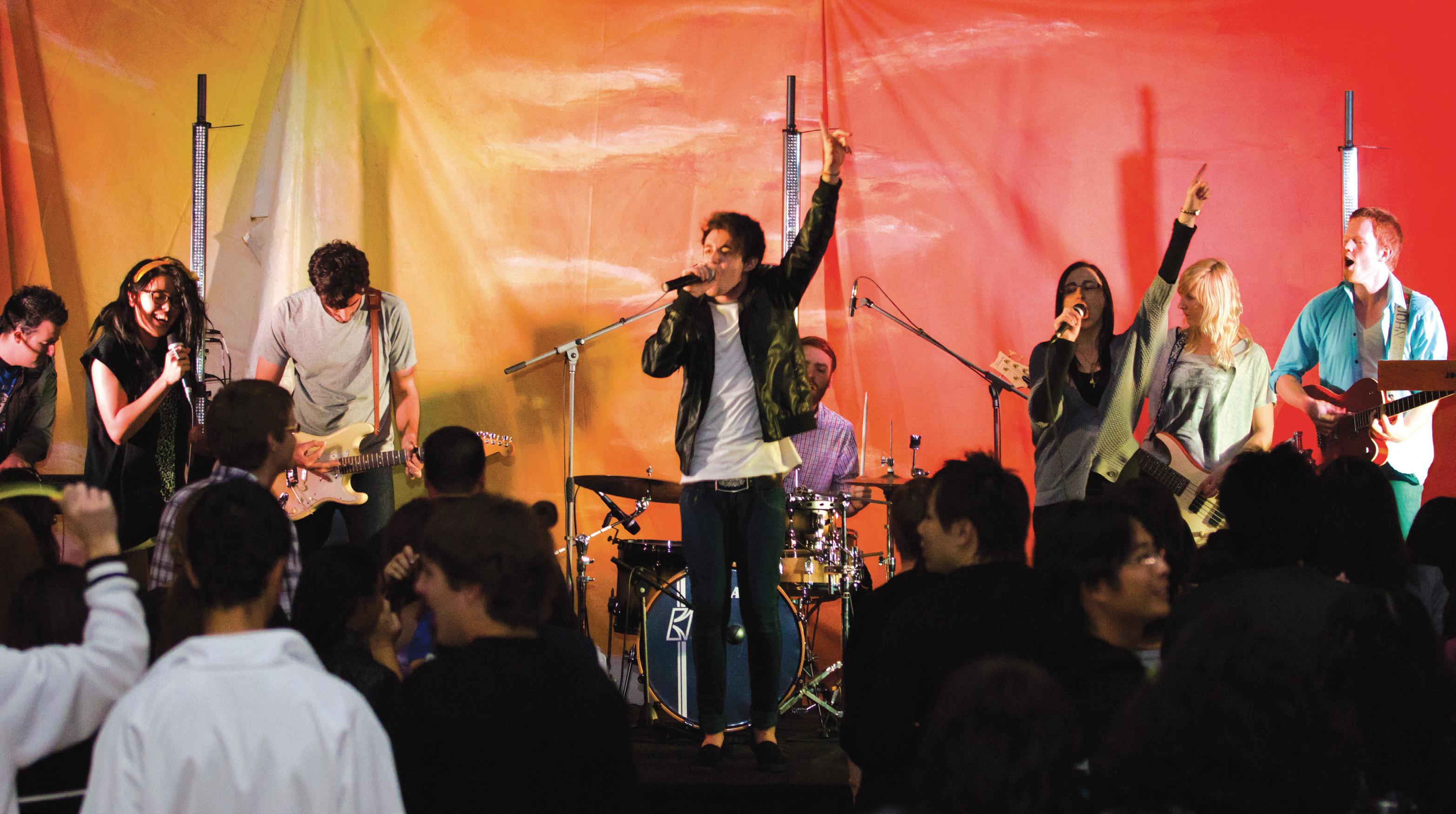
IT BEGAN as one man’s mission to make peace with his past and reconcile with the bride he deserted but still loved. But now the personal story of the Traditional Anglican Communion’s global prelate, Archbishop John Hepworth, has become something more.
Archbishop Hepworth’s allegations of byzantine delays by the Archdiocese of Adelaide in acting on his complaints of sexual abuse, first raised in 2007, against two priests now dead and one still alive and running an Adelaide parish, have ignited a media firestorm.
Contradictory versions of events proffered by Archbishop Hepworth
and the Archdiocese of Adelaide have put on the line the credibility of a leading figure in the most significant rapprochement of Protestants with the Catholic Church since the Reformation and the presiding head of the Australian Catholic Bishops Conference.
The issue that will vex the archdiocese is not why it took four years to begin a formal investigation but its alacrity since the complaint was formalised in February, given the back history and the complainant’s role in the reunification of Anglicans to the Catholic communion.
On the periphery conspiratorial theories circulate. These involve the revelations’ timing, on the eve of
the Australian bishops’ five-yearly “ad limina” trip to report to the Vatican; the breaking of the story by The Australian reporter Tess Livingstone (biographer of George Cardinal Pell); and the contrast of Adelaide’s response to that in the Melbourne archdiocese, where Archbishop Hepworth’s complaints against two dead Victorian priests were upheld by independent commissioner Peter O’Callaghan QC.
Melbourne’s protocol to handle abuse complaints, established by the then Archbishop Pell, predates the 1996 adoption of national “Towards Healing” guidelines.
In a statement intepreted by some as implicit criticism of the Adelaide archdiocese’s response, Cardinal
Pell said: “More information seems to be needed to explain further to the the public any unusual delays in acting on this complaint, and the decision not to stand aside the person who has been accused.”
Yet he also noted that: “Towards Healing procedures are genuine, adequate and work well.”
Differences between the socalled “Melbourne Response” and Towards Healing were not about principles but procedure, said the executive officer the Australian bishops’ National Committee for Professional Standards, Sr Angela Ryan CSB. Melbourne directed complaints to an independent commissioner, Peter O’Callaghan QC, who assessed their validity and
then, if appropriate, referred them on to a compensation panel.
Under Towards Healing, a contact report was first prepared by the relevant Church authority (in this case the Adelaide archdiocese). If an investigation was necessary, professional assessors were appointed to interview the parties and commake and assessment.
The Adelaide archdiocese has adhered rigorously to the guidelines before proceeding to an assessment.
Section 37.3 of Towards Healing stipulate a complainant not wishing to go to the police must sign a statement before the Church takes any action. That statement notes that the Church has “strongly urged” the Continued on Page 4
STUDENTS of Mercedes College in East Perth are learning what it’s like to live on the other side of life in the school’s bi-annual programme ‘Poverty Immersion’.
Year 12 student Chelsea Wilson (17) participated in ‘Poverty Immersion’ last year and described the experience as “life-changing”. She said, “You can watch poverty on the news but it’s much different when it affects you and your home”.
‘Poverty Immersion’ runs in March and August. Over four days a small group of year 11 students are given a glimpse into a life of poverty as they work with support agencies across the city including The Salvation Army, Shopfront and The Red Cross.
During their immersion students sleep on mats, eat a diet of only soup and bread and are given $10 to spend on clothes at St Vincent de Paul’s that they must wear during their four days of immersion.
Isabelle Kelly (16) joined the programme in March this year and said she found it difficult to keep to her budget of only $10. “We had the expectation that we were shopping for fun but when you start going through it you realise that this is some people’s only option.”
Georgia Volk (16) took the programme in August and said the standard of the clothes was so low and she felt bad for the people who had to wear them. “Jumpers were expensive”, she said “and because we went in winter it was really cold.”
Students are blessed at St Mary’s Cathedral before beginning their pilgrimage. Chelsea said the pro-
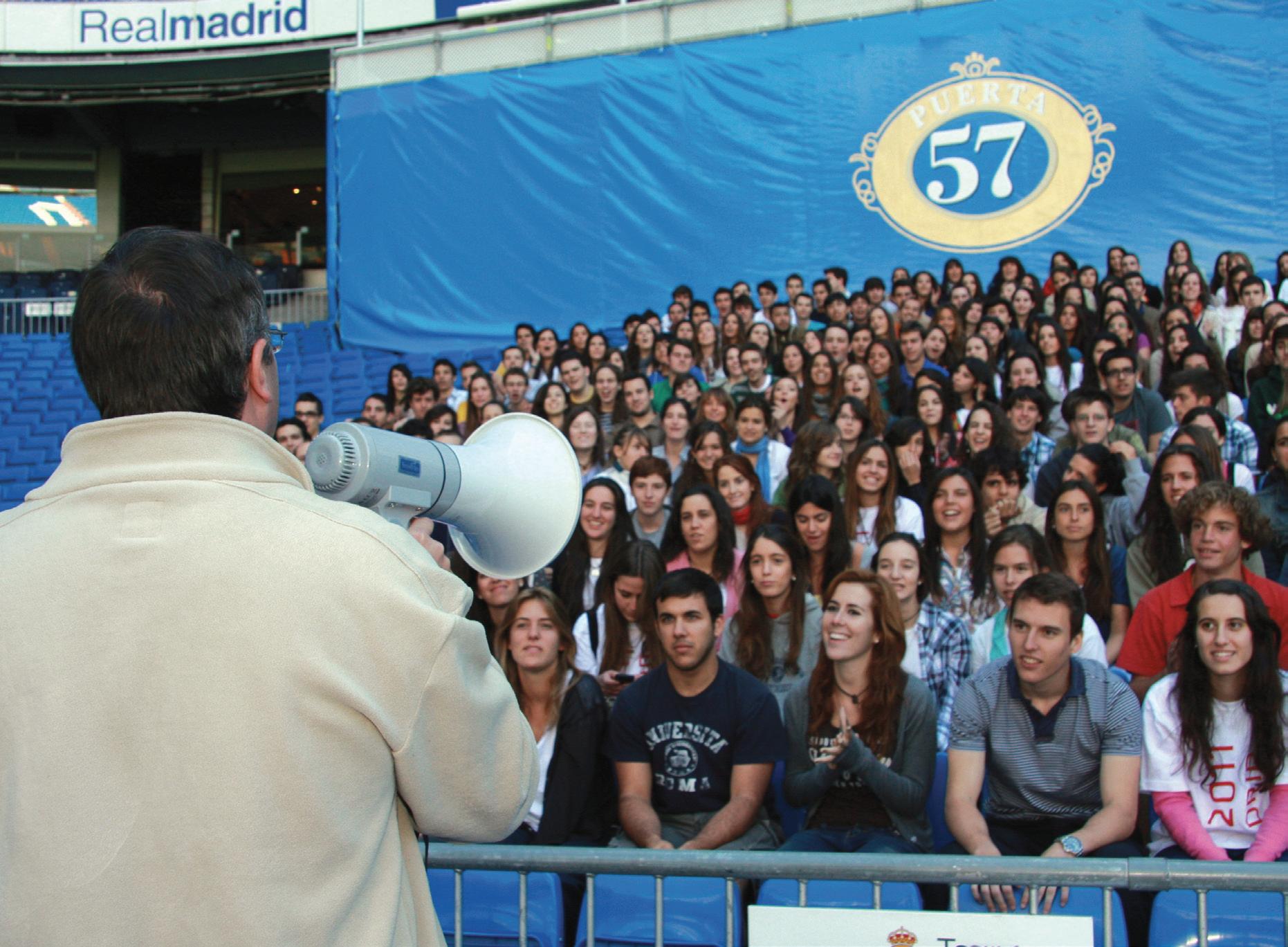
gramme has affected the way she looks at life and the way she sees and judges people but the most unexpected experience of ‘Poverty Immersion’ was the comparison of shopping centres in Mirrabooka and Claremont. Dressed in their op shop clothes, the girls said their time at Claremont was a “horrible” experience. “Young people would look down at you and think you were shoplifting. Store owners would follow you around the shops.”

Editor
Peter Rosengren office@therecord.com.au
Journalists
Mark Reidy mreidy@therecord.com.au
Tim Wallace twallace@therecord.com.au
Rob Hiini rhiini@therecord.com.au
Advertising/Production
Mat De Sousa production@therecord.com.au
Accounts
June Cowley accounts@therecord.com.au
Classifieds/Panoramas/Subscriptions
Catherine Gallo Martinez office@therecord.com.au
Record Bookshop
Bibiana Kwaramba bookshop@therecord.com.au
Proofreaders
Chris Jaques Eugen Mattes
Contributors
Debbie Warrier John Heard
Karen and Derek Boylen Anthony Paganoni CS Christopher West Catherine Parish
Bronia Karniewicz Fr John Flader Guy Crouchback
The Record PO Box 3075
Adelaide Terrace
PERTH WA 6832
21 Victoria Square, Perth 6000
Tel: (08) 9220 5900 Fax: (08) 9325 4580
Website: www.therecord.com.au
The Record is a weekly publication distributed throughout the parishes of the dioceses of Western Australia and by subscription.
The Record is printed by Rural Press Printing Mandurah and distributed via Australia Post and CTI Couriers.
Isabelle said when she visited Claremont during her immersion she was wearing a pair of highwaisted, blue and white striped clown pants. People would stop and laugh while students from local private schools would openly mock them. When asked how that experience affected them, Georgia said, “You think twice when you judge people”. The girls said they enjoyed their time at ‘Poverty Immersion’ and especially enjoyed the soup pro-

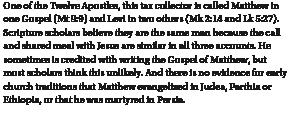


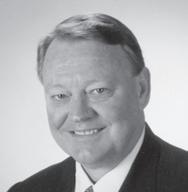
Perth Archbishop, Barry Hickey will have the Pope all to himself in October, in a private meeting of anywhere up to 20 minutes.
The Archbishop will be in Rome from 10-22 October for his Ad Limina Apostolorum visit (“to the threshold of the Apostles) which he, as a bishop, is required to make every five years. Each bishop is required to make a report of his diocese which is usually sent to the Holy See in advance.
Ad Limina visits involve a personal meeting with the pontiff.
According to previous comments Archbishop Hickey has made to The Record, bishops are able to raise any matter they wish during the meeting. The visit will be Archbishop Hickey’s last as archbishop of Perth.
MenAlive, Whitford are inviting men, young and old, to come out bowling on Thursday, 29 September as the group repositions itself to better cater for Catholic men.
The group has had a voluntary survey out at Our Lady of the Missions parish for several weeks, asking men what they want to get out of time spent with other men.
vided by the Red Cross but they think it would be a stretch to live off it. Students who take part in ‘Poverty Immersion’ found themselves empowered by the experience and became more aware of poverty around them. Chelsea is currently taking a break from volunteering at Shopfront, a drop-in centre for homeless people, so she can focus on her TEE. The girls look forward to when they are out of school and have more free time to volunteer at organisations.
Local organiser, Joe Archer said the feedback they had received so far suggested local men preferred a more social emphasis.
The group also encourage men to read Scripture and journal their thoughts.
An electrical engineer and father to two boys and two girls, Mr Archer said he enjoyed “the opportunity to share with other men in a Christian environment” that MenAlive provided.
More information is available from John on 9309 9023 or at archer_53@bigpond.com.
A BREAKTHROUGH programme offered at The University of Notre Dame Australia’s Fremantle campus is equipping first and second year nursing students with skills needed to assist people experiencing acute emotional distress in a first aid scenario. The Mental Health First Aid Training Programme aims to develop students’ emotional first aid response if they encounter someone experiencing psychological distress prior to seeking professional help.
Senior Lecturer and Coordinator
ST JOHN OF GOD Hospital
Murdoch midwife Kerry Brenzi was awarded Catholic Health Australia 2011 Nurse of the Year at a gala celebration in Canberra. An experienced and dedicated midwife who has worked at Murdoch since 1995, Kerry received the award in recognition of the significant and compassionate way she works with grieving parents. At her own initiative and in her own time, Kerry has assembled ‘memory boxes’ for parents in which to keep their baby’s momentos, including cards for foot and handprints, sachet for a lock of hair, an outfit to dress the baby, a quilt and a cot card with the details of birth weight and length. A prayer card, grief booklet and appropriate words and verses are also included and information about support services available in WA. There is also a teddy bear which may be given to a sibling.
Director of Nursing Adam Coleman said Kerry was exceptionally compassionate with a special interest and skills in helping grieving families. “This recognition for Kerry is very special to us. The death of a baby is a difficult time and many parents feel lonely and frightened”, he said. “Kerry demonstrates a high level of respect and dignity, an appreciation of individuality through her compassionate care.” “I feel humbled and honoured”, Kerry said. “Knowing I can provide a memorable keepsake for a grieving family in times of such sad loss is a reward in itself”.

of Mental Health at the School of Nursing and Midwifery in Fremantle, Wendy Scapin, has introduced the programme to give students skills and confidence in meeting the challenges of mental health situations in the community.
“Although mental health content is integrated within the nursing degree from semester one, students further undertake specific mental health nursing content in the latter stages of the programme,” Ms Scapin said.
“Students are currently seeing a
lot of clients in general settings with mental illness. The programme is about raising awareness of mental health issues in the community and giving students basic skills to initially respond to those in crisis”.
The nationally accredited programme was developed in 2001 by Ms Betty Kitchener and Professor Tony Jorm and operates under the auspices of the ORYGEN Research Centre at the University of Melbourne. It gives students an insight to the symptoms, causes and evidence-based first aid treatments
for people experiencing depression, anxiety disorders, psychosis and substance use disorders. Through the use of interactive group activities, students are provided with appropriate first aid skills and strategies to assist in scenarios such as a person experiencing a panic attack.
The programme provides an overview how to apply mental health first aid steps in different scenarios.
First year nursing student Jasmine O’Brien welcomed the opportunity to learn about men-
tal health first aid. “I believe that education in mental health first aid is invaluable”, she said. “We were taught that 90 per cent of emotions are expressed through our faces.
“Hence if you appear friendly and comforting to people with mental health problems, they will be more willing to engage with you and more responsive to advice.”
The programme will be offered three times a year from 2012.
For more information, contact the School of Nursing and Midwifery on (08) 9433 0223.
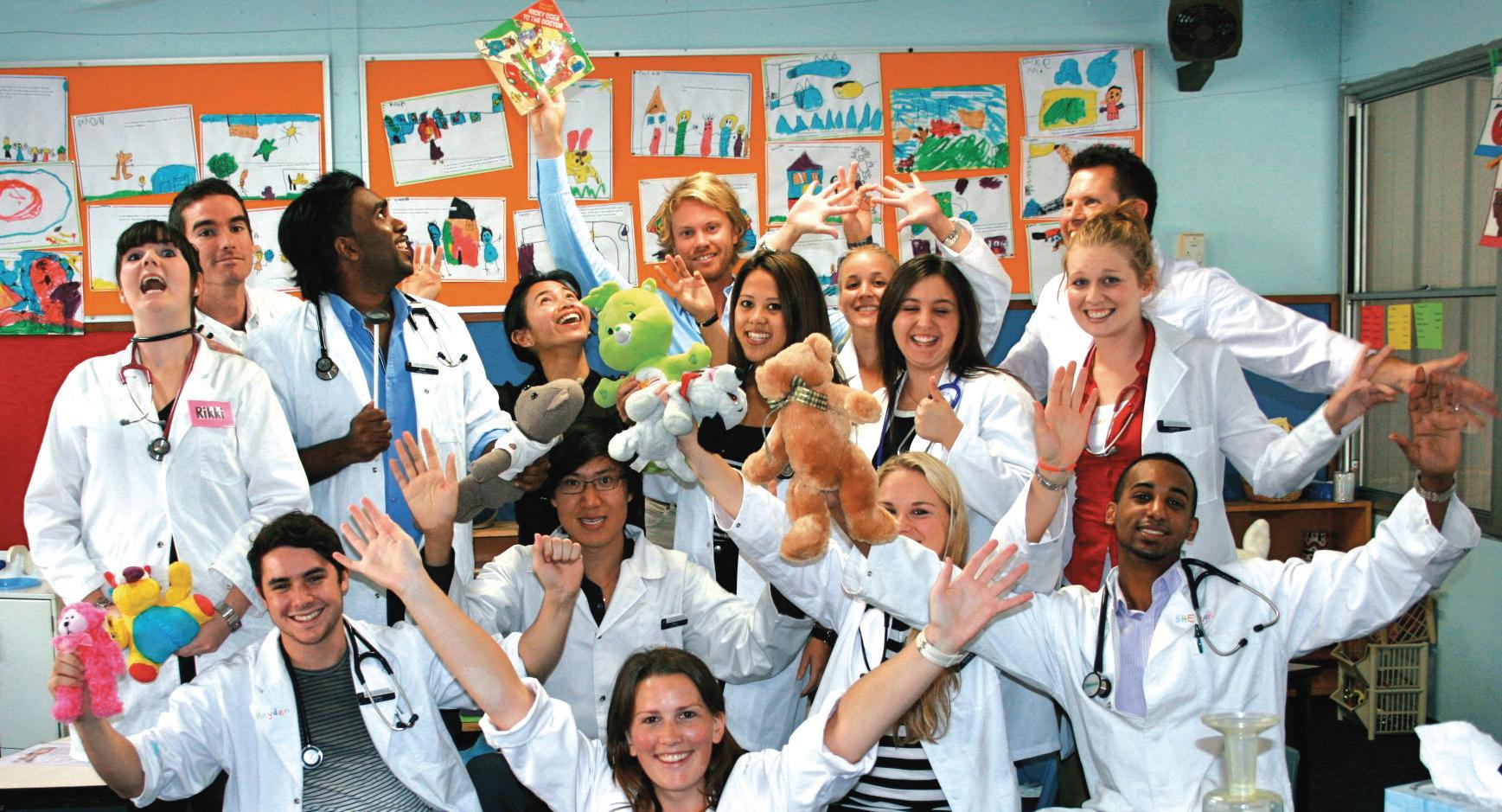
MUCH-LOVED teddy bears are helping medicine students reduce the fear and anxiety often associated with a visit to the doctor for primary school children.
The Teddy Bear Hospital (TBH) is an initiative of the Medical Students’ Association of Notre Dame (MSAND) and gives first and second year students valuable paediatric training while assisting children in becoming more comfortable with a visit to the doctor.
Maryville Downs, Lower Chittering, WA IS NOW TAKING ENROLMENTS
This is an independent primary school, teaching the Catholic Faith. It will open in February 2012 with classes Kindergarten to Year 3, expanding to Year 6 over the next three years. The college will aim for excellence in all academic subjects, character formation with our virtues programme, spirituality, the arts and PE. For information, contact Doris on 9317 4019, email marydoris@westnet.com.au or Fr Paul on 9571-1839.



Second year medicine students Jennifer Melvin, Rikki Warren and Kimberley McDonough created TBH as part of a preclinical social justice assignment. The programme is run primarily in pre-primary classrooms with students, who play the role of a worried parent, bringing “sick” teddy bears to a simulated hospital for treatment by one of 65 trained “Teddy Bear Doctors” from Notre Dame. Children move through four
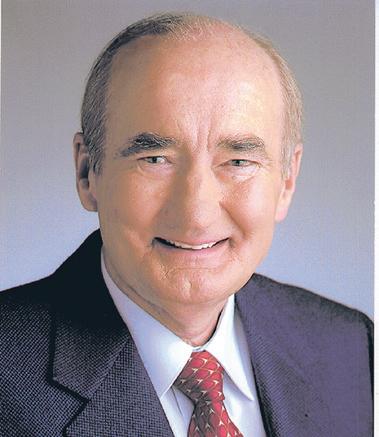
stations including a waiting room, doctor’s consultation room; treatment room and activities table. Stations allow children to interact with safe medical equipment in a non-threatening environment. At the end of the visit, each child and “healed” teddy bear leave TBH with a pawscription of fruit, greater knowledge of healthy eating habits, importance of outdoor activities and a big smile. “The students always leave with a smile
on their faces”, Miss Melvin said. “Obviously, in the early years of a child’s life, they can be presented with a negative impression of the doctor’s surgery, often associating it with pain and discomfort.
“This programme can hopefully make children understand that doctors are there to help them get better.”
For more information about the Teddy Bear Hospital, email tbh@ msand.org.au.
BEYOND the law-and-order media hype are the “forgotten families” of victims and offenders, the theme of this year’s ecumenical service for Anti Poverty Week 2011.
The service will be at St Mary’s Cathedral on Tuesday, 18 October at 1pm. The keynote speaker will be the dean of the cathedral, Mgr Michael Keating
The organiser, Terry Quinn, is the executive officer for the state’s Catholic Social Justice Council.
He is a self-confessed “bleeding heart”. “At least I’ve got a heart left to bleed with,” he said.
FOR THE youth group of St Luke’s parish in Woodvale, last month’s annual sleep-out was an opportunity to reflect on the issues of homelessness and poverty in WA.
More than 20 young people stayed overnight in the parish hall, sharing a small meal of soup and bread and taking part in discussion and writing groups.
Organisers Justine Smith and Suzie Martins said it was one of the more meaningful events in the youth group calendar.
“I felt that last year had a bigger turnout, but the enthusiasm was certainly here this year too,” Ms Smith said.
“The kids seemed very interested by the information that we had to offer, and they got right into the activities. I think this will encourage them to be more thoughtful about the issue in real life.
“I think that there is a lot of community support in WA on the issue of homelessness, yet the youth of Perth remain rather sheltered from the idea. So it was good to see so
Mr Quinn chose the theme “Forgotten Families” to build on this year’s social justice statement from the Australian Catholic Bishops Conference, Building Bridges, Not Walls: Prisons and the justice system
So many complex issues, he said, were dumbed down by the mainstream news media. “It’s so easy to emphasis the exciting copy – a good juicy crime or a judge that’s terribly lenient one time in 20.
“It’s all written up not realising that people who do this kind of stuff were often abused themselves.”.
He said the bishops’ social justice statement was very worthwhile
and every Catholic should read it, though it could have gone further in recognising the suffering of victims and their families as well of that of the innocent family members of offenders.
Mr Quinn said he had seen the suffering of victims’ families closeup, including that of a family whose daughter was murdered.
“It’s on both sides that we need to give plenty of thought to,” he said.
It was easy to ignore the issues because prisons were largely “out of sight and out of mind”.
He said he knew of prisoners who were not visited by family or friends because they were too far
away. This was hard on both prisoners and their families.
“The family haven’t committed any crime. The kids haven’t done anything wrong but they are also affected,” Mr Quinn said.
A chaplain to Wooroloo Prison, Mr Quinn said this year’s statement featured many powerful, first-hand accounts and reflections from prison chaplains at the coal-face.
“It’s not just a flash in the pan for one Sunday. It’s a statement that needs going over,” he said.
The “Forgotten Families” service is one of many events across the country to highlight Anti Poverty Week from16 to 22 October.
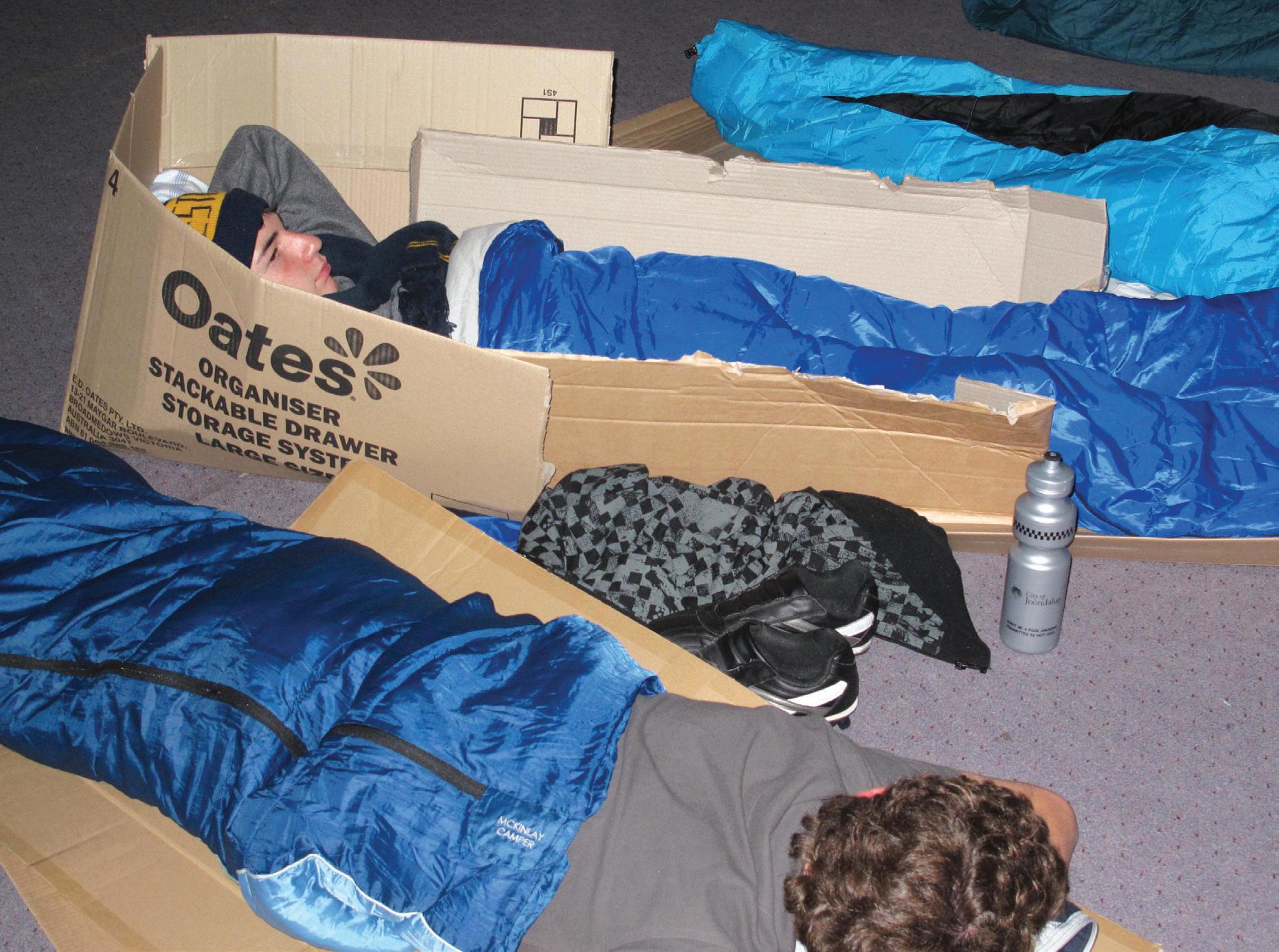
many open minds on the night.”
Organising the sleep-out was a group effort, with families and sponsors providing food, money and positive feedback for the event.
“It’s a very big event to organise, but the youth group coordinators
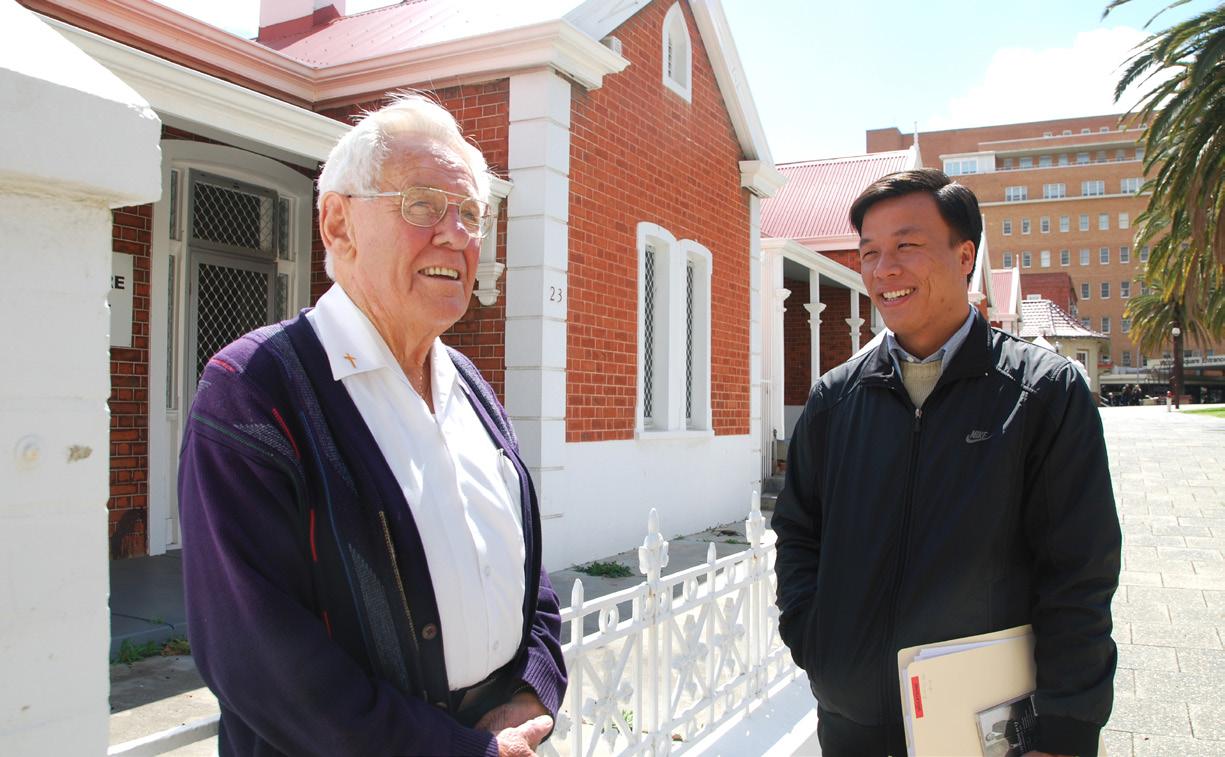

Please contact: Sean on 0439 7200 66
Continued from Page 1
complainant to take the matter to the police or other civil authorities, and that it has been carefully explained that any Church process will not have the same power to investigate the matter as the courts. “Aware of these limitations, I still state that I do not wish to take my complaint to the police or other civil authority at this time and I ask that a Church process be established,” it concludes.
An Adelaide archdiocesan statement on September 11 said Archbishop Hepworth had decided only in February to formalise his complaint. Since then “the matter has progressed in an orderly way”.
In a follow-up statement, Archbishop Wilson said his vicargeneral, Mgr David Cappo, had on multiple occasions since 2007 urged Archbishop Hepworth to give his permission to proceed with an investigation. “On each occasion Archbishop Hepworth declined, indicating that he was not in a proper emotional state to deal with an investigation. Sensitive as we must be to the needs of complainants, we adhered to his request.”
Archbishop Hepworth said he was offered a statement to sign conforming to Section 37.3 of the Towards Healing guidelines in early 2010, but in the context of Monsignor Cappo proposing a face-to-face meeting to confront the priest he accused of raping him. He refused to sign, he said, because he objected to that course of action.
all contributed ideas for the night,” Ms Smith said. Ms Martins said she felt that young people were aware of social issues like homelessness, even if they didn’t often get a chance to talk about them.
“Although kids may not talk about these subjects with their peers, they do think about them,” she said. “We got a lot of comments during the activities about how we should help out more with homeless people and those living in poverty.
life as a priestBy roBert hiini
WHY have men walked away from lucrative careers to join St Charles Seminary?
With the seminary’s priesthood enquiry day coming up on 16 October, seminary spiritual director, Fr John O’Reilly remembered something someone said to him when he was 22.
“You know you won’t be happy until you become a priest,” he said.
“If God plants a seed there that niggles then that’s what drives men to the priestly vocation.
“It’s a calling to do something a bit different.”
Among its seminarians, St Charles has a dentist, a pharmacist and an engineer, but one need not be a high-flying professional to find out if the priesthood’s for you, Fr John said. He knew from personal experience.
In the early 1950s, Fr John was working for the railways in Merredin when he finally made the decision to explore his vocation. He was lodging with a nonchurch-going couple, when the woman of the house said she had an inkling he was meant to be a priest.
No one had ever asked him if he wanted to be a priest, a situation he said he had tried to reverse in his dealings with other men.
“You’ve got to approach men and ask. Often men think, ‘If I was good enough, someone would have asked me,’ and no one in the church ever asked me,” Fr John said.
Ordained at 30, Fr John has been a priest now for 52 years.
St Charles has received dozens of overseas applications – from Europe and Asia – from men who have been attracted through the seminary’s website. While flattering, Fr John said the seminary’s immediate focus was on helping local men discern their vocation.
St Charles has 15 seminarians in Perth – 12 at the seminary in Guildford and three on placement at the parishes of Cloverdale, Ellendale and Subiaco. Four other seminarians are studying in Rome.
Most are aged in their mid-20s to mid-30s. Their youngest seminarian is in his late teens while the oldest seminarian is 62.
The St Charles’s enquiry day starts at 9.30am on October 16, with Mass scheduled for 11.30am followed by lunch.
He told The Record, that about six weeks ago, when he informed the vicar-general of the results of his complaint to the Melbourne archdiocese, Monsignor Cappo told him Adelaide’s investigation was still at a “preliminary stage”.
Where the investigation is now remains unclear. A spokeswoman for the archdiocese confirmed the accused priest was informed in March of the complaint against him, which he had denied.
Under the Towards Healing guidelines, in cases where the facts of a complaint are disputed the diocese’s director of professional standards shall appoint one or two professional assessors “as soon as is practicable” to investigate.
In its September 11 statement, the Adelaide archdiocese said: “The investigation into the allegations is proceeding and is in its closing stages. Whilst evidence is still being gathered, prominent Adelaide barrister Michael Abbott QC has been retained to examine the evidence once it has been collated.”
In a statement three days later Archbishop Wilson said: “The process is well under way and we are currently waiting to speak with the priest accused, to obtain his detailed response to the allegations.”
He said the process was subject to Archbishop Hepworth supplying a list of people who might be able to assist in investigations. He would then have Mr Abbott “become involved in the process and assess all the evidence and documentation and give me his opinion in law”.
A spokeswoman for the Adelaide archdiocese was unable to elaborate on how archdiocesan statements squared with the process laid down in the Towards Healing guidelines, or how the archdiocese’s investigation could be “well under way” and “in its closing stages” when it did not yet appear to have reached the assessment stage. She said she would need to consult the archdio-
World Youth Day Madrid was an most amazing, life-changing experience. Words don’t even come close in describing the lessons learnt and the journey experienced in a single week.
It was a week full of youth, laughter, singing, dancing, culture and the strength and courage shared by millions whom are joined together by one faith. You can hear so many stories, see so many pictures, watch so many videos of this amazing event; but nothing comes close to actually experiencing it for yourself.
The joyful positive energy that flew through the centre of Madrid could turn any frown upside down. Many might have heard about the organised protest that occurred on our second day in Madrid. Being in the centre of it all was a real eye-opener.
You can hear of all the things that some people have to say about what we believe, but when you witness something like we did in Spain. Reality hits you hard in the heart. Yelling back seemed pointless yet “viva il papa” still rang through the dark mob, just as it did the previous day.
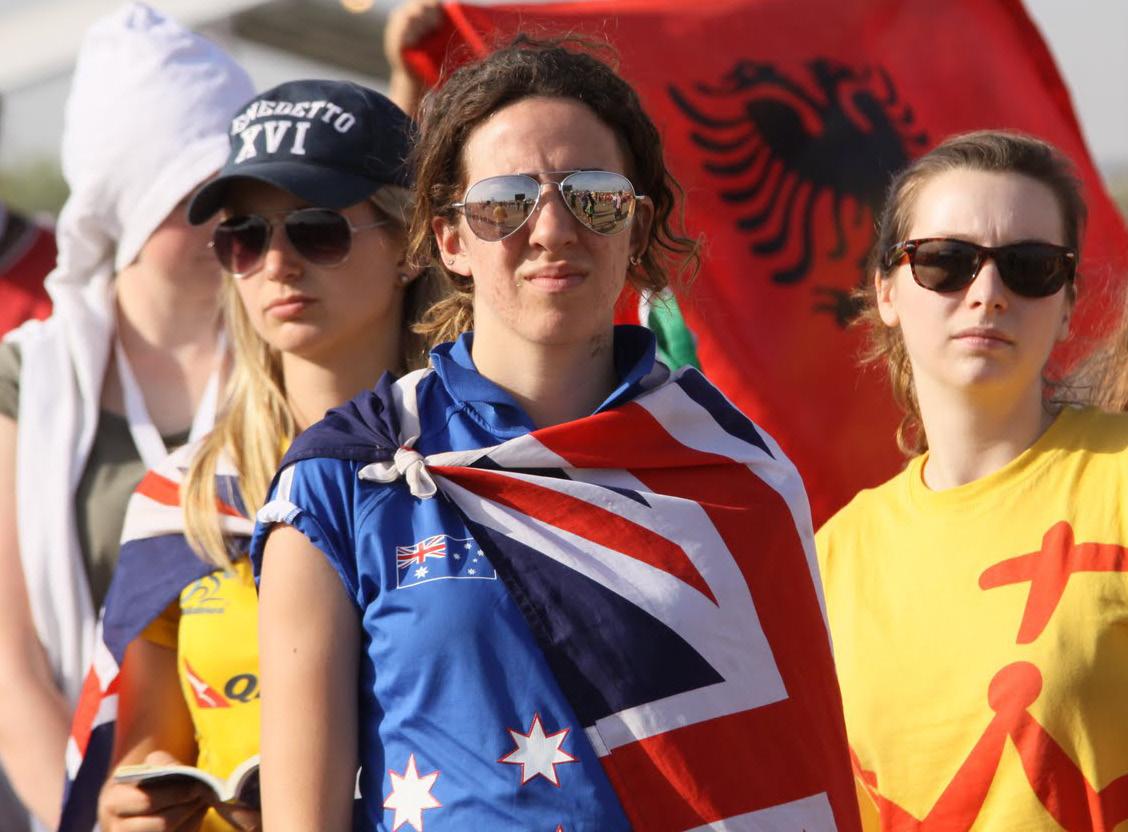
Although we could not understand what the protesters were yelling, we understood what they were saying through their facial expressions of anger and
gestures of frustration. Praying was our only response...and prayers were needed more than ever. And so we continue to pray for Spain and the rest of our
BISHOP Donald Sproxton was doing more than enjoying the countryside on his recent pilgrimage to Spain, announcing plans for a pilgrimage in 2014 to mark the bicentenary of Bishop Rosendo Salvado’s birth.
Opening the post-World Youth Day gathering last Sunday, Bishop Sproxton said he had spoken to the bishop of Tui-Vigo in Spain,
where Bishop Salvado had lived and worked before departing for Western Australia and founding the monastery town of New Norcia Pilgrims from Spain will visit New Norcia before returning with West Australian pilgrims to Bishop Salvado’s homeland.
Bishop Sproxton and 90 other West Australian pilgrims visited Tui-Vigo for its Days in the Diocese
event prior to World Youth Day.
“The bishop and the people showed us around the town and were so very happy to have us join them,” Bishop Sproxton said.
“They were amazed young people were so interested to come all that way to see important places in their Catholic history.”
Perth pilgrims were returning the favour. Spanish pilgrims from
Continued from Page 1
“Holiness is about taking what we have and making the most out of it. And that includes our relationship with God.”
Fr Rob was backed by Perth musicians, performing on the night after just one rehersal together.
Concurring with two generations of World Youth Day pilgrims, speakers at the Sunday Sesh said that WYD had presented them with a number of privations while ultimately drawing them closer to God.
“WYD was many profound moments tied together by many infrequent hospital visits, dehydration, food poisoning and so much more,” Marcus Beard said.
“But I loved every sweaty moment of it and I just can’t wait for the next one in Brazil in 2013.
“I encourage you to go. I don’t know what you’ll get out of it but I know that it’ll rock you like a hurricane,” he said.
the town stopped over in Perth in 2008, on their way to WYD in Sydney. “Maybe this will be the first step to his cause for sainthood,” Bishop Sproxton said. “It’s one of those things we have been hoping for a long time ... the beginning of that incredible journey to have him declared a saint – a local saint, a West Australian saint”.
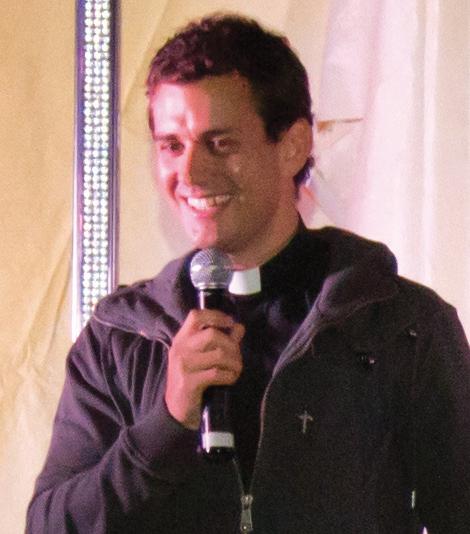 By roBert hiini
By roBert hiini
IT’S NOT about performance, it’s about worship, Catholic recording artist Fr Robert Galea told music ministers at a special music workshop on Saturday, 17 September.
The singer songwriter priest was the key speaker in a three hour workshop delivered to 25 music ministers from parishes and youth organisation throughout Perth.
“Worship is not just the music we sing ... it’s not just something we do at mass – it’s a lifestyle,” Fr Galea said.
“God is not interested in perfor-

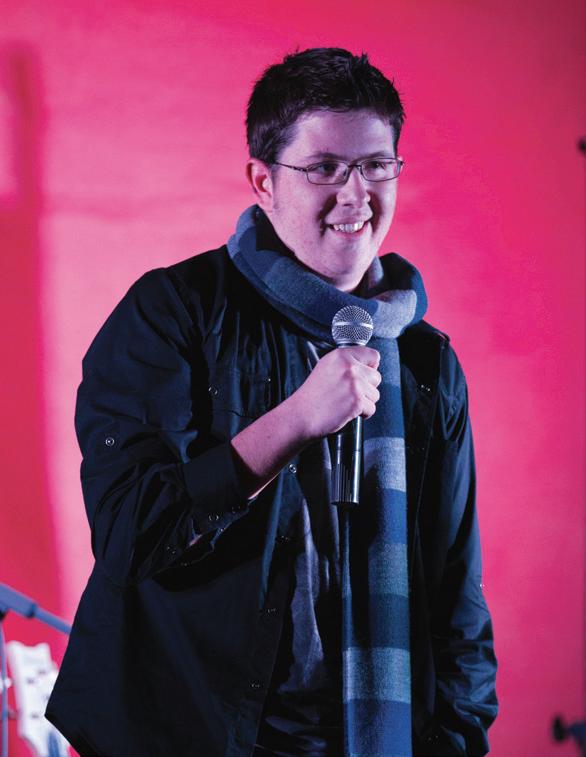
mances ... he wants lead worshippers: people who already worship through their life and through their lifestyle and then, when they are brought on to the stage, the worship they are already experiencing becomes manifest.”
There is nothing wrong with an initial desire to perform, the priest said, but music ministers who don’t transition into playing for God’s sake remain spiritual infants.
“If you are not living a life of worship that glorifies that audience of one ... even if your eyes are closed and tears are coming down your face; even if you are giving everyone
gooseflesh, in all probability you are not worshipping.”
Conversely, the witness of authentic worship in music can make people “raw”, cutting through all their barriers to God, he said.
The 29-year-old released his fourth album, Reach Out earlier this year and has, in the past, recorded with local pop success, Guy Sebastian and Australian opera singer, Amelia Farrugia.
Growing up in the Catholic charismatic renewal, Fr Galea came to Australia five years ago to study for the priesthood. He was ordained a priest in his
world. All in all, WYD was the day that was a week of a lifetime, one I am still trying to absorb! What a trip, what a journey! I’m so pumped for Rio! Pipe

Sunday
native Malta in December last year, but is currently on a missionary stint to country Victoria, working as an assistant priest at St Brendans’ in Sheparton.
He is content to spend much more time in his room playing guitar “with God” than leading worship through music, he said; something that enables him to “truly worship” when he performs, often to thousands, on stage.
He urged particpants to strengthen their own prayer lives, not to obsess about their own unworthiness but to focus instead on their God-given capacity to pray.
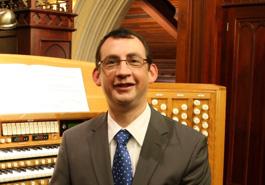
ANNIE Feeney Partlon was a devoted and much-loved wife, mother and grandmother whose simple, sweet, selfless, uncelebrated life exemplified the virtues of her generation. One of seven children of Irish Catholic immigrants, she never wrote a book, founded a political dynasty, or starred in her own reality TV show, but faced adversity with wisdom, faith, courage and humour.
The third child of Dominick and Bridget (‘Delia’) Feeney, she came to Western Australia with her parents and four small brothers aboard the Ormonde in September 1921. The family had been sponsored by Delia’s sister, Sarah Ward, who ran ‘Our Boys’ tearooms in South Fremantle, but the Feeneys too were to become part of the port city’s commercial history when they opened a fish and chip shop at 32 Victoria Avenue (later Stirling Highway). For nearly 30 years (1921-48), through the Great Depression and the Second World War, Feeney’s endured, becoming a familiar landmark and a North Fremantle institution.
Young Annie was the face and fulcrum of Feeney’s. As the eldest girl, she was expected to ‘help out’ and at the age of nine was serving in the shop, although she was so small she had to stand on an orange crate to see over the counter. By 14, she was working full time, much to her regret as she enjoyed school and was an apt pupil with a talent for mathematics. She went, first, to the John Street primary school and, later, St Joseph’s, Fremantle, founded by the Sisters of St Joseph of the Apparition, one of whom pleaded unsuccessfully with her parents to allow their daughter to complete her tuition.
A child of the Depression, she
Obituary
Annie Feeney Partlon
Born: Co Sligo, Ireland, 1 April 1917. Entered eternal life: 5 May 2011 aged 94.
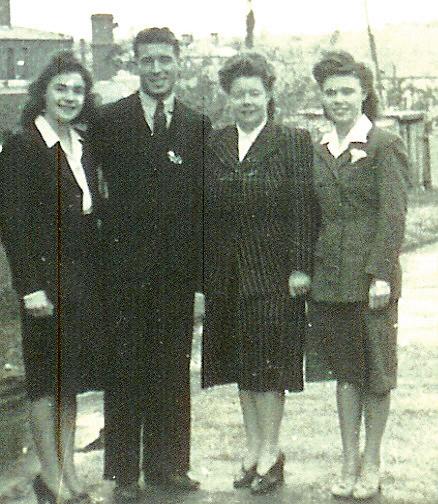
learnt to cope with disappointment stoically and pragmatically. Denied a formal education, she found solace in music, taking piano lessons from the glamorous Miss DeGrancy while assuming greater responsibility in the shop, now located in roomier premises across the road at 61 Victoria Ave (later Stirling Highway). Twenty-one when the Second World War broke out, with a mane of chestnut hair and a
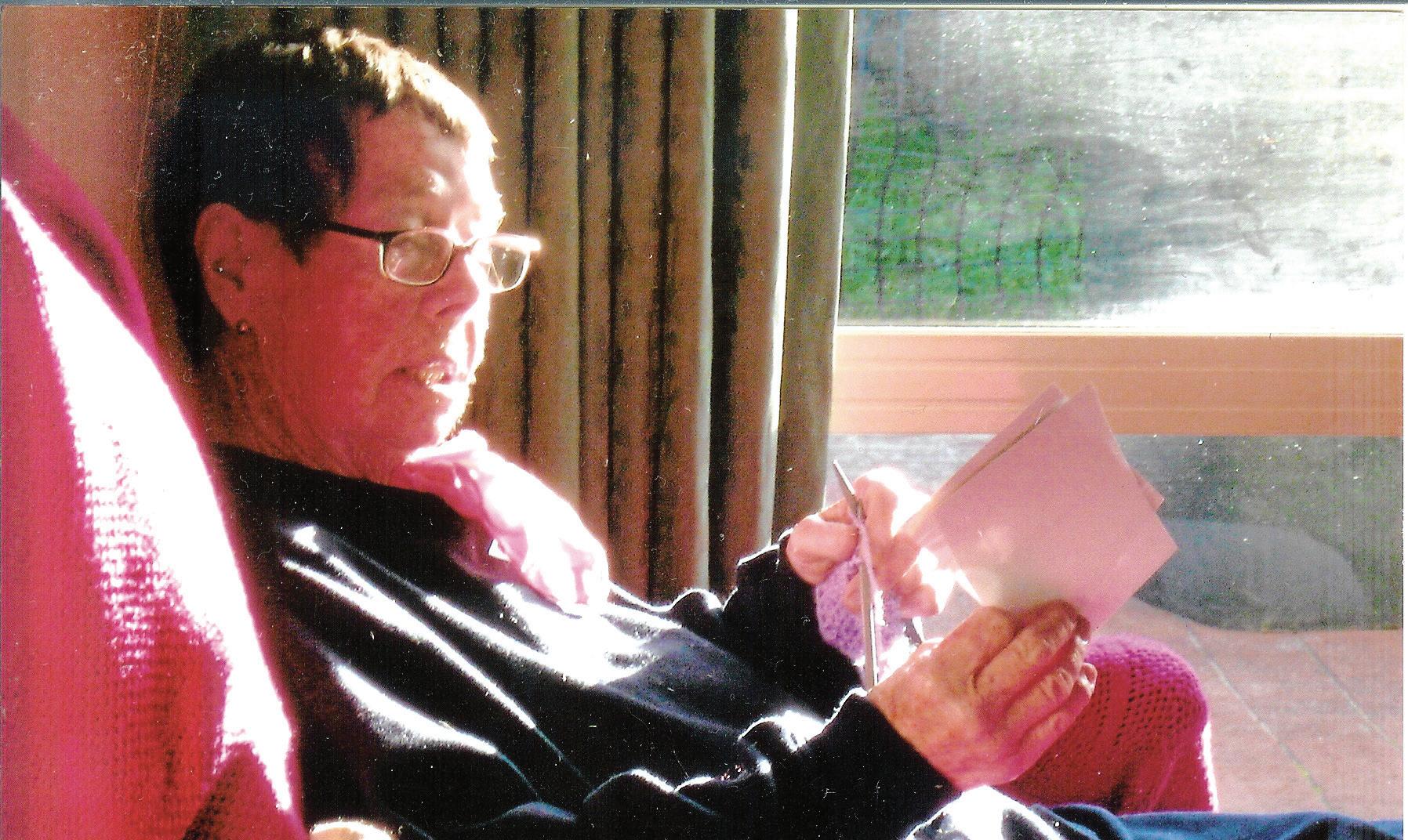
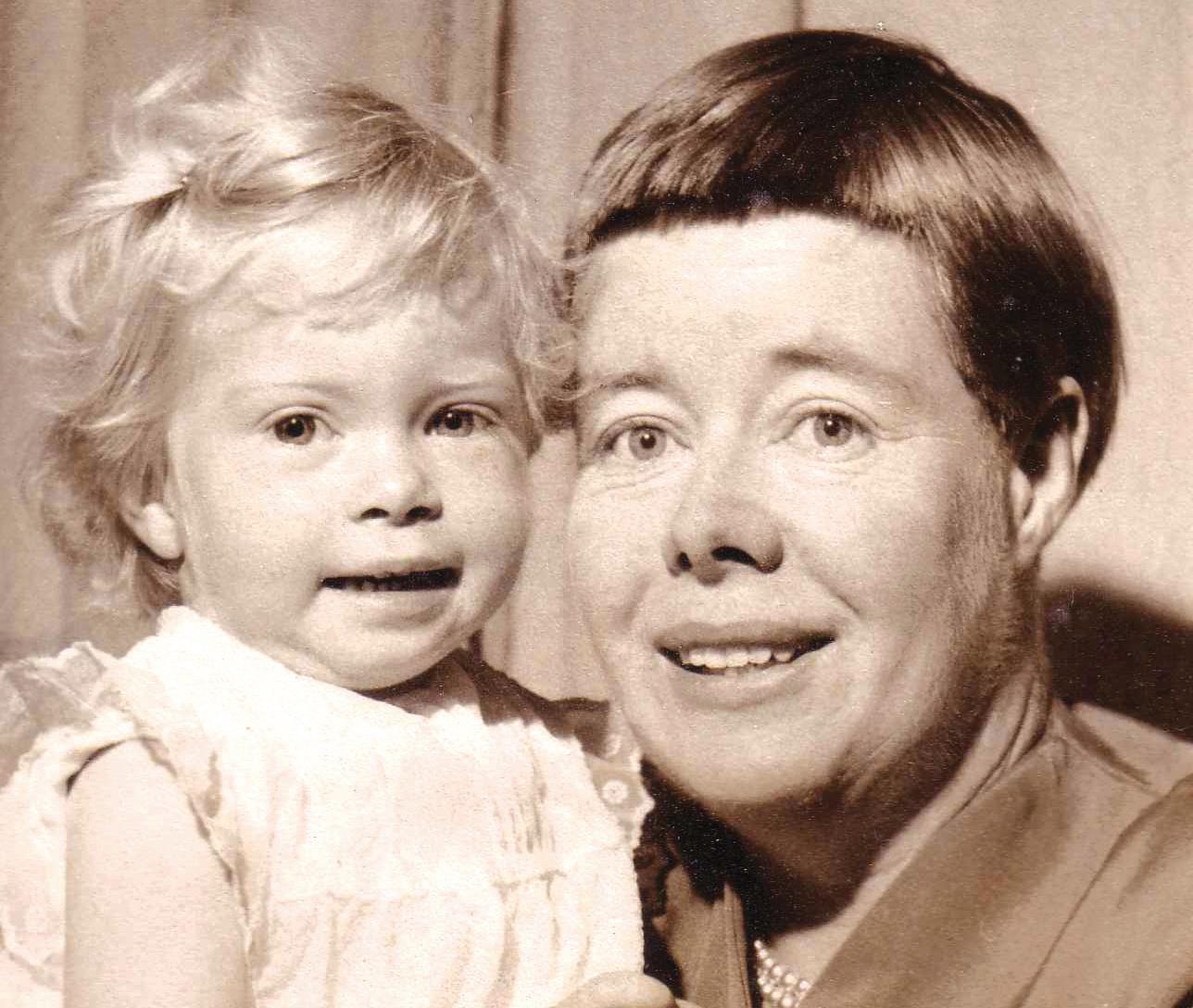
bought premises on Preston Point Road for the purpose, but her plans were stymied by a Fremantle councillor who feared a revival of her
block in the newly gazetted suburb of Bicton where they built a modest brick-and-tile bungalow and raised three children, Anne, Christine and
“Honest, hardworking and resourceful, she was a modest, unassuming woman whose friendly nature, youthful outlook and sense of fun endeared her to all.”
temper to match, she was dubbed ‘Red’ by the Yanks who flocked to Feeney’s for a generous sixpenny serve of fish and chips (dhufish was 9d) and to meet the local girls. As her parents neared retirement, and Feeney’s closed, she began work at Symes’ Grocers in Mosman Park, effectively managing the business, and subsequently at Woolworth’s in Fremantle. She dreamed of opening her own gift shop one day and
parents’ ‘noxious trade’. Around this time she met her future husband, Bernie Partlon. They were married on 2 February 1956 at St Anne’s, North Fremantle, by Fr, later Monsignor, Sean O’Shea, then a giggling young curate who interrupted Benediction to celebrate his first wedding. Temporarily domiciled at Thompson Rd in the shadow of the old Dingo flour mills, they paid £500 for a quarter-acre
John.
Born 1 April 1917 at Carricknahorna West, the family farm in Boyle, County Sligo, the Feeneys left for Australia soon after, travelling under the name Cawley in a last desperate bid for freedom. The more ambiguous patronymic had been adopted to conceal their Catholic origins while living in England and the Protestant north of Ireland, so parlous were the times
Clockwise from top:
Annie Feeney Partlon c 2009.
Annie Feeney Partlon and daughter Anne, c 1960.
Siblings Patricia, Tom, Annie and Peggy Feeney in North Fremantle,
that they seldom stayed long in one place. This had been the pattern of their lives since 1913 when childhood sweethearts Dom and Delia eloped to the Lancastrian mill town of Darwen.
Defying Dom’s father, who opposed the match, the rash pair settled in Liverpool where sons Jim and Jack were born. But the worsening economy, introduction of conscription and suspicion of the Irish in England after the 1916 Easter Rising, drove them home for Annie’s birth.
As fresh hostilities flared in the south, they moved north to Bangor where Dom found work as a publican but this dream, too, proved illusory. Once their secret leaked out, they came under attack, barely escaping with their lives after loyalist (Protestant) agitators hurled an axe at their front door.
Happily for their many descendants, they survived to tell the tale, finding in WA the home they had sought in vain.
Generous to a fault, they never made anything from the shop but won the affection and esteem of the close-knit North Fremantle community. All four sons served with the Australian armed forces during WWII, and the eldest, Jim, was for 16 years a North Fremantle councillor. Feeney Street is named after him.
Annie’s character was shaped by these early experiences. Honest, hardworking and resourceful, she was a modest, unassuming woman whose friendly nature, youthful outlook and sense of fun endeared her to all who knew her.
She is mourned by her children, son-in-law Dan, and grandchildren, Christine, Catherine, Jesse and Holly.
Contributed by Anne Partlon
“I WISH to thank Helen’s family for asking me to be part of the celebration of Helen’s life and sorrow of her passing. I had the pleasure of meeting Helen in 1994 at her first home in Blencowe St, Leederville to which she had moved only recently. Helen came to Catholic care, as it was then, from a loving, tight-knit family of her much loved mother, Therese and siblings, Paul, Mark, Brenda and Kevin. Helen also spoke fondly of her dear sister, Dawn, who had passed.
I am proud to say Helen and I formed a close bond and friendship which extended to my family. I know I am not the only one who forged such strong bonds and friendship. Her ability to accept and love the many people who passed through her life and homes is proof of this wonderful attribute that endeared Helen to us all.
Helen’s ability to show unconditional love, forgiveness for any wrongdoing towards her, wicked sense of humour and love of life and all it had to offer was what made Helen the lady we know and love. Helen never asked for much; security, comfort and happiness
was all she needed. We will all, today and for time to come, reflect on Helen and how she touched us; sentimental and humorous tales will be told. I would like to relate some with you now. Because Helen had an intellectual disability, many people, including us, thought we could manage Helen’s life so she could ‘reach her full potential’ and lead a productive life. Let me say to you, Helen had other ideas. She knew exactly what she wanted out of her life. Take work, for example: Helen had two jobs when I met her, one at Hungry Jacks and one in a bakery. I believe Helen was telling us in her own way that slicing those pickles all day was not rewarding enough for her. She would trudge along to work after being persuaded out of bed, which she loved most days. Then there were those days when she decided catching a train from Midland to Perth all day until she was due to come home from work was much more fun!
After some more attempts at working, Helen found a place she really enjoyed, The Heights Recreation Centre. She could enjoy others’ company, community access
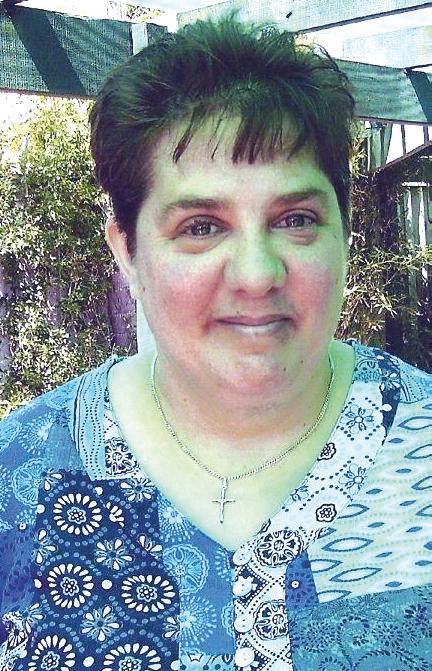
and being creative and arty. She must have thought to herself, “at last!” Helen enjoyed many holidays, some of them overseas, over the years with other friends and staff. I am sure she treasured those times she had with you.
Helen did not say a lot, choosing only to speak when she had something to say. Wouldn’t we all like to know people like that! When Helen spoke, she meant it. She was also very good at keeping secrets.
Recently, I was on annual leave and Helen was in hospital. I had told her I was going away but would come and see her again before I left. My mobile rang one day and when I answered it, Helen was on the line. I was stunned she had rung; she had gone to the nurses’ desk and asked them to ring me. I nearly cried as I felt so honoured and touched. Of course, I was there the next day along with Jodie; we had so many giggles. Jane and Elaine visited one day. They showered and groomed Helen and also had lots of laughs and fun. They both decided they needed a refresher on preparation of and completion of giving someone a shower. They forgot towels and who knows what else. Helen thought it was a hoot! During her hospital stays, staff would visit her every day. Often, she would require assistance from staff to shower her. The staff were under the impression the nurses did not have time
to shower her or she didn’t require assistance. “No”, Helen would say to the nurses, she wanted “her staff” to shower her.
I would like to make special mention of Carol, Rachel, Lauren, Sarah, Selina, Marie, Jo, Sandy and the regular casuals for their dedication to and concern for Helen’s wellbeing during the last three months. One would visit Helen in hospital and one would stay with other service recipients, always going beyond the requirements of their role. Why? Because they loved Helen. Helen also had a lot of love to give her friend, Donald, and would ensure he was ok. If she thought he was being ‘naughty’ she would ‘rouse’ on him. We need you to keep an eye on him, Helen. He misses you and has taken over your favourite chair.
Thank you for allowing me to share this with you. Rest in peace with your Mum and Dawn, our beautiful angel. You will be forever in our thoughts and hearts. If I ever feel a gentle touch on the end of my nose, I will know you are with me.”
Read by Judy Macdonald at Helen’s funeral.
VATICAN CITY - The Vatican has given traditionalist Society of St Pius X a formal “doctrinal preamble” listing several principles they must agree with in order to move toward full reconciliation with the Church.
Prefect of the Congregation for the Doctrine of the Faith, Cardinal William Levada, gave the statement to the head of the society, Bishop Bernard Fellay, at a meeting at the Vatican. Although the Vatican did not give the society a deadline, in order to move toward full reconciliation, leaders are expected to study
BOGOTA - The Catholic Church in Colombia is actively involved in efforts to bring peace between the government and leftist rebels who have been engaged in a half century-long war, said Father Juan Molina, director of the US bishops’ Office for the Church in Latin America, who recently visited the predominantly Catholic nation. He said he was impressed by Church involvement in efforts to reach a settlement between warring parties. The rebels claimed they are defending the interests of the country’s poor but finance their campaign through the drug trade, kidnapping and extortion. They also have been accused of widespread human rights abuses.
The Colombian government has been criticised for favouring a military solution over negotiations while also committing human rights abuses. It has argued that its actions are aimed at maintaining order and stability to protect the rights of citizens and private companies.
Church leaders have served as intermediaries between the government and rebels seeking to install a Marxist government. However, Colombia’s last two presidents have refused to talk to the guerrillas, whom they call terrorists. While no talks among factions have occurred recently, Fr Molina said he learned the Church continues to work on projects that hopefully will lead to a lasting peace in the future. One such programme he visited works to return stolen lands to peasants.
Fr Molina also said that Colombia’s church is not losing relevance.
and sign the preamble “within a few months,” said Jesuit Father Federico Lombardi, Vatican spokesman.
Fr Lombardi said, “Today the most likely solution would be a personal prelature”, which is a Church jurisdiction without geographical boundaries designed to carry out particular pastoral initiatives. It is headed by a prelate, who is appointed by the Pope; currently the Church’s only personal prelature is Opus Dei.
The document given to Bishop Fellay to sign “states some doctrinal principles and criteria for the interpretation of Catholic doctrine necessary to guarantee fidelity” to the
formal teaching of the Church, said a statement issued by the Vatican after the meeting. At the same time, the statement said, the preamble leaves room for “legitimate discussion” about “individual expressions or formulations present in the documents of the Second Vatican Council and the successive magisterium” of the popes who came after the council.
Fr Lombardi would not respond to questions about specific Church teachings and developments listed in the preamble, but said Church tradition always has held there are varying degrees of Church teaching; some require an absolute assent
while others are open to interpretation. Bishop Fellay later said the meeting was conducted “with great courtesy and equally great candour.” He said he would study the document and “consult with those who are chiefly responsible for the Society of St Pius X, because in such an important matter I have promised my confreres not to make a decision without consulting them first.”
The Vatican talks with the society were launched in late 2009 in an effort by Pope Benedict XVI to repair a 21-year break. The Pope said full communion for the group’s members would depend on “true
recognition of the magisterium and authority of the Pope and the Second Vatican Council.”
The Vatican statement did not mention any of the specific areas where Bishop Fellay’s group has said the Catholic Church and popes since the Second Vatican Council had broken with true Catholic tradition. They object to the reform of the Mass, to much of the Church’s work in ecumenical and interreligious dialogue, and to the council’s stand on religious freedom.
Bishop Fellay said the dialogue with the Vatican is not a search for compromise but “a question of faith.” CNS
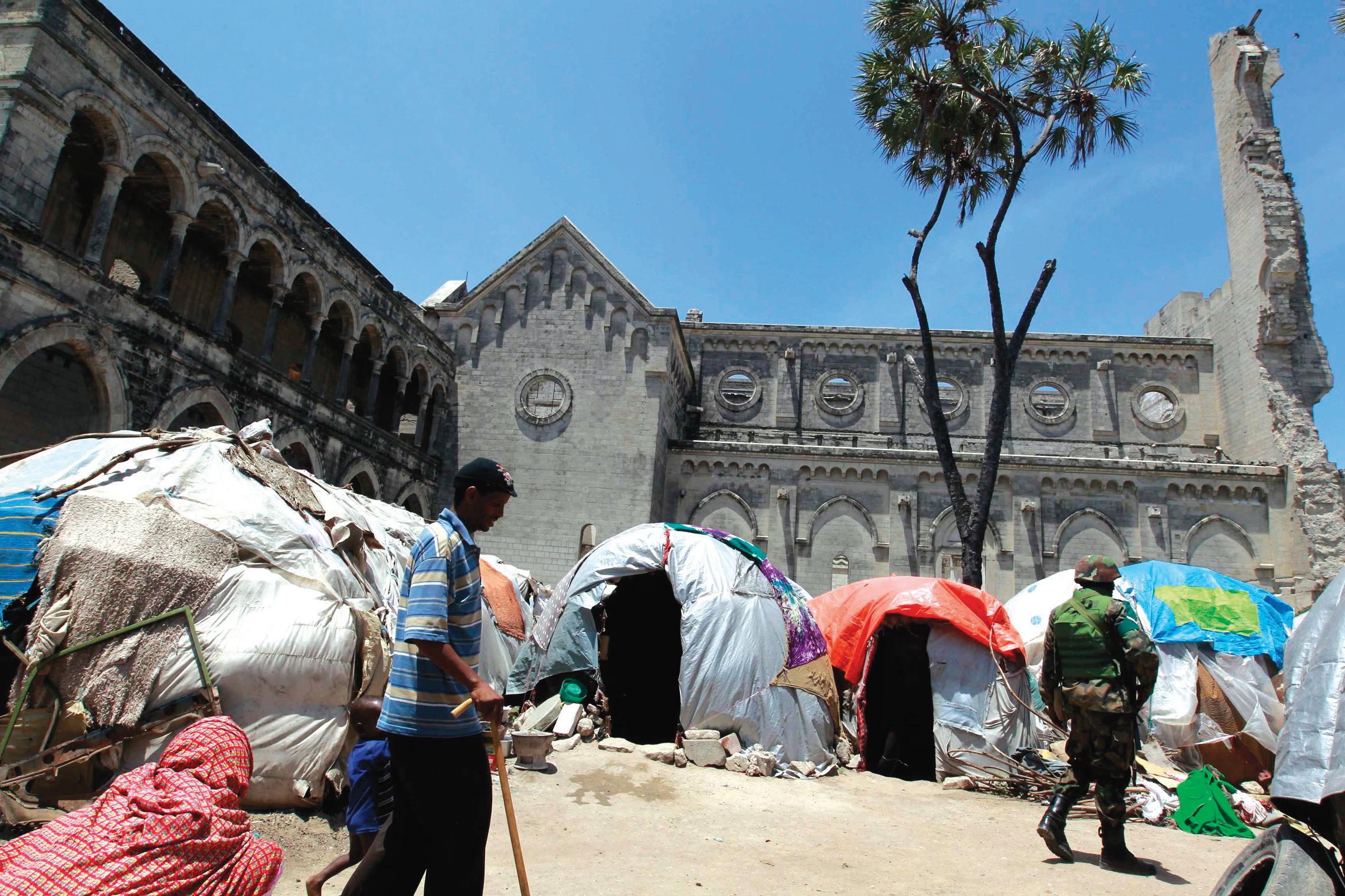
NAIROBI, Kenya - Djibouti Bishop Giorgio Bertin, who oversees Catholics in neighbouring Somalia, said he is happy the ruins of Mogadishu’s only Catholic cathedral are housing hundreds of displaced Somalis.
“In Mogadishu there are hundreds of camps for displaced people. The cathedral area is one of them,” the Bishop said. “I think
that at least 300 could easily fit in, but I have no real figures.”
The UN officially declared a famine in parts of Somalia, including the internally displaced communities in Mogadishu, the Somali capital. More than 100,000 Somalis poured into the capital searching for food within a twomonth period this summer.
Somalia has had a civil war since 1991, and famine-hit areas are plagued by a lack of security
due to a weak central government and the presence of various political factions that control parts of the country. The instability and resulting violence severely limit delivery of humanitarian assistance. Hundreds of thousands of Somalis have fled to Kenya.
Bishop Bertin said the best solution would be to help the displaced people within Somalia, “but the problem is often that where they are, either they are
unsafe or we cannot reach them.”
In 1989, Italian-born Bishop Pietro Salvatore Colombo of Mogadishu was killed at his cathedral. After the murder, the Vatican eliminated the post and now oversees Somalia through neighbouring Djibouti. “The cathedral has not been used since 1991, when it was ransacked” and set on fire, said Bishop Bertin. “It remained open to anybody and was never locked.” CNS
VATICAN CITY - A bishop must help those in his diocese to recognise gifts the Holy Spirit has given them and place them at the service of the entire Church, Pope Benedict XVI has told new bishops.
Addressing about 120 Latinand Eastern-rite bishops ordained in the past year, the Pope focused on the role of a bishop in educating Catholics to take responsibility for the Church’s life, evaluating and coordinating their gifts in a way that builds up the whole Church.
The Pope met the new bishops at the papal villa near the end of a 10-day course designed to give
them both theoretical and practical information about their role and new relationship to the Vatican, its congregations and councils.
Auxiliary Bishop Christopher Coyne of Indianapolis posted a blog about the workshops and discussions. “Right across the board there is a real concern for the ‘new evangelisation,’ the desire to reach those peoples and families who were at one time Catholic, who no longer practise their faith, and to somehow open to them once more the gift of the Catholic faith,” he said.
The bishops, including 18 from the United States, also spoke about
dealing with a shortage of priests, promoting transparency in diocesan finances and in “priestly behaviour” and working with the Church’s new movements, he said.
The blogging bishop also reported “a great deal of discussion around the new media: How does one use the Internet, texting, Twitter, etc to spread the good news in an authentic and successful manner?”
In his talk to the bishops, Pope Benedict talked about the bishop and unity - both the unity he must maintain with the Pope and other bishops as well as the unity he must safeguard and strengthen in
his diocese. The Pope said World Youth Day in Madrid was a vivid example of many different kinds of Church movements and gifts coming together with the bishops around the Pope, sparking “a vitality that reinforces the work of evangelisation and the presence of the Church in the world.”
As the sign of the unity of the diocese, he said, the bishop has “the task of unifying and harmonising” different gifts of Church members and movements, “promoting reciprocity between the hierarchical priesthood (of the ordained) and the baptismal priesthood” of
all Church members. The bishop must respect and promote the role of the laity, he said, but the Church entrusts to bishops “the pastoral ministry of judging whether charisms are genuine and giving order to their exercise, without extinguishing the Spirit.”
The only way a bishop can fulfill his ministry is by ensuring his own personal growth as a Christian and by modelling his actions on that of Christ, the good shepherd, Pope Benedict said. He told the bishops to make sure they take time for personal prayer, Bible reading, study and rest. CNS
GENEVA - Scientifically, and not just morally, the best way to prevent maternal deaths is to improve medical care offered to pregnant women, not divert resources into promoting contraception and abortion, a Vatican official has said.
The international community had “made insufficient progress in preventing about 350,000 deaths that occur annually during pregnancy and childbirth”, said Archbishop Silvano Tomasi, Vatican observer to United Nations agencies in Geneva.
The Archbishop took part in a UN Human Rights Council discussion on “adopting a human rightsbased approach” to reducing maternal mortality.
He said the Catholic Church agreed that pregnant women, like all women and men, had a right to decent health care, and, he said, the Church had demonstrated that by running hospitals and clinics around the world, including in the poorest areas of the globe.
However, the Archbishop said, the Church strongly disagreed with UN proposals that promoted contraception and abortion as important elements in projects to prevent maternal deaths.
“The World Health Organisation has demonstrated that women in Africa die primarily from five major causes: hypertensive diseases, obstructed labour, haemorrhage, sepsis and infection, and
ROME - True religious freedom allows believers to contribute to political discussions and their beliefs and morals to affect how they engage in public life, said the Vatican’s foreign minister. “No one should confuse or compare marginalisation of religion with the true persecution and killing of Christians in some parts of the world”. Efforts to ban religious expression from public life are still an attack on religious freedom, said Archbishop Mamberti, Vatican secretary and one of several speakers at a meeting on “preventing and responding to hate crime incidents and crimes against Christians” sponsored by the Organisation for Security and Cooperation in Europe which has reported “a growing intolerance of Christians”, including desecration of places of worship, arson and other property damage, and attacks on worshippers and religious leaders.
Archbishop Mamberti said religious freedom cannot be defined as simply freedom of worship, although that is a key element. “Religious freedom also includes the right to preach, educate, convert, contribute to political discourse and participate fully in public activities”, he said.
Russian Orthodox Metropolitan Alfeyev said too many governments, institutions and individuals “use religious diversity as an excuse to exclude signs of Christian civilisation from public and political reality,” as if denying Europe’s Christian roots would make Europeans more welcoming and tolerant of other faiths. In reality, he said, such policies and attitudes teach disrespect for all believers.
For true believers, he said, faith is not something lived only a couple of hours a week in a church, synagogue or mosque. Faith has consequences for the way people live and behave, including publicly, he said.
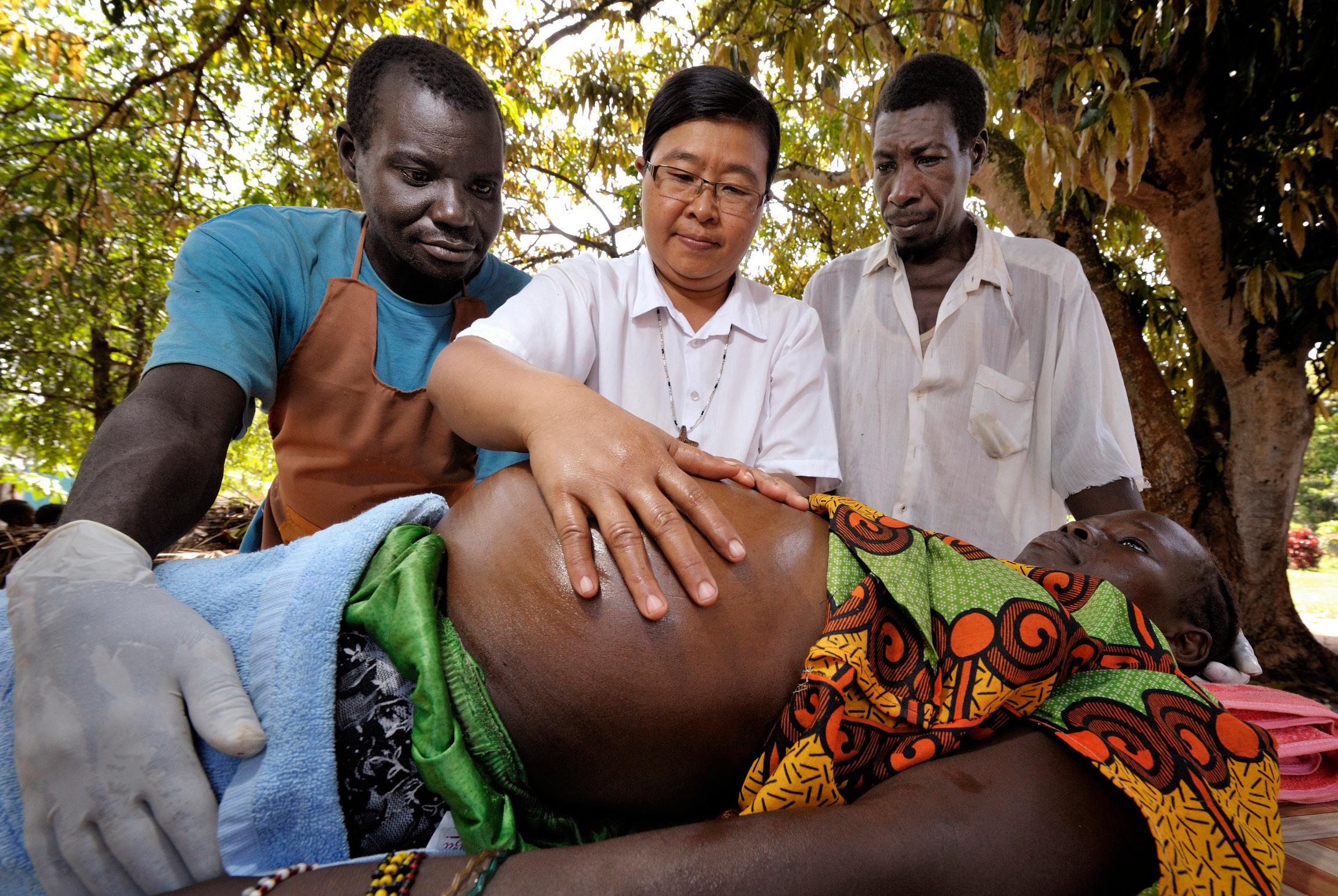
HIV-related diseases,” he said. Addressing those problems requires training and employing skilled midwives and other professionals, ensuring the availability of antibiotics and other medications, and
improving emergency blood supplies, the Archbishop said.
The Vatican found “totally unacceptable any attempts to divert much-needed financial resources from these effective and life-
saving interventions to increase programmes of contraception and abortion, which aim at limiting procreation of new life or at destroying the life of a child,” he said. CNS
GENEVA - Human trafficking is such a lucrative business that as soon as laws are passed to counter the practice, traffickers find new ways to continue the modern-day slave trade, the Vatican’s representative told the UN Human Rights Council.
Archbishop Silvano Tomasi said an estimated three million people fell prey to traffickers each year and trade generated more than $30 billion annually.
International action rallying governments, law enforcement agencies, human rights organisa-
tions, faith groups and people of goodwill were needed to combat trafficking, mostly involving poor women and children, he said.
As the world’s economy had globalised so had the trade in human beings, which “exploits the extreme poverty and vulnerability of many women and minors who try to escape intolerable conditions of misery and violence”.
Lured by the hope of jobs and a better life, they became “bonded to their masters as slaves with passports and personal documents seized and a sense of identity
destroyed,” the archbishop said. Governments had enacted laws to counter human trafficking and many organisations, particularly coalitions of Catholic nuns, were working hard to educate potential victims and rescue those who had fallen into the hands of traffickers.
But more had to be done to eliminate the demand for prostitution and to strengthen a culture where the relationship between men and women is based on mutual “respect and not on merchandising the body”, he said. CNS
WASHINGTON - Father Frank Pavone, national director of Priests for Life, remains a priest in good standing in the Diocese of Amarillo, Texas, according to the diocese’s vicar for clergy. Monsignor Waldow said Bishop Zurek had only suspended Fr Pavone’s ministry because the well-known prolife priest was needed for work in Amarillo.
Bishop Zurek ordered the priest to return to Amarillo and, in a letter to fellow bishops, pointed to “persistent questions and concerns” from clergy and laity about how millions of dollars donated to Priests for Life are used as the reason for suspending Fr Pavone’s ministry.
“He’s here to be obedient to the bishop and try to work with him,” Mgr Waldow said. “He’s going to have assignments and will be put on our payroll and given health care and other benefits like any other priest of the diocese.”
For his part, Fr Pavone said he planned to return to Amarillo from Birmingham where he had been taping programmes for the Eternal Word Television Network for more than a week. He also planned to
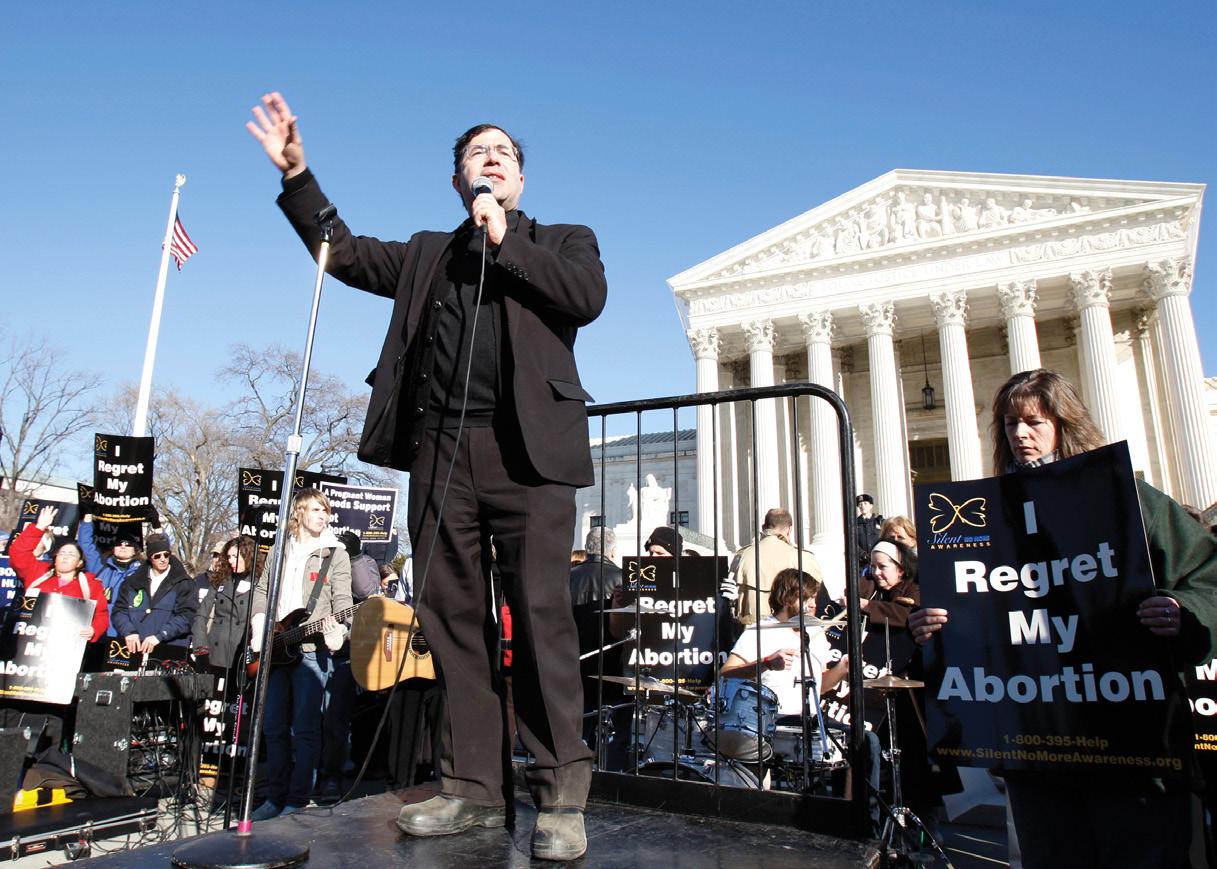
meet Mgr Waldow but both said no meeting was immediately scheduled with Bishop Zurek. Fr Pavone also said he has already explored the possibility of being incardinated in another diocese so he could resume full-time ministry with Priests for Life as soon as possible.
“I fully expect my time in Amarillo, both in terms of this immediate trip and in terms of my affiliation with that diocese, is going to be tempo-
Pope Benedict has named Italian Archbishop Giuseppe Leanza to be the new nuncio to the Czech Republic, transferring him from his post as ambassador to Ireland. The Vatican announced the change which had been rumoured for months. Archbishop Leanza had been nuncio to Ireland since February 2008 and was temporarily called back to the Vatican in late July after Irish government officials publicly criticised the Vatican. The diplomatic incident erupted after the publication of the government’s Cloyne Report, examining how the Diocese of Cloyne mishandled accusations of clerical sexual abuse. The report also accused the Vatican of being “entirely unhelpful” to Irish bishops seeking to implement robust abuse policies.
NIGERIA
For the second time in as many weeks, a prominent member of the Nigerian bishops’ conference has pushed the government to get a handle on violence perpetrated by the Boko Haram sect. The president of the Nigerian bishops’ conference, Archbishop Felix Alaba Job of Ibadan, said that, within the past five years, security agencies had furnished governments at all levels with information on activities of the extremist Islamic sect, but nothing significant had been done to curtail their activities. “We have spoken at length on it,” he said at the opening Mass of the Nigerian bishops’ weeklong plenary in Abakaliki. “The blame as I know it is with the government.”
A Catholic journal has criticised the Polish Church’s handling of sexual abuse by priests, following repeated claims that local Church leaders failed to confront the problem. “The harm caused by sexual molestation of children is unquestionable, but the evil is much greater when paedophilia occurs in the community of faith, and when, in a falsely conceived defence of the Church, authorities hide the facts, conceal the perpetrators and ignore the suffering victims,” the Wiez bimonthly said in an editorial in its August-September edition, dedicated to clergy sexual abuse. The journal questioned whether the Polish Church’s handling of abuse claims complied with Vatican instructions and whether the good of the Church meant “the good name of clergy or the good of the weakest.”
rary,” he said. Fr Pavone added he has appealed the suspension to the Congregation of the Clergy at the Vatican. In his own letter to the bishops, Fr Pavone questioned his suspension and said Bishop Zurek’s claim that Priests for Life has operated with no financial transparency was unfounded. He cited a list of 41 documents detailing the organisation’s finances provided to Bishop Zurek since 2005. CNS
US bishops are working to mobilise Catholics across the country to tell the Obama administration that contraception and sterilisation do not constitute preventive care for women and must not be mandated as part of health reform. Through a new website at www.usccb. org/conscience, bishops hope to generate thousands of comments to the Department of Health and Human Services about its proposal to require nearly all employers to provide sterilisation and all FDAapproved contraceptives, including some that can cause an abortion, at no cost to women covered by their health insurance plans. But time is of the essence, because the 60-day comment period on the HHS proposal closes on 30 September.
MUNICH - St Francis of Assisi appeals to believers and nonbelievers alike because they long for a world where people see each other as brothers and sisters and recognise and respect creation as a gift to all, said Franciscan Father Giuseppe Piemontese, one of eight religious leaders who spoke about The Spirit of Assisi during an interreligious meeting in Munich.
To mark the 25th anniversary of Blessed John Paul II’s gathering with religious leaders in Assisi, Pope Benedict XVI has
convoked a new gathering which, Fr Piemontese said, will underline how important Bl John Paul’s gathering was for promoting dialogue and collaboration. It also will be a “reminder of what still remains to be done” to ensure true collaboration, respect and mutual support among peoples.
Syrian Orthodox Metropolitan Ibrahim said marking the anniversary “challenges us to reflect on these last 25 years. They were brimming with fruitful experiences” and helped religious leaders “strengthen
their faith, enrich their enthusiasm and enhance their collective vision”. The gatherings, he said, are a reminder that “supplication to the creator” unites all faiths. “We are all exhausted by the needless and endless wars around us. If the aim of our prayers is peace, it is the loftiest of goals we are aiming for”, he said.
Oded Wiener, of the Chief Rabbinate of Israel, said, “Darkness and violence cannot be chased away with sticks (and) certainly not with knives and guns,” but only with “the light of faith and positive action of
religious leaders. This is, in fact, the spirit of Assisi.”
Gijun Sugitani of Japan’s Tendai Buddhist movement, said after the Cold War ended, “people expected the swift arrival of world peace.” Instead, there have been new conflicts based on ethnicity, ideology and rage. Returning to Assisi is important, he said, because “we have a responsibility to spread the spirit of Assisi that transcends differences between the ethnicities and religions and unites us all.”
Mohammed Amine Smaili,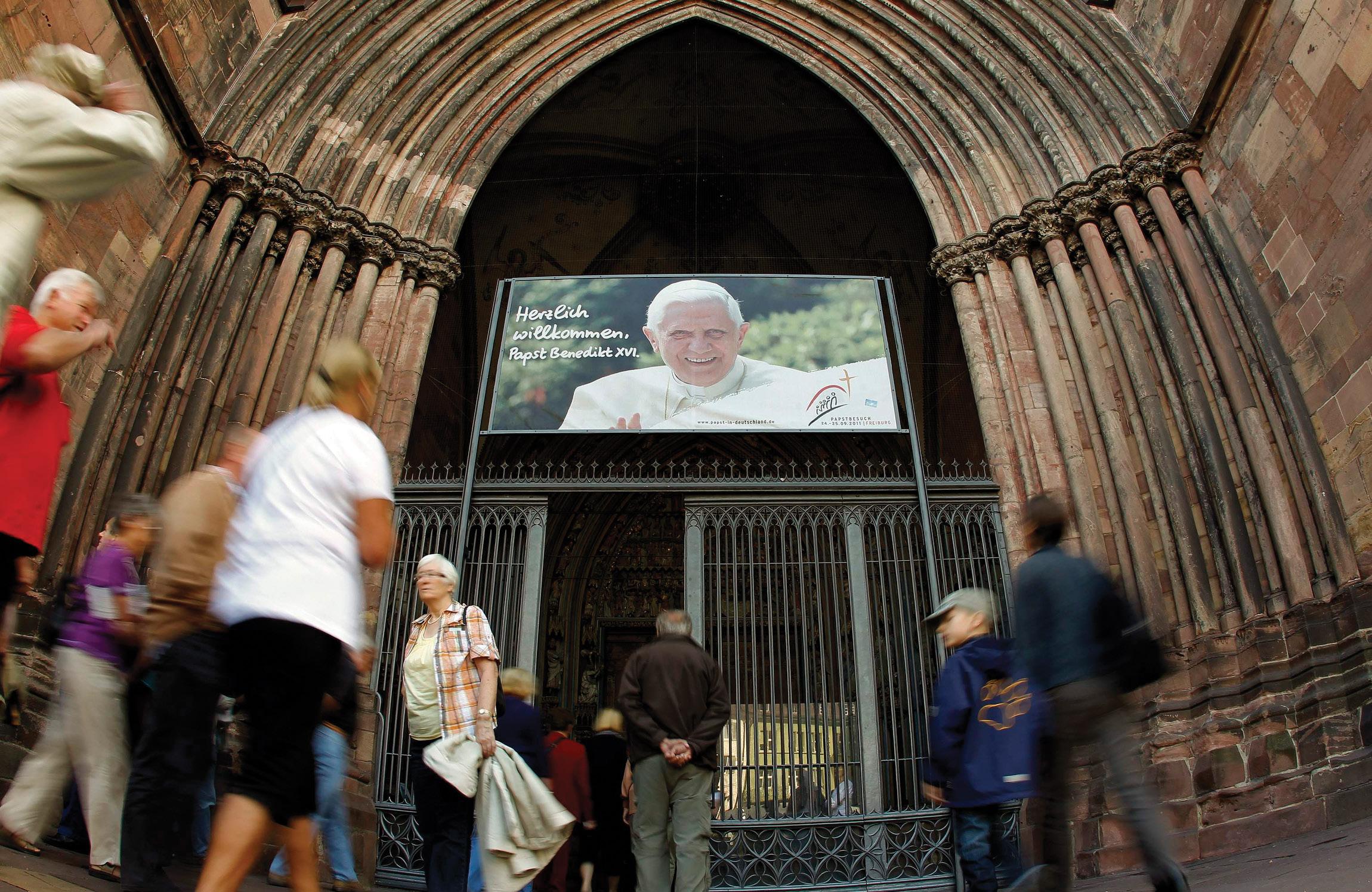
RAJSHAHI - Environment and local cultures were two of the biggest concerns highlighted at the 10th pastoral assembly in Bangladesh’s Rajshahi diocese. “Pollution has reached beyond the capacity of cleansing and now water, air, land and public life are being seriously affected. Natural disasters like global warming, cyclones, drought, flooding and earthquake are more frequent”, said Rajshahi Bishop Gervas Rozario. “Also, negative effects of Western culture are threatening traditional life in tribal communities and need to be tackled,” he added.
In a recent pastoral letter, Bishop Rozario said “preserving the environment and cultural traditions is a moral duty for all”.
The assembly expressed serious concerns over land that climate change is rendering useless through drought and sinking water tables.
Representatives from 18 parishes were told to set up and strengthen Small Christian Communities to care for the environment, ensure proper management of natural resources and preserve cultural traditions.
VATICAN CITY - Leaders of Indonesia’s largest Muslim student group, the Indonesian Islamic Student Association, have invited Pope Benedict XVI to speak at a conference in Bali in 2012.
The association, of about one million members, was founded in 1947 and is “the oldest, largest and most influential” student group in Indonesia, Fides said.
In addition to inviting the Pope to address their conference on dialogue and peace, Fides said, the students spoke to Cardinal Tauran
about ways to promote dialogue and religious pluralism and to begin forms of collaboration with Catholics.
Fides said the visit of the association’s president, Noer Fajrieansyah, and other members of its executive board demonstrated how the organisation has returned to being a force promoting dialogue and interreligious harmony and for combatting extremism.
In the aftermath of the 9/11 terrorist attacks in the United States, Fides said, the organisa -
tion “vigorously protested the US bombing and military intervention in Afghanistan” and rejected claims that radical Islamic groups in Indonesia had ties to al-Qaida. The organisation’s president and another leader “were even arrested for burning the American flag,” Fides said.
The Jakarta Post reported the organisation’s leaders also gave Cardinal Tauran information about how politicians in West Java have been manipulating religion for political gain. CNS
Moroccan professor of Muslim dogma and comparative religion, said the meeting “marked a decisive and memorable about-face” as world religions established consensus that dialogue is the only way humanity can understand itself. He said democratic reform movements have reflected the spirit of Assisi as they bring different religions together to promote greater freedoms and human rights. Religious leaders, he said, “must speak of the holiness of peace and the curse of disrespect and hatred.” CNS
JAKARTA - Executive secretary of the Indonesian Bishops’ Conference commission for ecumenical and interreligious affairs, Father Antonius Benny Susetyo, said recent sectarian violence in the city of Ambon that claimed nine lives was magnified by the media and “not as bad” as reported.
He was speaking at a discussion entitled Clashes in Ambon and Papua: Causes and Solutions organised in Jakarta. “No matter what the issue is, (we) must remember the ethics of mass media,” he said. He also criticised the slow response of police to clashes involving Christians and Muslims which followed the death of Darfin Saiman, a motorcycle taxi driver. Fr Susetyo quoted local reports of rumours circulated by SMS indicating Saiman had been murdered by Christians. “The provoking messages were circulated so fast security could not prevent it. There must have been something wrong. It was not the people’s mistake, but there was sabotage,” he continued.
He said the diocese of Amboina has taken an active part in creating peace continually through tribal groups and basic communities. “Parishes should develop communication so ecclesial basic communities can run well. In this way, the Church can play the role of peace facilitator,” he said.
Also speaking at the discussion was Abdul Mu’ti, secretary of Muhammadiyah, the second largest Islamic organisation in Indonesia.
He said the causes of such sectarian clashes remained unclear but government and the society should work together in upholding justice so as to reduce them.
“A leader, who can ensure people change, is needed so the people will not lose hope. If they lose hope, they will be easily provoked,” he said. UCAN
XI’AN - Families throughout the mountain regions of Fuping and Baishui counties in Shaanxi province have been helped to thrive with a micro-credit scheme launched by the Catholic Social Service Centre of Xi’an diocese.
The scheme has been in practice since 2005 and its organisers are pleased to record that all loans so far have been repaid. This year it took a major step forward by putting its operation on a more formal footing and one of its first beneficiaries was a group of 16 families from the village of Haoli.
They have been allocated 71,500 yuan (US$11,200) which they plan to use to farm livestock and grow vegetables.
Father Stephen Chen Ruixue, centre director, explained how the scheme works. “A project management group is formed by villagers who then receive applications from families for loans, which they consider. They also verify the applicants’ situation”, he said.
“After signing a contract, eligible families are given the funds in a lump sum payment. They have to promise to pay off the debt by
instalments.” Min Yongping, an elderly man who has been helped by the project, said: “I was hesitant at first, but then I found the Church centre helped us not only increase our income but also regain confidence through making a living.”
The scheme is available to all local people regardless of faith and, in fact, the vast majority of Haoli’s 126 families are non-Catholic. They too appreciate how helpful the scheme has been.
“The village is inaccessible as it lies in the remote Qinling mountains”, said one of them, “and there
is seldom any work for people to go to. The Church’s scheme has solved a lot of financial problems by enabling surplus labour force to develop a livelihood through husbandry.”
Despite its isolation, the Qinling mountain region is rich in plant life, with many rare and even unique species. Taking advantage of this, workers at the centre have also invited an agriculture professor to instruct local families on the organic farming of walnut trees, which can provide a highly lucrative crop.
DHow a generation poured their hearts, souls and hard-earned treasures into a shrine for St Therese of Lisieux, “The Little Flower”, by Sr Frances Stibi.
EVOTION to St Thérèse of Lisieux spread like wildfire. During her few years as a Carmelite nun she lived a retiring life but her death brought an awareness of her unique gifts. Through the publication of The Story of a Soul, Thérèse of the Child Jesus or “The Little Flower” soon came to mean a great deal to many people; she had shown them the way of perfection in small everyday things. Miracles and graces were attributed to her intercession, and she was canonised on 17 May, 1925. In 1936, a Basilica in her honour at Lisieux was opened and blessed by Cardinal Pacelli and it was he who, in 1944, as Pope, declared her the secondary patroness of France.
In the meantime, in 1930, Archbishop Patrick Clune had built a magnificent cathedral in Perth. Lack of funds meant there was still one chapel which was not complete.
On Saturday, 27 May 1933 an appeal was launched for a proposed shrine to the Little Flower in St Mary’s Cathedral. Fr Kenny was the promoter of the devotion to St Thérèse and donations were to be sent in to him and they would be acknowledged in The Record. The story of her life had been running for four weeks when the donations began to arrive. The first was £100 sent in by Mrs G Murphy of the Savoy Hotel, followed by £50 from Miss Susan McArdle who had recently donated £10,000 to Archbishop Clune for the cathedral and the beautiful Crucifixion window. The Catholic supplier, Pellegrini, began to advertise books and pictures and statues of the Little Flower. The lists of donations got longer and longer.
St Thérèse said just before she died, “I will spend my eternity in doing good upon earth. I shall send down a shower of roses after my death”.
This saying of hers has been reproduced in red and gold mosaic near the ceiling of the chapel, with a dado of roses at a lower level.
St Thérèse sent roses in response to all manner of requests and her ‘clients’ were grateful. One sent gold dust in thanksgiving for a special favour received. Thanks were given
for a safe confinement, a blessing on the crops, the return of lost sheep, recovery of a sick child, success in examinations, gratitude for a religious vocation and a ‘miserable sinner’ asked for her protection.
The gifts that came with the intentions were extraordinary considering that after the financial crash in 1929, unemployment stood at 21 per cent in 1930 and reached its peak in mid-1932 when 32 percent of Australians were out of work. The effects of the Great
Vitale in Algiers, a Chinese client of St Thérèse in Canton, China, the Redemptoristine nuns in Dublin, Dr Fu Chang in Tokyo and Fr E Sweeney in New Zealand. It seems that The Record had readers all over the world who were anxious to see a worthy shrine built in honour of St Thérèse.
From her research, archives volunteer Mrs Betty Moran has produced an extensive list of the names of the donors to the Little Flower Shrine and their gifts.
“I will spend my eternity in doing good upon earth. I shall send down a shower of roses after my death.”
Depression lingered until the outbreak of the Second World War.
Beside gifts of money which ranged from £100 to 1/- from Master Rodney Brown, the women of Perth sent in their jewellery: a gold ring with an opal, a gold armlet, an emerald and pearl brooch, a ring containing an Indian sapphire, three pearls, two Australian rubies and a little girl sent a gold bangle. The gentlemen, not to be outdone, sent a gold watch and chain, two gold watches, gold cuff links, three gold medals and a piece of gold.
The gifts to St Thérèse arrived from city areas like Highgate, Bayswater, Queens Park and Leederville. Mrs Goody, mother of the future archbishop, gave a gold ring and Sir John Kirwan sent 10/- from Parliament House; from country areas like Geraldton, Kalgoorlie, Wongan Hills, Collie, Tarin Rock, Dardanup, Onslow and ‘two old plodders’ sent mother of pearl and rubies from Broome. Surprisingly, gifts arrived from interstate and overseas. There was gold from South Australia, 5/- from Toowoomba, a sapphire ring from Melbourne and a small amount of money from ‘lonely children of the bush’ in Cairns to name but a few.
The overseas gifts were remarkable in that they came from such widespread areas – a Vincentian nun in San Francisco, Dr Pavlinovich in Mexico City, Dr A Kloster in South Bavaria, F P
Much of the gold and many of the jewels were sold but a few were kept and used to decorate a small reliquary which holds a relic of St Thérèse. This was made by Levinson’s, a local jeweller. A blessing with this relic is often given in the Cathedral on 1 October, the Feast of St Thérèse.
The Record of February and March 1935 recorded many details about the new shrine.
The shrine was designed by M F Cavanagh in pure gothic detail to harmonise with the general structure of the cathedral. Archbishop Clune had intended to execute the whole shrine in Australian marble but came to the conclusion that Australian marbles known so far were not rich enough in colour or soft enough in appearance to harmonise with the colour of the Carmelite robes of the statue of St Thérèse. The original idea was abandoned and the shrine designed in richer Italian marbles – rich green “Verde Antique” for the base of the walls and “Golden Verona” for the wall panelling. The mosaic floral band near the ceiling of the shrine was designed by Cavanagh and reproduced in the Vatican mosaic works in Vatican City, Rome. Algerian Onyx called “Orice Dorato Rubini” was selected for the altar. All the marble work was carried out by Melocco Brothers of Sydney. The names of the donors to the shrine were to be inscribed
in a “Golden Book” to be built into the altar.
The statue of St Thérèse was executed by Professor Mastroicanni of Rome – a leading ecclesiastical sculptor. The new shrine cost £2,650 and, by 9 March 1935, £2,200 had already been subscribed thanks to the promotion of Fr Kenny.
The shrine, beautifully decorated with roses, was blessed and opened at the 11am Mass on 10 March 1935 by Coadjutor Archbishop Redmond Prendiville with Archbishop Clune presiding. Fr Winston was the deacon and Fr Rispin acted as the subdeacon. The ceremony commenced at 10.45am and was broadcast on Radio Station 6WF with Mr Phil Jackson providing the commentary.
The last donations were acknowledged in The Record on 16 March 1935 and included brass candlesticks with wax candles donated by Mr Bogue, the Archbishop’s chauffeur.
What a wonderful legacy the people of Perth have left to the Cathedral and to us.
Stibi PBVM is the Perth Archdiocesan archivist.

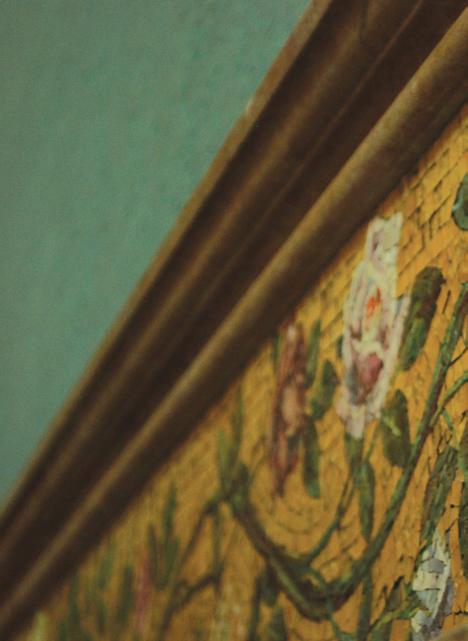
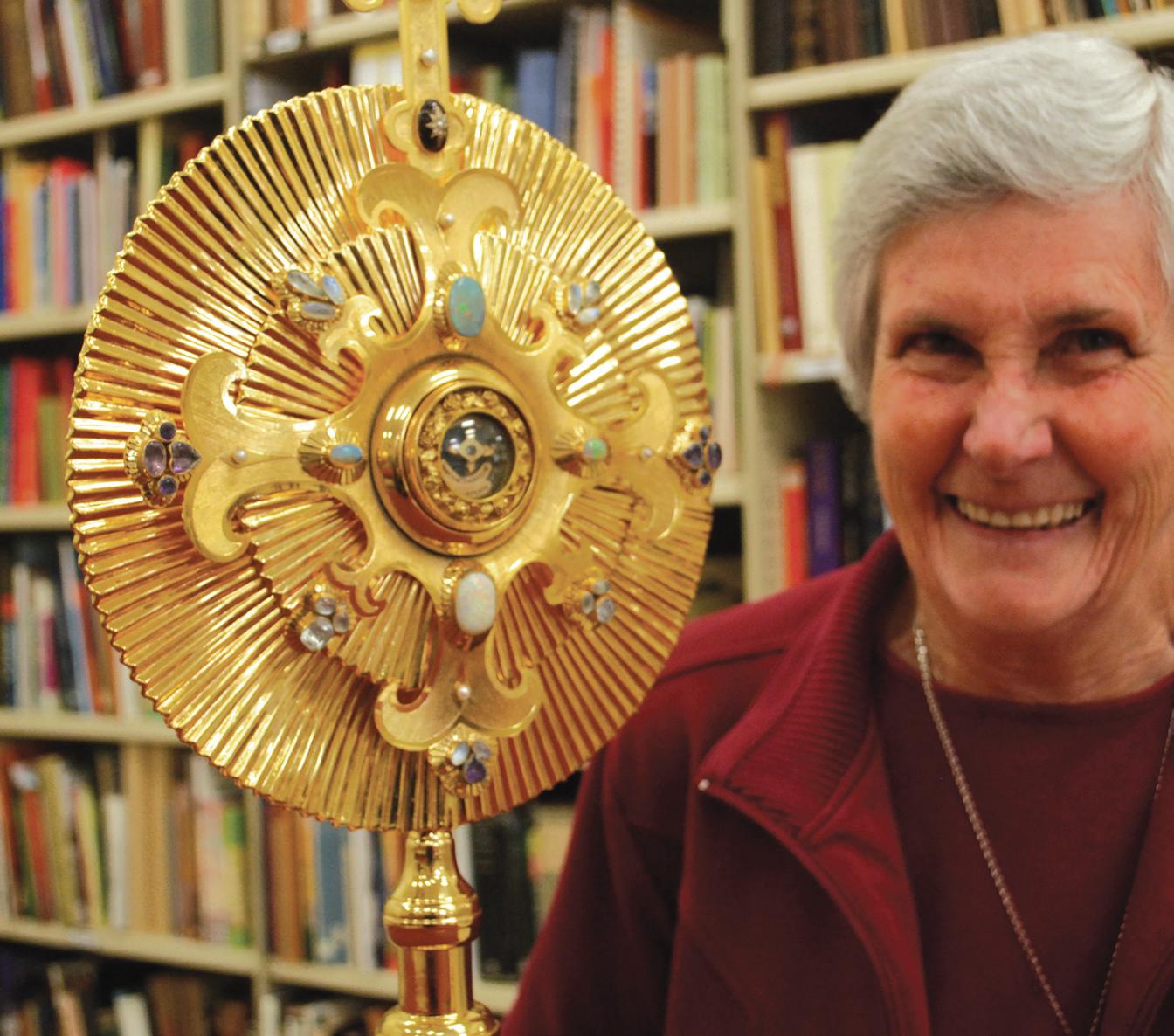
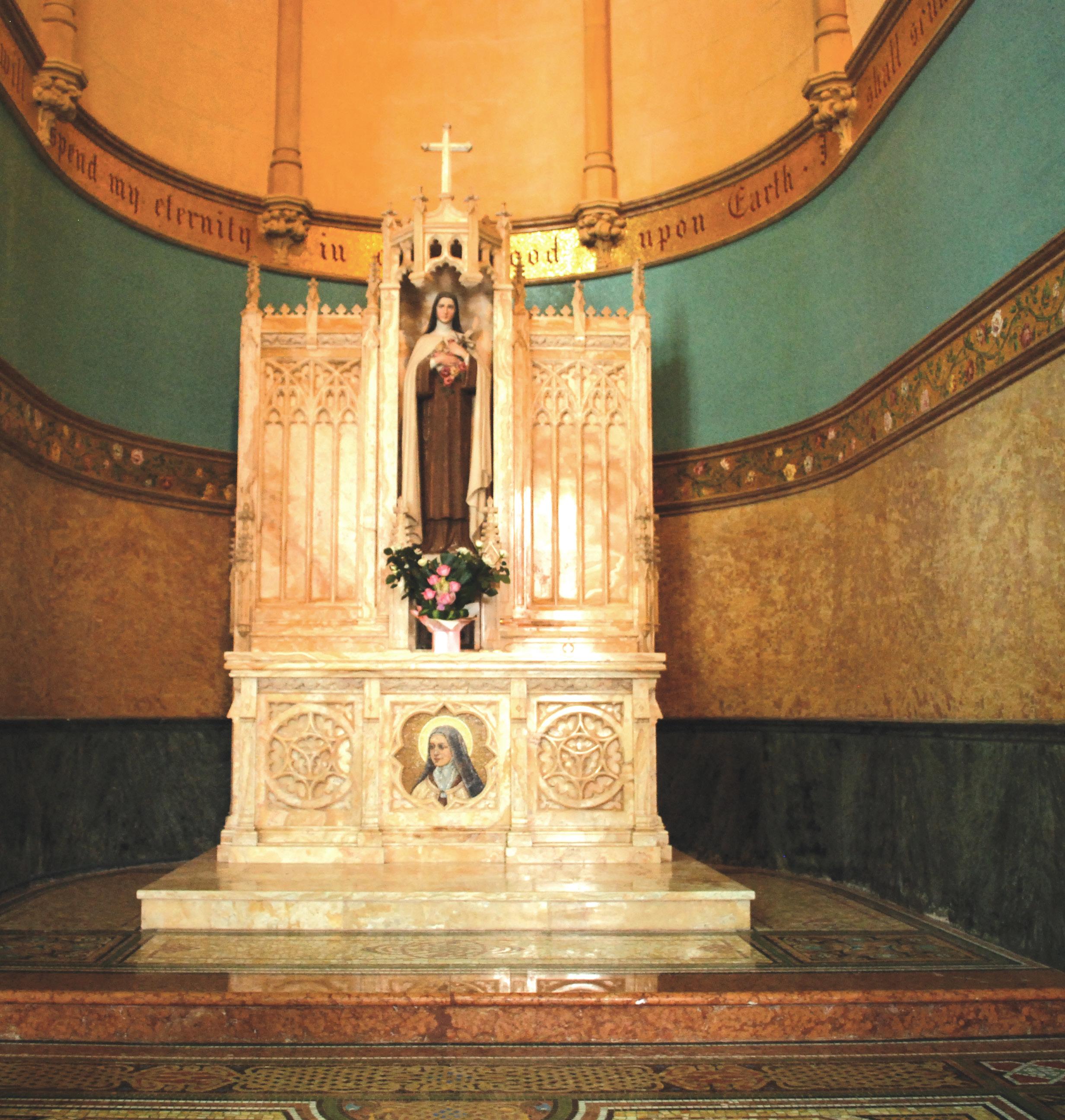
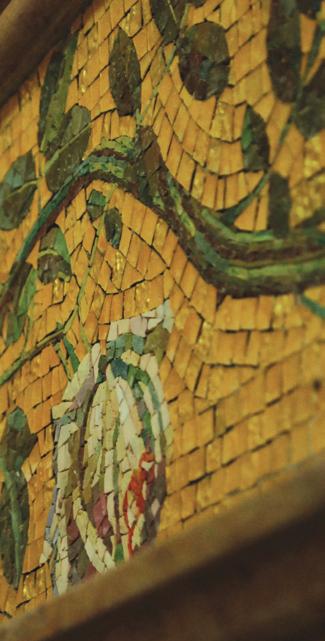

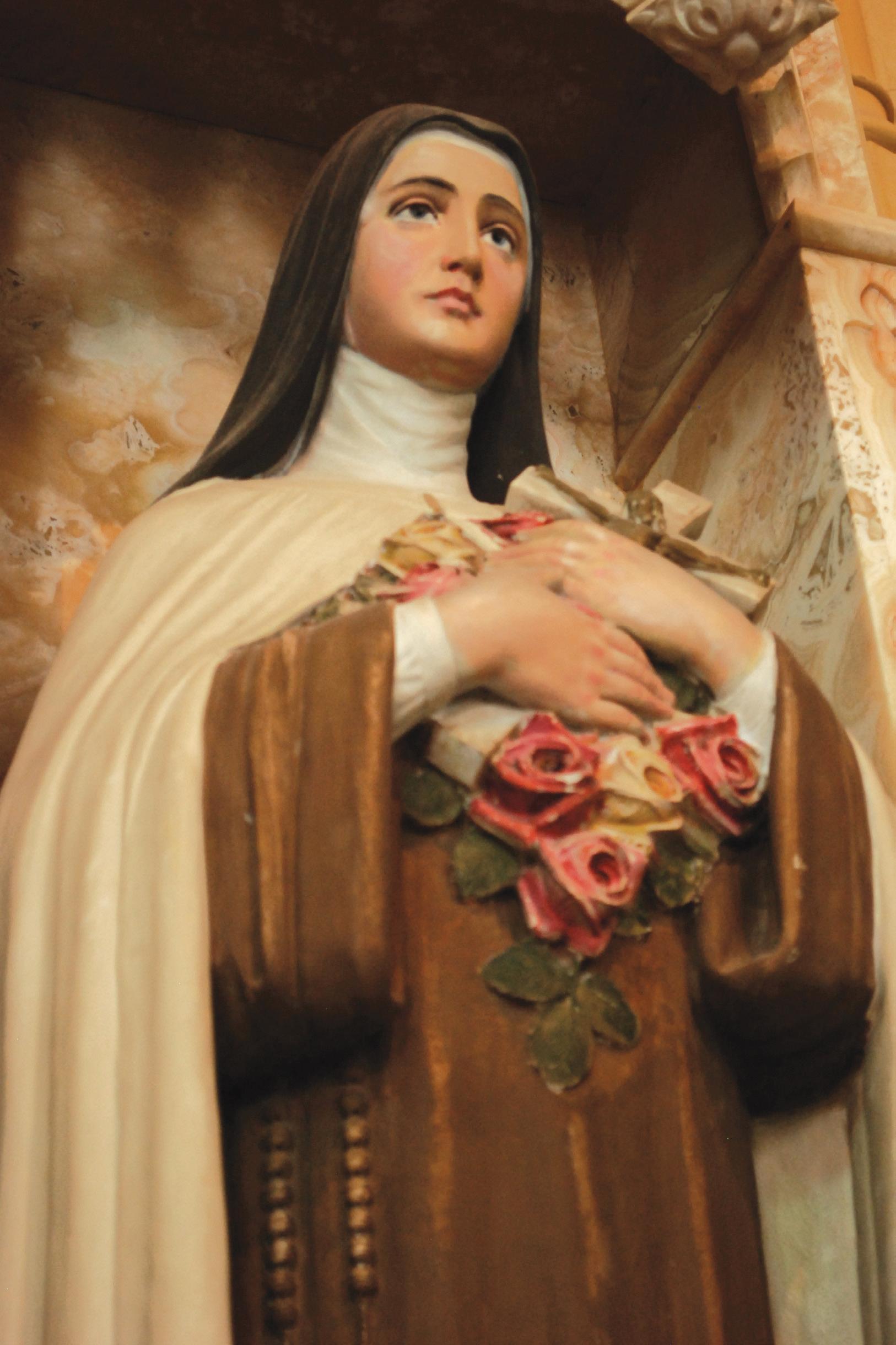
“A person who is working should never experience a lowering of their dignity.”
Have you ever walked through the city and seen those people holding signs advertising something? They can be found on busy street corners or open air shopping malls. Their signs point the way to a restaurant lunch deal, the nearest bottle shop or cheap parking. You might have similarly seen someone outside a pizza shop, waving a sign to passing traffic highlighting cheap lunchtime meals.
I have a problem with this; in fact, we should all have a problem with this. It is not a problem with advertising; it is a problem with the fact that people are being used simply as signposts. Sometimes the people are handing out advertising material as well and this lessens (a little) the problem because at least there is interaction as part of the job. However, to simply strap a sign to people and have them stand in one place or walk around effectively treats them as an object; it is below their dignity as people.
I am sure they get paid for this task, although of course it would not be much, but even so, payment does not make an unjust action just. I might decide to hire a person to lie across the threshold of my door so that I can wipe my shoes on him or her as I enter the house. I may pay, and pay well for being a doormat, but, is it right to use a person as a doormat? If someone freely chooses to sell his or her human dignity to me, am I able to buy it? I would say the answer is no.
Each of us is a personal subject, a being who thinks, perceives and intends. We belong to no one else. A subject directs what actions will take place. An object on the other hand, has actions directed to it. I am using a chair to sit on, I am using a mug to drink coffee. An object is always just that, an object. if my mug cracks, I will just get another one, it is dispensable. We begin to encounter problems when we lose the distinction between subjects and objects. If I turn a person into my doormat, I have made that person into an object; similarly, if I pay a person to act as a signpost.
The thing with human dignity is that it is innate, naturally within each of us. Dignity is not something society bestows for passing certain milestones. It is not like acquiring a driving licence and it is not like graduating from university. It cannot be sold and it cannot be lost. That is why the life of the migrant, the intellectually disabled adult, the brilliant scientist, and the drug addicted gangster are all of equal worth.
“a foolishness wiser than human wisdom” (1 Cor 1:25)
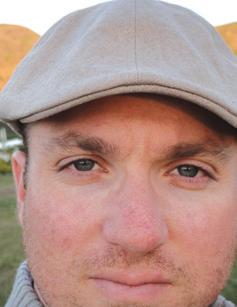 By Bernard Toutounji
By Bernard Toutounji
Christian tradition would say that every human person is sacred because he or she is created in the image of God but belief in the dignity of human life certainly extends beyond Christianity.
Early in his pontificate, Pope John Paul II wrote an encyclical, Laborem Exercens, on the subject of human work. The Pope wrote at length about the value of human work and that determining its value is not primarily in “the kind of work being done but the fact that the one who is doing it is a person”. Whether one is employed to govern the nation or sweep the streets of that nation, John Paul writes that work must
Each of us is a personal subject, a being who thinks, perceives and intends. We belong to no-one else.
enable a person to become “more a human being and not be degraded by it”. A person who is working should never experience a lowering of their dignity.
It is not to say that difficult work or boring work is below a person, but when the person doing the task is seen as only an impersonal force and not as an individual then we begin to move into problems. Even though we all need to work to survive, the essential distinction is that work is for ‘the person’ and not the person ‘for work’.
If employers wish to erect signs advertising their products and services, they should seek permission from the council for a signpost, and not offer a “job” where the person is given no more value than a metal pole. Offering jobs that are below human dignity does not benefit society; they only serve to make all of us a little bit poorer because we begin to perceive things that are not normal as a part of normal life. b_toutounji@optusnet.com.au
True love promises the inifite, Pope Benedict said when he spoke to engaged couples at Ancona, Italy, on 12 September
Dear engaged couples,
Iam happy to conclude this intense day, the culmination of the National Eucharistic Congress, by meeting with you, almost as though wishing to entrust the legacy of this event of grace to your young lives.
Moreover, the Eucharist, Christ’s gift for the salvation of the world, points to and contains the truest dimension of the experience you are living: the love of Christ as the plenitude of human love. The questions you pose, in the present social context, take on an even greater weight. I would like to give you just one guideline as an answer. For these aspects, ours is not an easy time, above all for you young people.
The table is full of many delicious things, but, as in the Gospel episode of the Wedding of Cana, it seems wine is lacking from the celebration. Above all, the difficulty of finding stable work spreads a veil of uncertainty over the future. This condition contributes to [people choosing to] leave definitive commitments for later, and influences the growth of society in a negative way. Society is not able to appreciate fully the wealth of energies, competencies and creativity of your generation.
The wine of celebration is also lacking from a culture that tends to put aside clear moral criteria: In this disorientation, everyone is seen striving to move in an individual and autonomous way, often only within the perimeter of the present. The fragmentation of the communal fabric is reflected in a relativism that hides essential values; a consonance in sensations, states of mind and emotions seems more important than sharing a plan of life.
Also fundamental decisions
become vulnerable, exposed to a perennial revocability, which often is considered an expression of liberty, though actually, it points rather to a lack of liberty. The apparent exaltation of the body belongs also to a culture deprived of the wine of celebration, [an apparent exaltation] which in reality trivializes sexuality and tends to make it exist outside a context of communion of life and love.
Dear young people, do not be afraid to face these challenges! Never lose hope. Have courage, also in difficulties, remaining firm in the faith. Be sure that, in every circumstance, you are loved and protected by the love of God, which is our strength. Because of this, it is important that an encounter with him, above all in personal and community prayer, be constant, faithful -- precisely as the path for your love: to love God and to feel that he loves me. Nothing can separate us from the love of God!
Be sure that the Church is also close to you, supports you, and does not fail to regard you with great confidence. She knows that

Avoid enclosing yourselves in intimate relations, which are falsely tranquilising; make your relationship become leaven in the community
you are thirsty for values, the true values upon which it is worthwhile to build your home. The value of faith, of the person, of the family, of human relations, of justice. Do not lose courage in face of the needs that seem to extinguish joy at the table of life.
At the Wedding of Cana, when wine was lacking, Mary invited the servants to go to Jesus and she gave them a precise indication:
“Do whatever he tells you” (John 2:5). Treasure these words, the last of Mary’s taken up in the Gospels -- virtually a spiritual testament -- and you will always have the joy of the celebration: Jesus is the wine of the celebration!
Engaged couples live at a unique stage, which opens to the wonder of encounter and which makes one discover the beauty of existing and of being precious to someone, of being able to say to one another: “You are important to me.” Live this path with intensity, gradualness and truth. Do not give up on pursuing the lofty ideal of love, which is a reflection and
testimony of the love of God!
But, how should this phase of your life be lived? How can you give a witness of love in the community? I would like to suggest to you first of all that you avoid enclosing yourselves in intimate relations, which are falsely tranquilizing; instead, make your relationship become leaven in an active and responsible presence in the community.
Moreover, do not forget that to be genuine, love also requires a journey of maturing: beginning from the initial attraction and “feeling well” with the other, educate yourselves to “love well,” to “want the good” of the other. Love lives from gratuitousness, selfsacrifice, forgiveness and respect for the other. Dear friends, all human love is a sign of the eternal Love that has created us, and whose grace
sanctifies the decision of a man and a woman to give themselves reciprocally to the life of matrimony. Live this time of engagement in confident waiting for this gift, which must be received by following a path of knowledge, respect, and attentions that you must never neglect. Only under this condition will the language of love become meaningful also with the passing of the years. Hence, educate yourselves henceforth in the liberty of fidelity, which leads to protecting one another, to the point of the one living for the other. Prepare yourselves to choose with conviction the “for ever” that distinguishes love: indissolubility, more than a condition, is a gift that must be desired, requested and lived, beyond any changing human situation. And do not think, along with the widespread mentality, that living
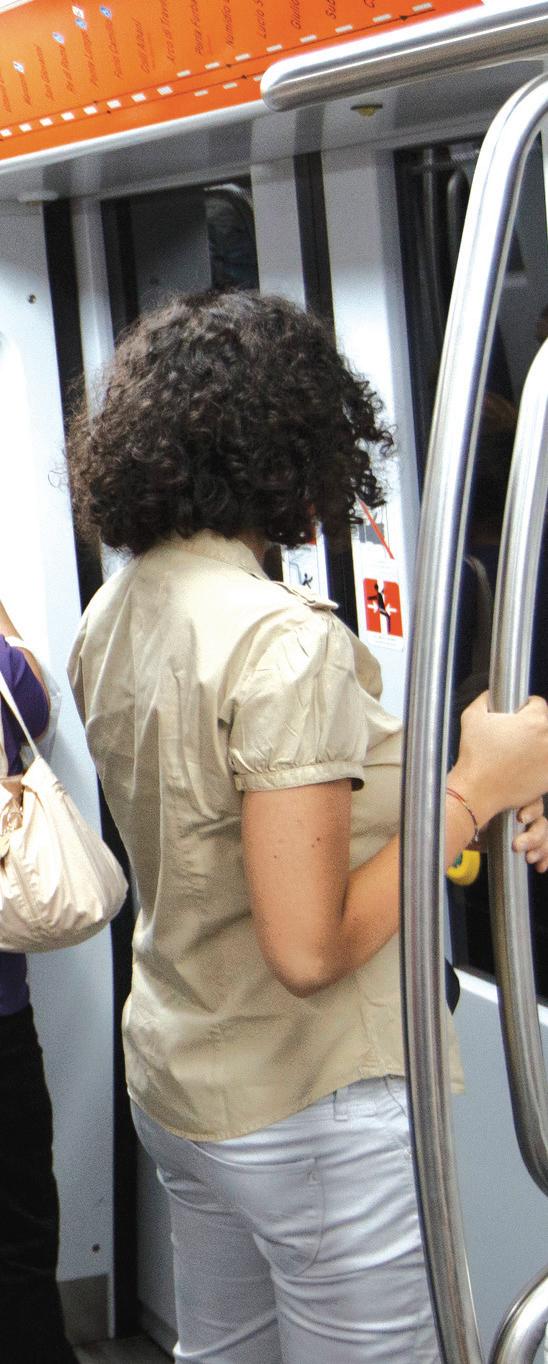
together is a guarantee for the future. If you skip the steps of intimacy, which require respect for time and a gradual progression of expressions, you will “get burned” in love; love needs room for Christ, who is capable of making a human love faithful, happy and indissoluble.
The fidelity and enduring nature of your love will also make you capable of being open to life, of being parents: The stability of your union in the sacrament of matrimony will enable the children that God wishes to give you to grow confident in the goodness of life. Fidelity, indissolubility and transmission of life are the pillars of every family, a true common good, a precious patrimony for the whole society.
Henceforth, found on them your path to matrimony and give witness of this to your con-
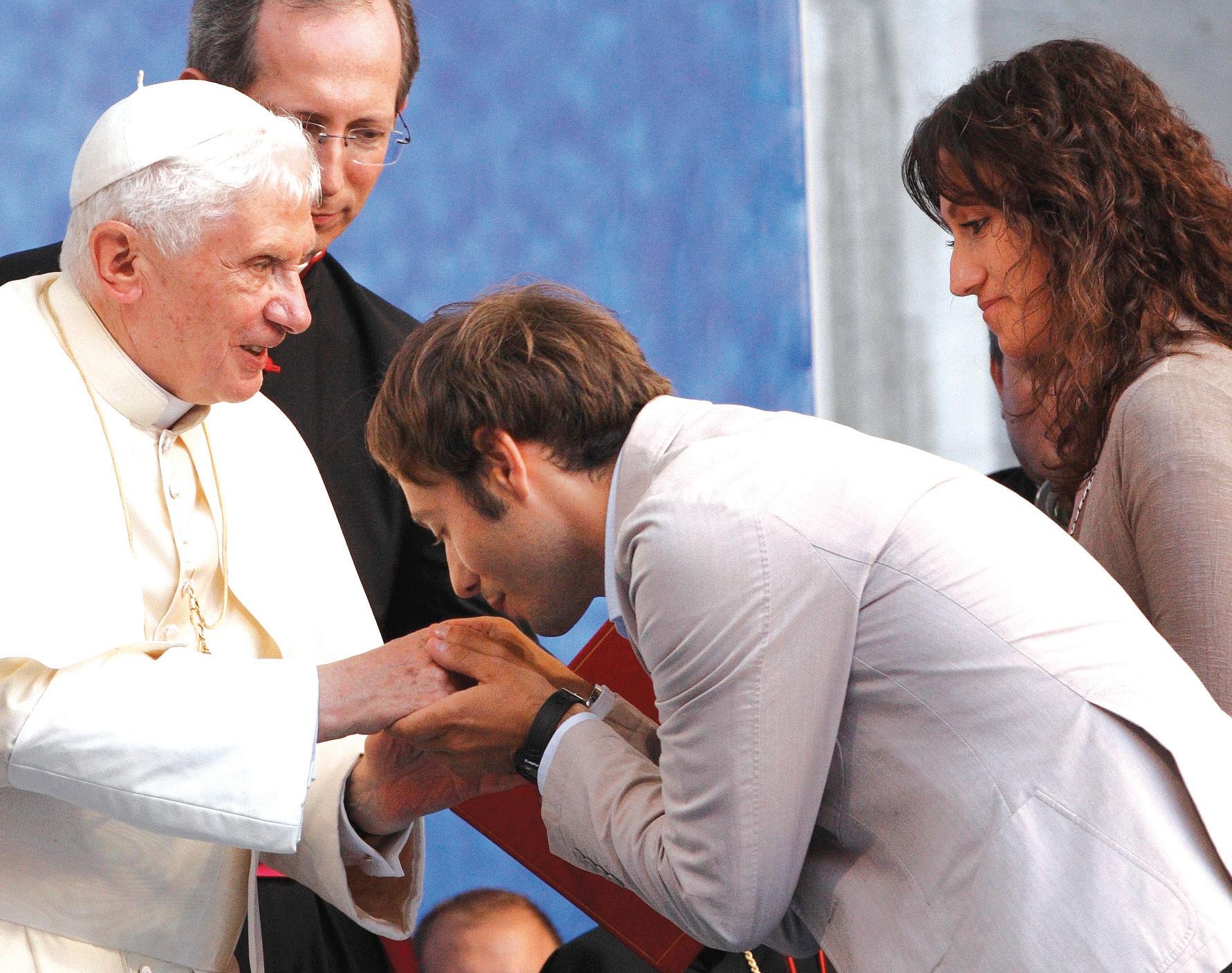

temporaries: This is a precious service! Be grateful to those who with commitment, competence and willingness accompany you in formation: They are the sign of the attention and care that the Christian community reserves for you. You are not alone: Seek and receive in the first place the company of the Church.
I would like to return again to an essential point: the experience of love has within itself a tension toward God. True love promises the infinite! Hence, make of this time of preparation for matrimony an itinerary of faith: Rediscover for your life as a couple the centrality of Jesus Christ and of walking with the Church. Mary teaches us that the good of each one depends on listening with docility to the word of the Son. In those who trust in him, the water of daily life is transformed into
the wine of a love that makes life good, beautiful and fruitful. Cana, in fact, is a proclamation and anticipation of the gift of the new wine of the Eucharist, the sacrifice and banquet in which the Lord reaches us, renews us and transforms us.
Do not neglect the vital importance of this encounter; may the Sunday liturgical assembly find you active participants: From the Eucharist springs the Christian meaning of existence and a new way of living (cf. postsynodal apostolic exhortation “Sacramentum Caritatis,” 72-73). Hence, do not be afraid to take on the committed responsibility of the conjugal choice; do not fear to enter into this “great mystery,” in which two persons become one flesh (cf. Ephesians 5:31-32).
Very dear young people, I entrust you to the protection of St. Joseph and Mary Most Holy; following the invitation of the Virgin Mother “Do whatever he tells you,” you will not lack the pleasure of the real celebration and you will be able to take the best “wine,” the one that Christ gives for the Church and for the world.
I would like to tell you that I am also close to you and to those, like you, who live this wonderful journey of love. I bless you with all my heart!
The full text of the Pope’s address can be found at www.vatican.va
“Let him kiss me with the kisses of his mouth for your love is more delightful than wine.
Pleasing is the fragrance of your perfumes; your name is like perfume poured out. No wonder the young women love you!
Take me away with you – let us hurry!
Let the king bring me into his chambers.”
- SONG OF SOLOMON 1:2-4
Dear Father, in the new translation of the Mass, one part that intrigues me is when the priest says, “Blessed are those called to the supper of the Lamb,” and we answer, “Lord, I am not worthy that you should enter under my roof”. Why this strange wording?
Iwill comment on three changes in these words, since you didn’t specify which aspects you found strange. In any case, I know of other people who have also been bewildered by the new wording.
It would be helpful to begin with the words the priest says just prior to the ones you mention. When he holds up the host the priest says to the people, “Behold the Lamb of God, behold him who takes away the sins of the world.” These are, of course, the words said by John the Baptist when Jesus approached him (cf. Jn 1:29).
Jesus is the true Lamb of God, of which the paschal lamb sacrificed and then eaten by the Jews on the feast of Passover was just a figure. He is the sacrificial lamb who offers his life on the cross to take away our sins and then gives himself to us in Communion. The priest goes on to say, “Blessed are those called to the supper of the Lamb.” The word Blessed, which replaces Happy, is the English translation of the Latin Beati and is worthy of comment. The word is well-known as the first word of the Beatitudes, which Jesus announces in the Sermon on the Mount. For example, “Blessed are the poor in spirit for theirs is the kingdom of heaven” (Mt 5:3).
The very name “Beatitudes” derives from the Latin word Beati, or Blessed, used by St Jerome in the Latin Vulgate Bible. It is the word that also gives us beatification in English, the process whereby someone is declared “Blessed” by the Church. Also, some Eastern Patriarchs are referred to as “His Beatitude”, equivalent to “His Holiness”.
The usual translation of beati is indeed blessed¸ although some versions, including the Jerusalem Bible, used in the Lectionary, translate the word as happy.
The word blessed expresses much more than happy. It refers not just to an emotional state, as does happy, but to an inner state of holiness, of closeness to God, of blessedness. Indeed, those called to the supper of the Lamb are truly blessed by God.
We should remember that not all are called to receive Communion. Any non-Catholics in the congregation, with the exception of the Orthodox, are not called, nor are Catholics who are not in the state of grace. Thus those who are able to receive Communion are truly blessed, both because their state of grace is already a state of holiness, and because they are invited to come forward to receive the Lamb of
Q&A
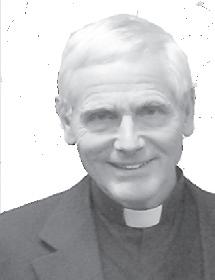 By Fr John Flader
By Fr John Flader
God in holy Communion and thus to increase their holiness.
A second change is the mention of the “supper of the Lamb”, instead of “his supper”. It is a more faithful translation of the Latin ad cenam Agni.
What is the “supper of the Lamb”? It can refer to two suppers. In the first place it refers to the Communion that is about to take place. Those who receive Communion receive Christ, whole and entire, the Lamb of God who takes away the sins of the world.
God speaks to us through Scripture and the Church wants us to hear what he has to say.
But it can also refer to the eternal wedding banquet of the Lamb in heaven mentioned in the Book of Revelation: “Blessed are those who are invited to the marriage supper of the Lamb” (Rev 19:9). Indeed, receiving Christ in Communion on earth is already an anticipation of the communion we will have with him in Heaven. Outside of heaven, there is no closer communion with Christ.
And to those who receive him in Communion Jesus promises heaven: “I am the living bread which came down from heaven; if any one eats of this bread, he will live for ever” (Jn 6:51). And again: “[H]e who eats my flesh and drinks my blood has eternal life, and I will raise him up at the last day” (Jn 6:54).
Finally, why the strange wording “Lord, I am not worthy that you should enter under my roof” instead of the more simple “Lord, I am not worthy to receive you”? Again, this is a more faithful rendering of the Latin, and a more scriptural one too. It, records the words of the centurion who had asked Jesus to heal his servant: “Lord, I am not worthy to have you come under my roof; but only say the word, and my servant will be healed” (Mt 8:8).
We, like the centurion, express our unworthiness that Our Lord should come under our roof, into our soul, but we ask him to say the word and our soul will be healed.
The Church’s deep interest in the sciences, especially astronomy, helped it regulate important occasions in the Church year, writes
Carol Glatz.Hidden among the paving stones of St Peter’s Square is a simple clock and calendar. All you need is a sunny day.
The 83-foot stone obelisk in the middle of the square acts as a sundial that can accurately indicate midday and the two solstices thanks to a granite meridian and marble markers embedded in the square. Pope Benedict XVI proudly pointed out the timepiece during an Angelus address he gave on the winter solstice a few years ago.
“The great obelisk casts its shadow in a line that runs along the paving stones toward the fountain beneath this window and in these days, the shadow is at its longest of the year,” he told pilgrims from the window of his library.
In fact, at noon on 21 December, the obelisk’s shadow falls on the marble disk furthest from the obelisk’s base, while at noon on 21 June, the summer solstice, the tip of the shadow will fall just a few yards from the obelisk. In between are five other disks marking when the sun enters into which sign of the zodiac. A long, thin granite strip running from the obelisk toward the Pope’s window and through one of the fountains acts as the meridian: a line that indicates when the sun has reached true or solar noon and is at its highest point in the sky.
The Pope reminded people that the Church has always been keenly interested in astronomy to help guide and establish fundamental liturgical days and the times of prayer such as the Angelus. While sunrise and sunset are easy to figure out, sundials could accurately tell midday, he said. Even when early mechanical clocks were introduced, they were a luxury item for a few and not always accurate, so using the sun to mark true noon was an important backup.
In the 18th century, Pope Clement XI decided to create an official reference point for telling time in Rome. He commissioned astronomer Francesco Bianchini to build a meridian inside Michelangelo’s Basilica of St Mary of the Angels and Martyrs. The basilica’s elaborate meridian was meant to do much more than mark midday; it was built to make highly accurate celestial observa-
tions and solve complex astronomical problems, said John Heilbron, emeritus professor of history at the University of California. He said St Mary of the Angels “could do things you couldn’t do with telescopes at the time” like find out precise information about the inclination of the Earth’s axis.
Pope Clement wanted to verify the accuracy of the Gregorian reform of the calendar and its calculation of Easter, which had still not been widely accepted among Protestant churches at the time. The real problem for the Church was “how to compute the moons which are essential for the determination of Easter,” said Jesuit Father Juan Casanovas, a solar astronomer and historian of astronomy. The Council of Nicea tackled the problem in 325 and interpreted the Mosaic rule by
The Church has always been keenly interested in astronomy to help guide fundamental liturgical days.
defining Easter to be observed on the Sunday that followed the first full moon after the vernal equinox on 21 March. However, there were still complicated tables involved in calculating Easter because the Julian calendar used at the time was no longer in sync with the seasons. The Gregorian reform got rid of 10 days to bring the vernal equinox back to the traditional date of 21 March, Fr Casanovas said.
However, the Orthodox Church did not accept the Pope’s authority nor his calendar. Still, today, the Orthodox Church uses the Julian calendar for religious functions, resulting in the Eastern date for Easter usually falling later than the Western date though occasionally the dates coincide.
While Pope Gregory XIII’s reform of the calendar in 1582 was not perfect, it is still easy, practical and almost universally accepted in civil society today, Fr Casanovas said.
Calendars will never be perfect because “a calendar deals with whole days, not fragments of hours,
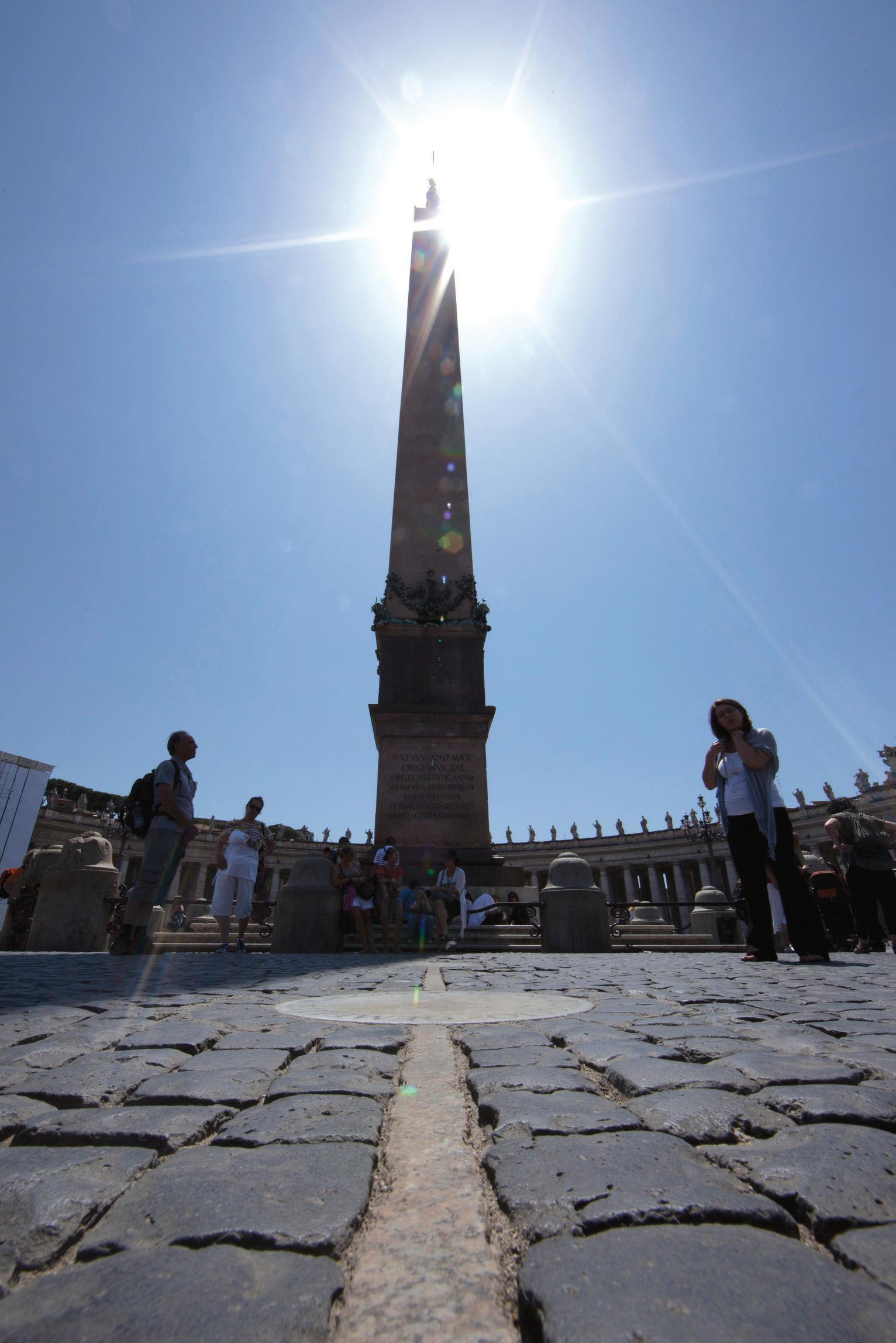
seconds and thousandths of a second so you have to be ready to add one day or remove a day from the calendar now and then,” he said. Having a leap year has been successful but “it’s not enough. There is still a little error and after centuries it accumulates,” he said.
The calendar is expected to gain a day by the year 4500.
There have been many proposals to get the world synced to one perpetual calendar, but perfection and accuracy would come at a price.
“In calendrics, precision and perfection should not trump practicality,” he said.
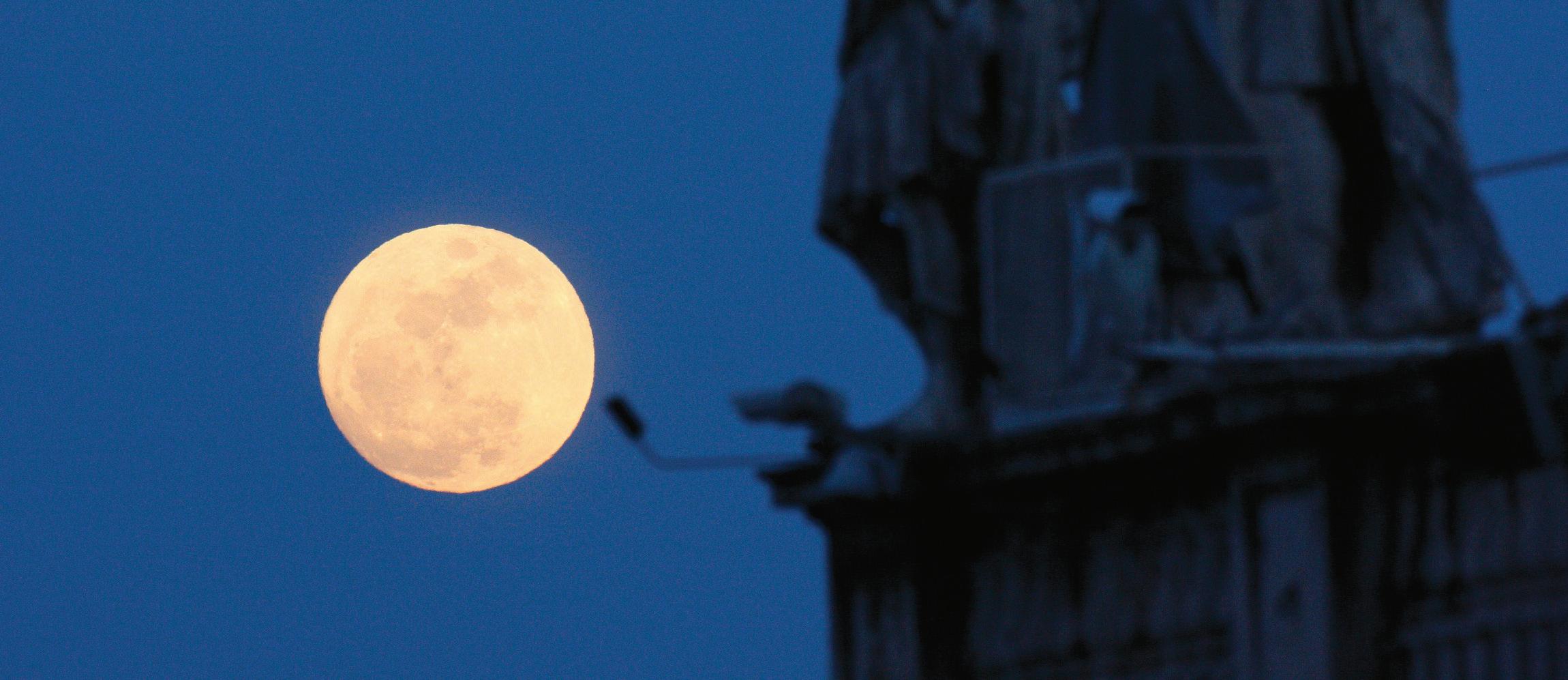
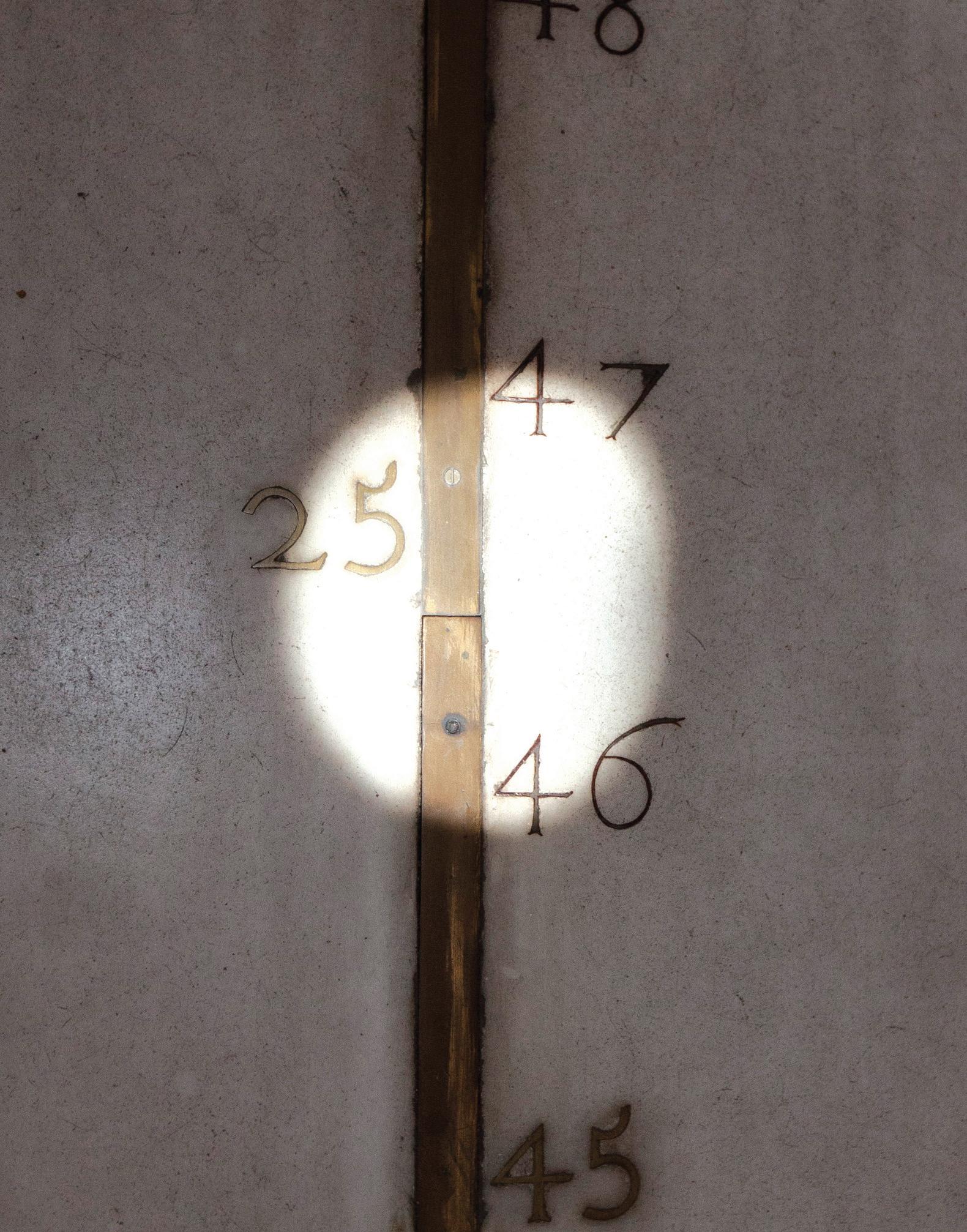
THE DEBT is a Nazi-hunter caper. It isn’t getting consistently rave reviews but was a quite engaging and worthy vehicle. Just when you think you know what the ending will be, you really, really don’t. Trust me.
And the ending takes many twists and turns. You will simply never guess or even really know when you’re at the end.
The acting is beyond superb: Rachel (Helen Mirren/Jessica Chastain), Stefan (Tom Wilkinson/ Marton Csokas) and David (Ciaran Hinds/Sam Worthington) are Mossad (Israeli intelligence) operatives who, in 1965, are on a mission to capture infamous Nazi experimental doctor-butcher, Dr Vogel, “the surgeon of Birkenau,” (Jesper Christensen) who is a practising obstetrician in East Germany. Guess which one of the three gets to pose as a patient? Yeah, it’s that tense. Their plan is to take him back to Israel to stand trial and expose his crimes to the world.
We flash back and forth between the now-aged heroes in 1997 (Rachel’s daughter has written a book about her mother’s exploits) and what actually happened. It’s not all as simple as it first appears.
We were taught at UCLA film school that a love story in war trumps all other stories (and did WWII ever really end for the Jews?), and that one woman between two men is the best love story. The Debt has all this.
The character of the Nazi monster is truly chilling in his calm, (ir)rational, clinical, evil hubris and hatred of the Jews. The everlingering questions are brought up: “What, were we all insane, then?” asks Dr Vogel.
It’s a truly great and needed service to all of humanity that Jews continue to tell many and varied stories of their Holocaust experiences. The attempted extermination of Jews is not “their” story, it’s “our” story. We must never forget.
Although David, as a young Israeli agent, says there is “no answer” to Nazi evil, it simply must
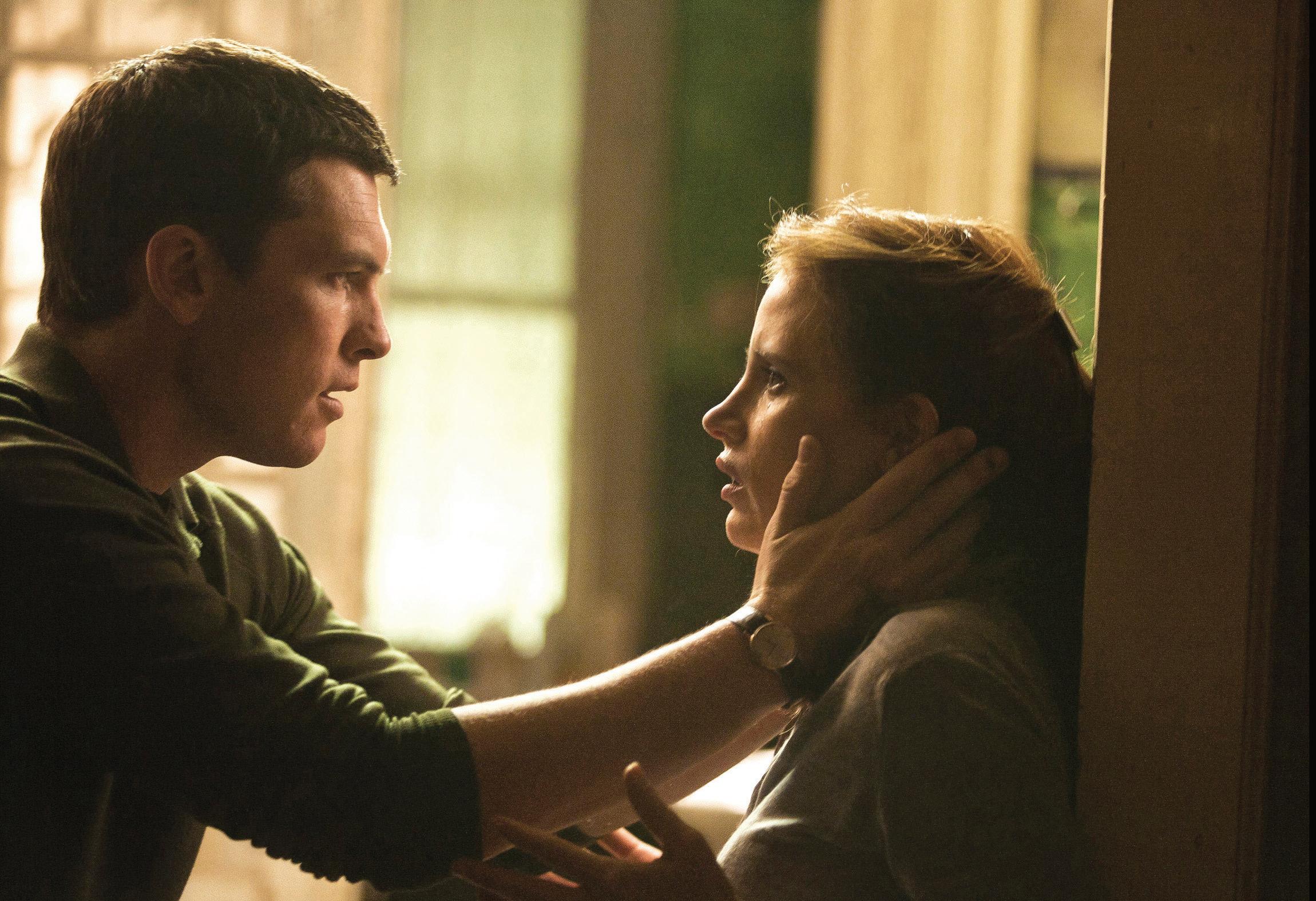
be brought to justice. I think we do well to study it.
A “recipe for disaster” existed in German national humiliation after WWI; Godless science; stirring up a fanatical, outsized patriotism; a potent philosophy of power; just enough madmen as leaders and foot soldiers; and never to be underestimated, the Hitler Youth.
One generation of indoctrination was enough to clinch the deal: “Train up a child in the way he should go, and when he is old he will not depart from it” (Prv 22:6 KJB).
My one beef with the movie is that the dialogue is a little too onthe-nose.
Characters frequently commit one of the arch-sins of screenwriting by telling each other what they both already know. “Hey, audience! Here’s some information for you, or rather, we just want to make sure you were paying attention the first
time we said it! And, did you get that this information is related to that other scene we mentioned? Just checking! Just want to make it abundantly obvious even though we don’t doubt your intelligence for a second!”
Most unfortunately, The Debt is another film that’s rated “R,” that
“luxury” sometimes? If we don’t tell the truth, do we become like our enemies (if we’re “the good guys”)? Assorted other thoughts
l Helen Mirren is sooooo beautiful.
l Weird seeing Helen Mirren in a serious spy flick after Red
“Just when you think you know what the ending will be, you really, really don’t. Trust me.”
could easily be PG-13, in order for young people to learn some history through film. The question of The Debt is: the truth. Do we always tell the truth? Will aleways telling the truth do more damage than good? What is a true hero? Do heroes always tell the truth?
Can people still be proud of us when the truth isn’t as heroic as we’d like it to be? Is the truth a
l Jessica Chastain’s acting abilities on display here. (Anyone could have played the mother in Tree of Life.)
l Sam Worthington says so much with his eyes.
l You will hate actor Jesper Christensen (Dr Vogel).
l Some excellent use of handheld filming!
l There are so many more cau-
tionary and heroic tales to be told of the suffering under the Nazis and Soviets. By telling non-Jewish stories, I think it might actually validate the telling and re-telling of the Jewish experience for those, who, very shortsightedly are “tired” of hearing about the Holocaust. (See? They were not the only targets! See? Evil is never satisfied with just one victim. See? We’re all in this together. Or, to paraphrase Bonhoeffer, I think: “I didn’t speak out when they came for the Jews. I didn’t speak out when they came for the gypsies. I didn’t speak out when they came for the handicapped. I didn’t speak out when they came for the retarded, the homosexuals and the dissidents. And then they came for me.”)
l The fine movie about Cold War East Germany’s ubiquitous and paranoid surveillance, The Lives of Others, is excellent except for one point. A statement is made that a particular man can’t be a bad man because he liked a certain piece of classical music. Um, the Nazis had very refined tastes. The ability to appreciate beauty (and rape, plunder and pillage, the art and other treasures of humanity for one’s own enjoyment) is indicative of nothing in one’s character, really.
l A must-see documentary is The Eichmann Trial—live footage of the Jerusalem trial of Hitler’s designer of the “Ultimate Solution” (strategy/logistics for how to exterminate the Jews). Eichmann was eventually hanged in Jerusalem.
l The Nazis created hell on earth.
l The three are not supposed to “listen or talk to” the Nazi “doctor” while he’s in captivity. Why? Because, like the devil, he is utterly cunning.
l Life is ALWAYS a spiritual (at least) battle. We are ALL God’s secret agents for the good.
l Watch Ben Stein’s Expelled to see how the Nazis used Darwinian evolutionary theories.
Sr Helena Burns fsp, is a member of the Daughters of St Paul and works for Pauline Books & Media.
THOUGH unlikely to be popular with the more senior members of the Junior League of Jackson, Mississippi, the warm, deftly acted drama The Help (Disney) seems destined to win hearts in many other quarters.
That’s because writer-director Tate Taylor’s adaptation of Kathryn Stockett’s best-selling novel uses vivid characterisations to bring the Civil Rights-era struggle for human dignity alive.
A harsh scatological plot development, however, marks the film as off-limits for younger viewers, who might otherwise benefit from its generally uplifting story, and will even be off-putting for many adults.
Fresh from her studies at Ole Miss, Eugenia “Skeeter” Phelan (Emma Stone) returns home to Jackson in the early 1960s with her head full of rebellious notions. Instead of finding herself a husband, as her good-hearted but traditionally minded mother, Charlotte (Allison Janney), would prefer, Skeeter wants to be a journalist.
As for the wildly racist thinking that prevails among her privileged peers, personified most viciously by
Junior League leader Hilly (Bryce Dallas Howard), Skeeter has no patience for it.
Neglected by Charlotte, Skeeter was nurtured instead by her family’s black housemaid, Constantine (Cicely Tyson in a brief but wonderful performance), for whom Skeeter retains a deep affection.
Securing a job as the household hints columnist for a local paper, Skeeter turns to another servant, Aibileen (Viola Davis), for advice on the subject.
But Aibileen’s help with cleaning tips soon becomes a pretext for Skeeter’s secret and potentially dangerous scheme to write a book documenting the lives of Jackson’s African-American domestics.
Though initially reluctant to cooperate, Aibileen decides to take the risk based on a sermon she hears in church.
Eventually, Skeeter also manages to win the confidence of Aibileen’s sassy best friend Minnie (Octavia Spencer), whose anecdotes include the off-colour tale of how she took revenge on Hilly for firing her.
Since Hilly is leading a crusade to establish separate bathrooms for the city’s maids, so they won’t spread disease to the white population by using their employers’ facili-
ties, Minnie’s manner of wreaking vengeance is apt.
But, as portrayed in a fairly lengthy scene, and as repeatedly referred back to, the incident is also profoundly distasteful.
The dynamic created by Skeeter’s perkiness, Aibileen’s mournful warmth and Minnie’s irrepressible sauciness keeps the pace unflagging while the proceedings are further enriched by supporting performances from Jessica Chastain as a kooky but kindly social outcast and Sissy Spacek as Hilly’s Alzheimer’sbeset, but still spirited mom.
Dramatising the stupidity of prejudice and the expansive possibilities open to those who overcome it, The Help is a richly humanistic tale mature viewers will welcome.
The film contains a graphic scatological theme, brief violence and medical gore, veiled sexual references, a half-dozen uses each of profanity and crude language and a few racial slurs. - CNS
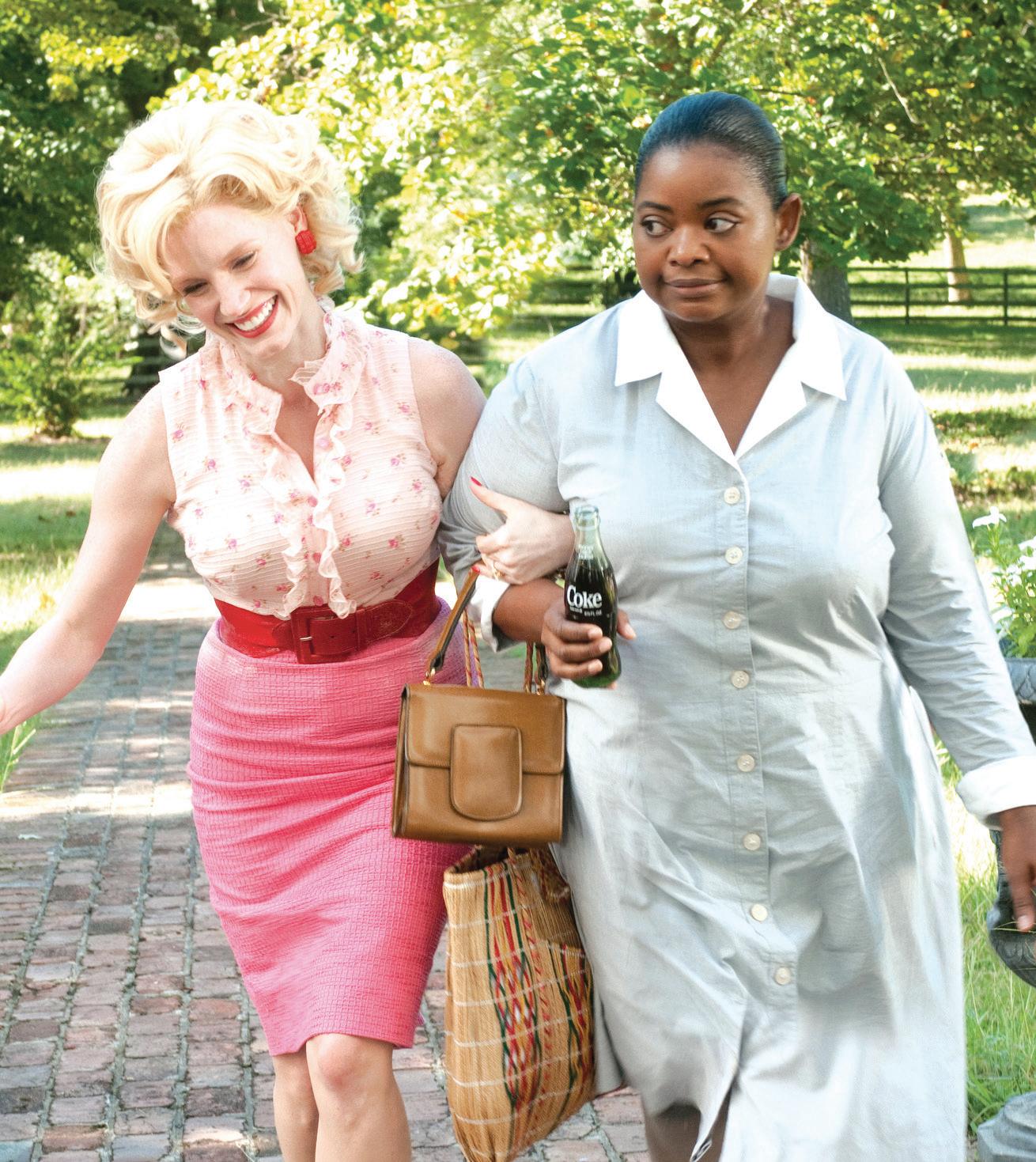
WHEN the Record editorialised on the serious national problem of the decline of fatherhood it was because there are two dimensions to the problem. One is the ongoing problematic absence from the lives of children, the second is the socially erosive and compounding effects that fatherhood’s decline contributes to increasing social dislocation. But reiterating the importance of fathers to children, families and societies should never be miscontrued as a negative judgement on families where fatherhood is not present. Nor should emphasising the essential importance of the principal of unity in the task of parenting and marriage be misinterpreted as a definitive statement that without a father present a family cannot function or succeed in the journey of life.
In fact, there can be little doubt that there are many mothers who, making the best of the situations in which they find themselves, are doing better jobs at filling four shoes than many families where both parents are present. This refers, in passing, to the widespread ignorance in society and among Australian families about the meaning of family life and the true role of parents. So many parents in Australia simply let their children drift with the currents of peer pressure and fashionable social and media values because they believe that materially providing for children is all that parenthood is about.
REGARDING your report
“Anglican dean goes for laughs” (7 Sept) I wish to bring to your attention some articles on the public record which contradict the statement that supporting Essendon is the only heresy Anglican Dean Bishop John Shepherd is guilty of.
An article on the website of the Sydney Anglican Network (23 April 2003) reported: “... the Anglican Dean Of Perth, Dr John Shepherd, has spoken out against core Christian beliefs, including the meaning of Jesus’ death and his Bodily resurrection”.
It went on: “Dr Shepherd wrote that it was not necessary to believe the Gospel accounts of Jesus appearing to his disciples, that Jesus was physically and literally raised to heaven, or that he will come again ‘in the form in which he has already been present on earth’.
“He said that there is no need to believe there will be a final judgement where the righteous will be accepted into a so-called heaven, and sinners condemned to everlasting damnation.”
to contradict themselves. Which does he believe? Is there any need for a last judgement if, as he says, we’ve passed? It seems to me that the cathedral policy in choosing speakers needs reform. There are so many others who validly represent authentic Catholic and Christian teachings who could be invited to advance the Church’s mission and not to diminish it.
Joe Nardizzi CITY BEACHMany great
Christian parenting, on the other hand, is all about committing one’s self to the task of raising children to be free, courageous individuals who will make a difference in the lives of those they meet. The average Australian parent may wonder what sort of person their child will marry although the real problem is that too many parents don’t seem to care too much at all. The Christian parent, on the other hand, concerns himself or herself significantly with matters such as addressing what kind of person they can raise for the future spouse their children will meet, marry and form families with. There are clearly many situations in which mothers find themselves effectively alone as they face the task of raising children through no fault of their own. These include the tragic loss of a husband or father early in life or, sadly, men who act as if they will be good fathers and then, too late, prove unreliable. In these situations many great women of history, unseen and unknown by the societies in which they have lived, have resolutely set about doing what they can for their families with whatever they had to hand - and succeeded.
women
of history, unseen and unknown by society, have resolutely set about doing what they can for their families with whatever they had to hand - and succeeded.
PO Box 3075
Adelaide Terrace
PERTH WA 6832
office@therecord.com.au
Tel: (08) 9220 5900
Fax: (08) 9325 4580
A generation of women around the world found themselves in exactly this situation after the Great War of 19141918, as did many women after the Second World War. Little has been said or written of the heroic role these women played in raising the families left fatherless by war, and yet they raised generations of Australians who built the nation. What complicates the situation today is that fatherlessness is actively applauded by Australian culture. No mother should ever lose hope or be disheartened because she finds herself on her own doing a job that would normally be done together by two. In moments of darkness it might help if such a woman remembers that in a very real sense Christianity and the church began with a single mother.
WHEN independent Senator Nick Xenophon used parliamentary privilege and named a priest of the archdiocese of Adelaide in relation to allegations by Archbishop Hepworth of sexual abuse and rape he was justifiably and roundly condemned. His actions were more like tossing a live hand grenade at a victim of abuse.
The amount of collateral damage done in all directions by Senator Xenophon’s irresponsibility was significant. His abuse of parliamentary privilege was gross, irresponsible and, amazingly, done against the express wishes of Archbishop Hepworth. It almost certainly prevented the chance of a fair trial ever being given to any accused individual. It brought parliament and the grave responsibility of parliamentary privilege into disrepute. Perhaps worst of all, the senator behaved as though the cornerstone of the criminal justice system - the presumption of innocence until the establishment of guilt - was no longer operative. It was shockingly inappropriate and can only have raised severe doubts about the senator’s judgement - or lack of it.
What was remarkable was that he persevered so rashly in dismissing the wishes of a victim in such a cavalier way, thereby risking increasing dismay, trauma and the harm perpetrated by abuse in the first place. It also introduced a completely unwarranted and unnecessary distraction to the substance of Archbishop Hepworth’s very serious allegations and to the issue of why there has been such a slow response from the Archdiocese of Adelaide. The senator loudly proclaimed he was acting in the interests of potential victims. His actions appeared much more self interested, the shrillness of his voice Salemesque.
On the ABC’s Sunday Nights programme in April 2005 the Dean’s Good Friday sermon of that year was reported as follows: “The heresies to which he seems addicted have to do with the central elements of the Christian faith, the death and resurrection of Jesus Christ”.
“The idea of God suffering and dying to pay off some fictional debt makes a travesty of God”, further, “Whether we are repentant, unrepentant - whether we ask forgivness, or not – God couldn’t care less”. Dean Shepherd’s statements “… if we understood the last judgement to be an objective, just, understanding and merciful advocate” and “We’re justified. We’ve passed. We’ve been accepted, “also appear
Analysis
I THOUGHT your article by American Bishop Coyne in The Record of 20 August was a little slanted. The ‘trads’ is trivialising, as though we who prize the old Tridentine Mass are not to be taken seriously. Also, Bishop Coyne’s pious hope that there would be less ‘clamour’ for the “Traditional Rite” suggests abnormality. In fact many of us feel the only hope to save the Church and keep any attendance at all, lies, in the long run in a return to the Tridentine Mass.
“I have no desire to celebrate the Tridentine Rite,” he says. Not relevant. What about his flock who might want to attend a Tridentine
Rite? Yet his is a common attitude amongst priests today. How about an article in The Record sympathetic to the Tridentine Mass and taking it seriously?
Peter Gilet BELMONTIN 2004 a story by BBC reporter Michael Buerk, who returned to Ethiopa 20 years after reporting on the famine there, amazed many. He took with him a nurse who had featured in his original story, who had been shown “playing God” as she phrased it, and choosing the healthiest of the thousands of starving people to feed, as she knew they had the best chance of survival.
Part of the report focused on a young girl who had been carried by her father to a compound run by Catholic religious sisters.
The sisters examined her and thought she would not last the night, so they did not “waste” the precious food they had. She survived the night, was fed and cared for over the next 10 days or so, and her father carried her away again.
Amazingly, Buerk’s team managed to find this beautiful girl and her father 20 years later.
Caritas Australia are working in Somalia now. I ask those who can to put even a little coin in an envelope in your church collection marked “Caritas - Happy Birthday, Somalia” and I am certain your action will make a huge difference. You will never know them in this life, but God will know that you have made a difference, in your charity!
If every Australian gave $1, the assistance would be $22 million. Please do your little part.
S Shannon WoodvalePerth student Marco Ceccarelli attended a gathering of some 300,000 Neocatechumenal youth where hundreds ‘stood up’ for priesthood
IN HIS homily at World Youth Day in Madrid, Pope Benedict urged nearly two million youth: “Dear young people, today Christ is asking you the same question which he asked the apostles: ‘Who do you say that I am?’ Respond to him with generosity and courage, as befits young hearts like your own.”
Encouraged by the Pope to answer the same question Jesus posed to his apostles, approximately 300,000 young people continued their WYD pilgrimage on Monday, 22 August by attending a vocational meeting with the founders of the Neocatechumenal Way, Kiko Argüello, Carmen Hernandez and Fr Mario Pezzi. Of these, an estimated 5,000 young men and 3,200 young women answered the call to priesthood and religious life.
The event took place in Madrid, and was presided over by Cardinal Antonio Maria Rouco, Archbishop of the Spanish capital. Also present were 20 bishops from Spain and different countries world-wide. Approximately 370 Australians, including myself, attended as well.
Despite the heat and the restricted space the atmosphere allowed a rare glimpse into one of the ways God is allowing the Holy Spirit to work in the third millennium.
Kiko began the meeting by recalling the origins of “The Way” in Germany and referred to thethen Cardinal Joseph Ratzinger’s favourable gestures towards a group
of itinerant catechists. He read a letter written by Ratzinger in 1974 encouraging two German parish priests to welcome the travelling catechists and to open the doors of their parishes to this new itinerary of faith.
is unable to find an answer to suffering. Kiko urged us to look to Christ, who “announces that we can be loved as we are, without changing, for He allowed himself to be crucified knowing our condition and condemnation to egoism”.
Kiko’s announcement of the kerygma (good news) seemed to resonate with all.
Kiko then spoke about the need for a “new evangelisation” of Europe and the world, particularly in Asia where the word of God has yet to reach countless individuals. His announcement of the Kerygma (Greek for “good news”) seemed to resonate with all those listening as we were invited to search for the meaning of our lives not through the world and what it has to offer, but through Christ and his message of salvation.
It is here that Kiko spoke of man’s condition, one constantly threatened by the presence of the Devil who attempts to convince humanity that God does not exist, that we are here, essentially, to live for ourselves, caught in a “cosmogony” in which the “I” is at the centre of our being.
A man separated from God, he said, is a man whose essential being remains wounded, incomplete, and
We pilgrims were finally invited not to forget God and to be ever ready in what Kiko labelled a “daily battle” against the Devil who constantly threatens God’s love for us.
After a brief prayer and invitations from Kiko to “stand up” for life in a seminary or a convent a flood of young men, followed by another of young women, made its way forward. Some ran, others struggled to make their way through the many people around them, others walked with tears streaming down their faces. The emotions were contagious and the event inspiring; one was happy with and for them, and profoundly moved by what was happening.
Equally striking was the diversity: young men and women of different ages, race and cultural background. One would be tempted to ask what they had in common if not for the obviousness of their devotion to Christ and their faithfulness to the fulfilment of God’s plan for their lives.
The event finished with a song to the Virgin Mary, the spiritual mother of the Way and a final message by Fr Mario Pezzi who, quoting the Pope, urged those present: “let the Lord be your guide.”
There are good reasons to pray for those who have died. They are a lot closer to us than we might think, writes
WHY DO we pray for the deceased on the anniversary of their death when we fervently hope they are already face-to-face with God? From the beginning, the Church has honoured the memory of the dead and offered prayers for them, above all the Eucharistic sacrifice, but why?
All who die in God’s grace and friendship but still imperfectly purified are assured of their eternal salvation, but at death they undergo purification so as to achieve the purity necessary to enter into the presence of God and the joy of heaven. Tradition gives the name Purgatory to this final act of purification of God’s faithful ones.
The Church teaches the existence of a state of purification for those who die still clinging to selfcentredness, but time as we know it is not present beyond the grave. We don’t have to imagine Purgatory as a long or even short time of punishing purification in a cleansing fire after death. For us, there is no time after death.
There is no time element with God - only an eternal now. Beyond our mortal existence time, in the
sense of past and future, does not exist. Purgatory could be the selfemptying moment of death itself when one experiences purification from all attachment to sin on entering into the presence of God.
There is no time limit on prayer. We can not only pray for present needs but also for future needs and for the needs of people in the past. All the prayers we have said, and will say in the future, request that the faithful deceased person surrender to God’s mercy at the moment of death and be received by God.
The Church assures us that it is a holy and a wholesome thought to pray for those who have died. We can believe that, on our recommendation through prayer, God gives the deceased person the choice at the moment of death, to choose light instead of darkness, good instead of evil, indeed the supreme good in three persons.
So we can believe that our Masses, prayers and penances offered for persons who have died even long ago in our human measure of time actually help them at their own moment of death, their Purgatory, before they entered into the pres-
ence of God. Pope Benedict XVI, when he was Cardinal Ratzinger, wrote just a few lines about the deceased that make full sense of our celebrating the anniversary of the death of our loved ones.
He wrote: “We know that the souls of those who have died are alive in the resurrected Body of
We need never lose our personal contact with our deceased loved ones, whether husband, wife, father, mother, relative or friend.
the Lord.” This is an astounding statement and a consoling one, but it should come as no surprise if we have paid attention to the Church’s public worship.
In the first preface of Easter, we hear about Jesus, “Dying, he destroyed our death. Rising, he restored our life.” In the new English translation of the Mass, after, “The
mystery of faith”, we pray, “Save us, Saviour of the world, for by your Cross and Resurrection you have set us free.”
So, those who have been baptised into the death and resurrection of Jesus Christ their Saviour and have remained faithful to him through life until death are certainly alive in the resurrected Body of the Lord.
Cardinal Ratzinger continued to explain, “The Lord’s Body shelters them and carries them towards the common resurrection.”
This is a refreshing way of expressing the Creed that we profess in the Sunday Mass, either the Nicene Creed: “I look forward to the resurrection of the dead and the life of the world to come,” or the Apostles’ Creed: “I believe in the resurrection of the body and life everlasting.”
The resurrected Body of the Lord, seated in glory at the right hand of God the Father, is the same Body of Christ that we receive sacramentally in Communion. Cardinal Ratzinger concluded, “In this Body which we are permitted to receive, we remain close to one another, and we touch one another.”
This is why we celebrate the
A thirty minute lecture delivered by an elderly retired academic may yet turn out to be one of the most important given in the twenty first century, writes Samuel Gregg.
FIVE years ago (one day after 9/11’s fifth anniversary), a soft-spoken, 79-year-old former professor visiting his old university in Germany delivered a speech to a group of academics. In 30 minutes, it was all over.
Forty-eight hours later, the world exploded.
To say that Benedict XVI’s Regensburg lecture was one of this century’s pivotal speeches is probably an understatement. It’s not every day a half-hour lecture generates mass protests and is subject to hundreds of learned (and not-solearned) analyses for weeks on end.
In retrospect, however, we can see Regensburg taught us many things. Leaving aside the response of parts of the Middle East, reactions elsewhere underscored most Western intellectuals’ sheer ineptness when writing about religion. One well-known American Jesuit, for instance, opined that Regensburg illustrated how Benedict hadn’t yet transitioned from being a theologian to pope — as if popes should only deliver the type of banal polltested addresses we expect from most politicians.
More seriously, Regensburg shattered the inconsequential niceties that had hitherto typified most Catholic-Muslim discussions. Instead of producing more happytalk, Benedict indicated that such conversations could no longer avoid more substantial, more difficult questions: most notably, how Christianity and Islam understand God’s nature. Regensburg reminded us that it matters whether God is essentially Logos (Divine Reason) or Voluntas (Pure Will). The first understanding facilitates civilisational development, true freedom, and a complete understanding of reason. The second sows the seeds of decline, oppression, and unreason.
But perhaps above all, Regensburg asked the West to look itself in the mirror and consider whether some of its inner demons reflected the fact that it, like the Islamic world, was undergoing an inner crisis: one which was reducing Christian faith to subjective opinion, natural rea-
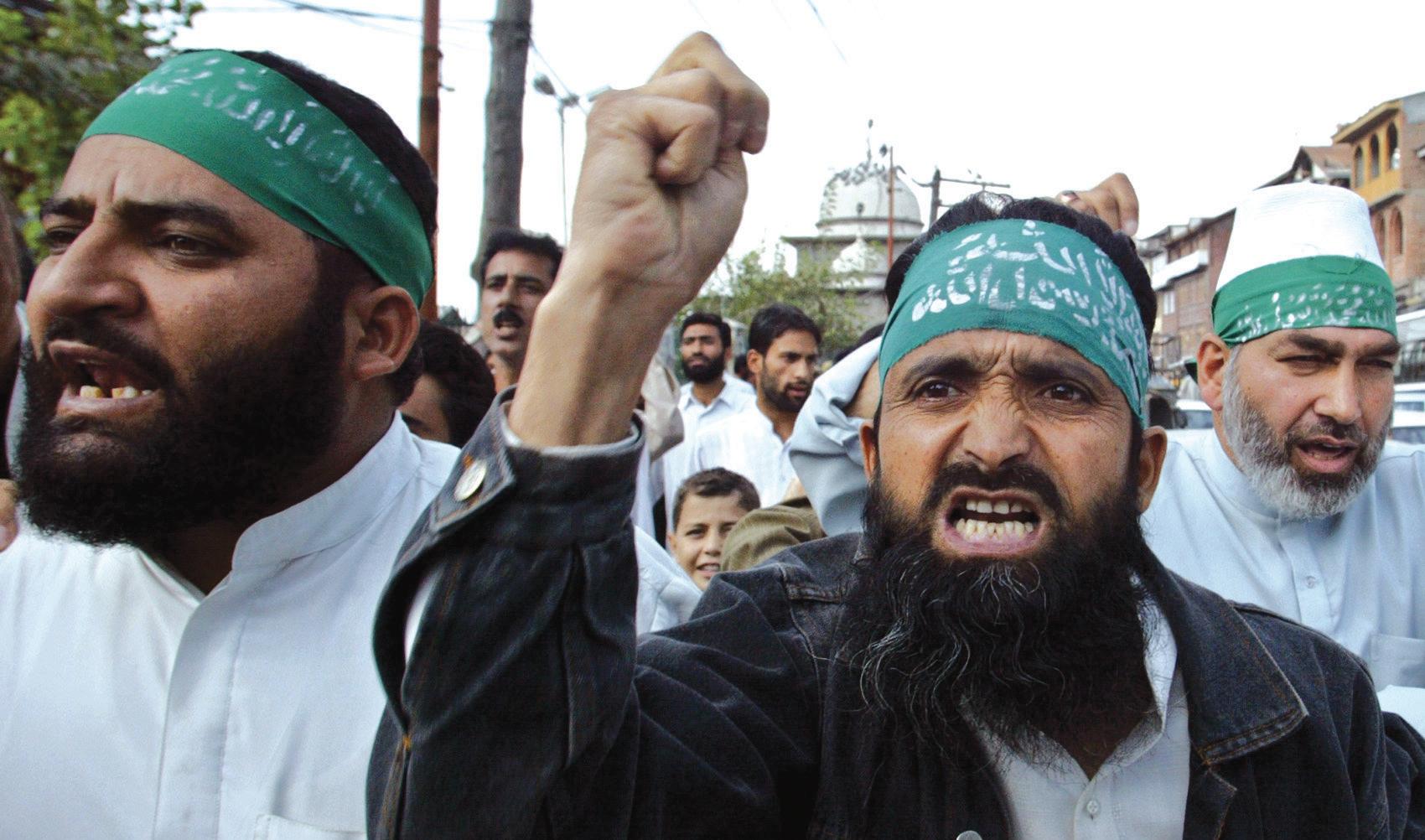
son to the merely measurable, and love to sentimental humanitarianism. The West, Benedict suggested, was in the process of a closing of its own mind.
For, in Benedict’s view, it’s precisely the Christian understanding of God as Logos that opens our minds to their full potential. And this theme was powerfully developed by Benedict exactly two years after Regensburg in a lecture that completely escaped the commen-
to be a thoroughly rational deity rather than a willful, capricious divinity.
Thus astrology began giving way to astronomy, as humans accelerated their quest for truth, confident that humanity’s existence was not the work of mere chance or a master clock-maker, but rather was freely willed by a God who was simultaneously Veritas and Caritas Acceptance that there is truth beyond the quantifiable as well as
subjective realm, as being unscientific, would be the capitulation of reason, the renunciation of its highest possibilities, and hence a disaster for humanity, with very grave consequences.”
Some years ago, another theologian made a similar point, albeit more bluntly: “You cannot assume a rationality and then argue that there is no foundation to that rationality. Either God and rationality go or God and rationality stay.
Apparently it’s only when you quote fourteenth century Byzantine emperors that you get the commentariat’s notice anymore.
tariat’s notice. Apparently it’s only when you quote fourteenth-century Byzantine emperors that you get their attention anymore#
Seated this time before France’s cultural elites in Paris, the Pope argued that quaerere Deum (the search for God) — and not just any god, but the God who incarnates Reason itself — was the indispensible element that allowed European culture to attain its heights of learning.
The same God who gave man hope of eternal life was understood
the freedom to search for that truth must, Benedict then insisted, go hand-in-hand. Because once they’re separated, you end up with “on the one hand, subjective arbitrariness, and on the other, fundamentalist fanaticism.” Expounding the point before his Paris audience, Benedict explained:
“Quaerere Deum — to seek God and to let oneself be found by him, that is today no less necessary than in former times. A purely positivistic culture which tried to drive the question concerning God into the
Either Nietzsche or Aquinas, that is our choice.” And that, perhaps, will be Regensburg’s lasting significance. The lecture that infuriated so many highlighted the ultimate stakes involved in trying to make God disappear, or to regard God as one who regards us as base slaves and demands we do that which is contrary to reason.
No Logos, no rationality. Five years later, it’s still that simple — and challenging — for all of us.
Samuel Gregg is research director at the Acton Institute
Carl Schafer.anniversary of the death of our loved ones with a requiem Mass in which we receive the Blessed Sacrament of the Body of Christ. We renew our communion with the risen Lord and with all his faithful members, both living and deceased.
We need never lose our close personal contact with our deceased loved ones, whether husband or wife, father or mother, relative or friend. They are alive in the risen Lord who carries them towards the final resurrection of all those who have died in the peace of Christ.
Meanwhile, those who have died, while they can’t help their own salvation any longer, can and do pray for us who mercifully remember them. They and the saints share with us on earth the perfect offering of Jesus Christ to his eternal Father. Let us offer our own lives with Jesus, for our deceased family members and friends and for all the dead.
As St Paul wrote to Timothy (2 Tim 2:11), “If we have died with him, then we shall live with him. If we hold firm, then we shall reign with him.”
Carl Schafer OFM is national spiritual assistant of the Tertiary Franciscans for Oceania.
Faith, climate debates suffer from lazinessBy Fr Sean Fernandez
IFIND it frustrating reading reporting on religious matters because the media rarely gets it right. Occasionally a theologian or scholar is quoted, but that is ‘balanced’ with some ignorant blather. It is not balance to contrast an informed opinion with an uninformed one; it is laziness.
We have a moral responsibility for the poor who will suffer most from climate change.
So I can sympathise with climate scientists who have to endure falsehood and misinformation trotted out in the name of balance. The International Panel on Climate Change (IPCC) third assessment report includes the conclusion that ‘the consistency between observed and modelled changes in several studies and the spatial agreement between significant regional warming and consistent impacts at the global scale is sufficient to conclude with high confidence that anthropogenic warming over the last three decades has had a discernible influence on many physical and biological systems’. Each IPCC working group has 200 scientists, 1,000 reviewers, review editors by the dozen and several rounds of reviews. Why am I concerned about this? We have a moral responsibility for the planet of which we are God’s stewards. We have a moral responsibility for the poor who will suffer the most from climate change. We have a moral responsibility for future generations - children, grandchildren, great-grandchildren, nephews and nieces.
Fr Sean Fernandez is parish priest at Attadale in Perth
Archdiocese
SATURDAY, 24 SEPTEMBER
“Be Still In His Presence” Christian programme 10-11.30am at Anglican Church hall (behind parish), 195 Lesmurdie Rd, Lesmurdie. Monthly meetings include praise and worship, silent reflection, lectio divina, small group sharing and a cuppa at the end. Enrich your faith journey. Enq: Lynne 9293 3848 or 0435 252 941.
Archbishop Hickey: LIVING BIBLICALLY in Anglican Ordinariate Group 10am at St Ninian and St Chad Church, 11 Susan St, Maylands. Archbishop Barry Hickey will deliver an address entitled ‘Living Biblically’. Enq: Harry 0417 1801 45.
SUNDAY, 25 SEPTEMBER
Tridentine Latin Mass
2pm at The Good Shepherd Parish, Streich Ave, Kelmscott. Also on 9 and 23 October. Enq: J Rencontre 9390 6646.
SATURDAY, 29 OCTOBER
Mercedes College Perth - graduating class of 1990 reunion 7.30pm Rosie O’Grady’s, Northbridge, cnr James and Milligan Sts. Enq: kathleen.bryce@yahoo.com. au.
FRIDAY, 30 SEPTEMBER
Medjugorje evening of prayer
7-9pm at Our Lady of Mount Carmel Parish, 2 Collick St, Hilton. Includes Eucharistic adoration, rosary, benediction and holy Mass. Free DVDs available. Enq: Eileen 9402 2480, 0407 471 256 or medjugorje@y7mail.com.
FRIDAY, 30 SEPTEMBER TO SUNDAY, 2 OCTOBER
‘Firm in the Faith’ CYM Young Adult retreat Awesome retreat which is based on the theme of WYD11 “Planted and built up in Christ, firm in the Faith’ (Col 2:7). Weekend of fun, activities, music and spiritual talks from fantastic speakers. Retreat cost $80. Ends lunchtime on Sunday. Download registration forms: cym.com.au. Enq: admin@cym. com.au or 9422 7912.
SATURDAY, 1 OCTOBER
Day with Mary 9am-5pm at St Catherine of Siena Parish, 3 Fraser St, Gingin. Day of prayer and instruction based on the Fatima message. 9am video; 10.10am holy Mass; Reconciliation, procession of the Blessed Sacrament, Eucharistic adoration, sermons on Eucharist and Our Lady, rosaries and stations of the Cross. BYO lunch. Bus contact: Nita 9367 1366. Enq: Franciscan Sisters of the Immaculate 9250 8286.
Vigil for Life
8.30am at St Augustine’s Parish, Gladstone St, Rivervale. Begins with holy Mass, followed by rosary procession and vigil at nearby abortion clinic, led by Fr Paul. Weekly prayer vigils: Monday, Thursday and Saturday 8-10am at Rivervale. Enq. Helen 9402 0349.
SUNDAY, 2 OCTOBER
Divine Mercy
1.30pm at St Brigid’s Parish, 211 Aberdeen St, Perth. Main celebrant: Fr Alphonsus. Homily: ‘Saint Faustina’. Begins with Mass followed by Exposition of the Blessed Sacrament and Divine Mercy prayers with Veneration of First Class Relic of St Faustina. Enq: John 9457 7771.
MONDAY, 3 OCTOBER
Transitus of St Francis Of Assisi
6.30pm at Edel Quinn Centre, 36 Windsor St, East Perth. The secular Franciscans celebrating vigil feast of the extraordinary life and death of their founder. Reflection on your life path and personal happiness in God. Begins with holy Mass with Fr Michael followed by refreshments. Enq: Anthony 0449 864 287.
FRIDAY, 7 OCTOBER
Pro-Life Witness
9.30am at St Brigid’s Parish, cnr Great Northern Highway and Morrison Rd, Midland. Begins with holy Mass followed by rosary procession to the
nearby abortion clinic led by the Franciscan Friars of the Immaculate. Weekly prayer vigils: Fridays 9-10.30am at Midland and 10am-12pm at Balcatta. Enq Helen 9402 0349.
SATURDAY, 8 OCTOBER
Annual Mass at Grotto
10.30am at Richard Priestly’s farm, Wariin Rd, Wooroloo. Please bring chair and picnic. BBQ meat at no cost. Farm is located 2.2km from corner of Wariin Rd. Allow 45 minutes from Midland. Enq: Richard 9573 1247 or 0428 502 74.
Divine Mercy Healing Mass
2.30pm at St Francis Xavier’s Parish, Windsor St, East Perth. Main celebrant: Fr Marcellinus. Begins with Mass followed by prayers and veneration of First Class Relic of St Faustina Kowalska. Reconciliation available in English, Maltese and Italian. Refreshments afterwards. Enq: John 9457 7771.
SATURDAY, 8 TO SUNDAY 9 OCTOBER
“Finding God in everyday life”
Holy Trinity Community Seminar
9am at St Benedict’s Hall (St Benedict’s primary school), Alness St Ardross. Speakers: Fr Revi Tanod & other international speakers. Cost: free and food provided. Registration close 3 October (spaces are limited). Enq: Bryan 0406 671 388, Christina 0412 624 998 or David htc_figel@yahoo.com.au.
SUNDAY, 9 OCTOBER
Eucharistic Reparation – World Apostolate of Fatima
3pm at St Emilie de Vialar Parish, Amherst Rd, Canning Vale. Pilgrim Virgin statue present. Enq: 9339 2614.
THURSDAY, 13 OCTOBER
Mother’s Prayers Mass
10am at Our Lady Queen of Apostles Parish, Tribute St, Riverton. For mothers, fathers an grandmothers, grandfathers coming together to pray for their children, and grandchildren. Fellowship afterwards. Enq: Veronica 9447 0671.
SUNDAY, 16 OCTOBER
Lord of the Harvest Parish
50th Anniversary
10.30am at St Michael’s Parish, Lindsay St, Beacon. Begins with Mass, followed by lunch at Beacon Country Club. All past and present parishioners and ex-locals invited. RSPV and enq: Michelle 9686 6056 or bingarra@bigpond.com.
Vocations Inquiry day – St Charles Seminary 9.30am at St Charles’ Seminary, 30 Meadow St, Guildford. Begins with Morning Prayer, and seminarian’s testimonies over morning tea. Mass celebrated at 11.30am. St Charles’ Traditional Sunday Lunch will be provided. Website: www.stcharlesseminary.org.au. Please register by 9 October. Enq: Helen 9279 1310, admin@seminary-perth.org.au
MONDAY, 9 JANUARY TO MONDAY, 16 JANUARY 2012
Summer school
The Royal School of Church Music in Australia (RSCM) will be hosting a summer school for all denominations next year. The programme will include workshops for church musicians and singers to help them inspire their congregations towards a more enjoyable and meaningful participation in Church liturgy. Enrolments are now open and interested parties can find out more by going to www.rscmaustralia.org.au. Enq: Deirdre 9457 4010.
SATURDAY, 25 FEBRUARY 2012
A reunion for Holy Cross Primary School, Kensington
Any ex-students or family members, please contact Julie Bowles (nee O’Hara) on 9397 0638 or email jules7@iinet.net.au.
EVERY SUNDAY
Gate of Heaven Catholic Radio
Join the Franciscans of the Immaculate from 7.309pm on Radio Fremantle 107.9FM for Catholic radio broadcast of EWTN and our own live shows. Enq: radio@ausmaria.com.
Pilgrim Mass - Shrine of the Virgin of the Revelation 2pm at Shrine, 36 Chittering Rd, Bullsbrook. Commencing with rosary followed by benediction. Reconciliation is available before every celebration. Anointing of the sick administered during Mass
every second Sunday of the month. Pilgrimage in honour of the Virgin of the Revelation, last Sunday of the month. Side entrance to the church and shrine open daily between 9am-5pm. Enq Sacri 9447 3292.
EVERY FIRST SUNDAY
Divine Mercy chaplet and healing prayer
3pm at Santa Clara Church, 72 Palmerston St, Bentley. Includes adoration and individual prayer for healing. Spiritual leader Fr Francisco. All welcome. Enq: Fr Francisco 9458 2944.
Divine Mercy
1.30pm at St Francis Xavier Parish, 25 Windsor St, East Perth. Fr Alphonsus. Includes exposition of the Blessed Sacrament and Reconciliation, holy rosary, and Divine Mercy prayers. Followed by benediction and veneration of first class relics of St Faustina Kowalska. Enq: John 9457 7771.
St Mary’s Cathedral youth group –fellowship with pizza
5pm at Mary’s Cathedral, 17 Victoria Sq, Perth. Begins with youth Mass followed by fellowship downstairs in parish centre. Bring a plate to share. Enq: Bradley on youthfromsmc@gmail.com.
EVERY SECOND SUNDAY
Healing hour for the sick
6pm at St Lawrence Parish, 392 Albert St, Balcatta. Begins with Mass, exposition of the Blessed Sacrament and prayers. Enq: Fr Irek 9344 7066 or ww.stlawrence.org.au.
EVERY THIRD SUNDAY OF THE MONTH
Prayer in style of Taize during September
7-8pm at Sisters of St Joseph’s Chapel, 16 York St, South Perth. Chapel doors open at 6.30pm. Everyone welcome to come along for prayer, using songs from Taize in the stillness of a candlelit chapel. Mary MacKillop merchandise and books for sale in the Mary MacKillop Centre. Enq: Sr Maree Riddler 0414 683 926.
Oblates of St Benedict Meeting
2pm at St Joseph’s Convent, York St, South Perth. For all interested in studying the rule of St Benedict and its relevance to everyday life. Afternoon tea. Enq: Secretary 9457 5758.
EVERY FOURTH SUNDAY OF THE MONTH
Holy hour for vocations to the priesthood, religious life
2-3pm at Infant Jesus Parish, Wellington St, Morley. The hour includes exposition of the Blessed Eucharist, silent prayer, scripture and prayers of intercession. Come and pray that those discerning vocations can hear clearly God’s call.
EVERY MONDAY
Evening adoration and Mass
7pm, St Thomas Parish, Claremont, cnr Melville St and College Rd. Eucharistic adoration, reconciliation, evening prayer and benediction, followed by Mass and night prayer at 8pm. Enq: Kim 9384 0598, claremont@perthcatholic.org.au.
EVERY TUESDAY
Bible teaching with a difference
7.30pm at St Joachim’s Parish hall, Victoria Park. Exciting revelations with meaningful applications that will change your life. Bring Bible, a notebook and a friend. Enq: Jan 9284 1662.
Novena to Our Lady of the Miraculous Medal
6pm at the Pater Noster Church, Marmion and Evershed Sts, Myaree. Mass at 5.30pm followed by benediction. Enq: John 0408 952 194.
Norma Woodcock’s Teaching Session
7-8pm at St Benedict’s School Hall, Alness St, Applecross. Be empowered by the Gospel message each week in a personal way. How can we live meaningful and hope filled lives? Accredited - CEO - Faith Formation for ongoing renewal. Catholic Education staff : $10 for Accreditation. Cost: donation.. Enq: 94871772 or www.normawoodcock. com
EVERY WEDNESDAY
Holy Spirit of Freedom community
7.30pm at The Church of Christ, 111 Stirling St, Perth. We are delighted to welcome everyone to attend our Holy Spirit of Freedom praise meeting. Enq: 0423 907 869 or hsofperth@gmail.com.
Holy hour at Catholic Youth Ministry
6pm at 40A Mary St, Highgate, Catholic Pastoral Centre. 5.30pm Mass followed by $5 fellowship supper. Enq: Stefania 9422 7912 or www.cym. com.au.
Bible study at Cathedral
6.15pm at St Mary’s Cathedral, 17 Victoria Sq, Perth. Deepen your faith through reading and reflecting on holy scripture by Fr Jean-Noel. Meeting room beneath Cathedral. Enq: Marie 9223 1372.
Holy Hour - Catholic Youth Ministry
5.30pm at Catholic Pastoral Centre, 40A Mary St, Highgate. Begins with Mass; 6.30pm Holy Hour of Adoration, followed by $5 supper and fellowship. Enq: cym.com.au or 9422 7912.
EVERY FIRST WEDNESDAY
Holy hour prayer for priests
7.30-8.30pm at Holy Spirit Parish, 2 Keaney Pl, City Beach. All welcome. Enq: Linda 9341 3079.
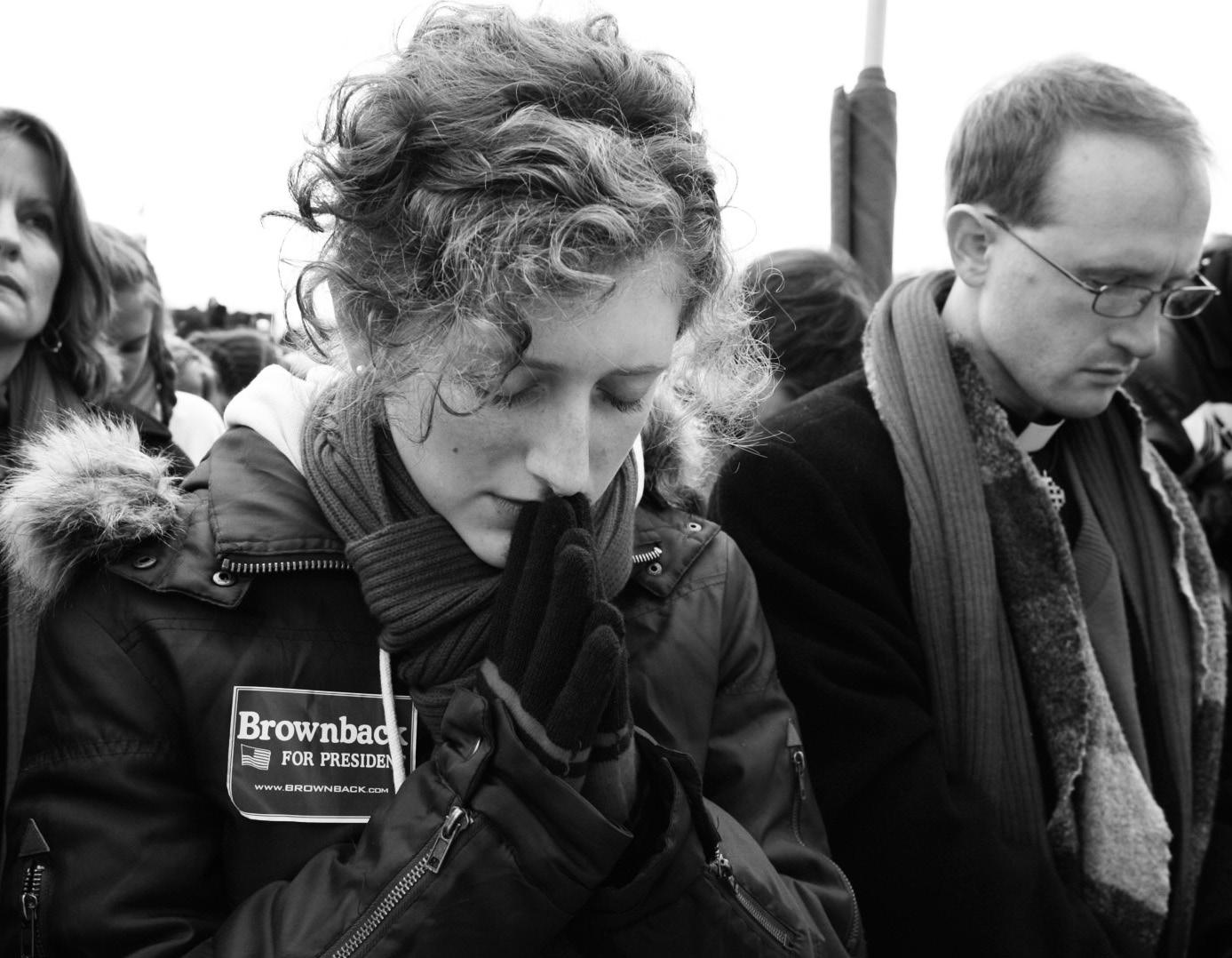
Panorama Editorial Policy
The Record reserves the right to decline or edit any items submitted for publication in Panorama. Deadline: 11am every Monday.
PeterRosengren, Editor
SECOND WEDNESDAY OF MONTH
Chaplets of the Divine Mercy
7.30pm at St Thomas More Catholic Parish, Dean Rd, Bateman. A beautiful, prayerful, sung devotion accompanied by exposition and followed by benediction. Enq: George 9310 9493 or 9325 2010 (w).
EVERY THURSDAY
Divine Mercy
11am at Sts John and Paul Church, Pinetree Gully Rd, Willetton. Pray the rosary and chaplet of Divine Mercy, and for the consecrated life, especially here in John Paul Parish. Concludes with veneration of the first class relic of St Faustina. Please do come and join us in prayer. Enq: John 9457 7771.
St Mary’s Cathedral praise meeting 7.45pm every Thursday at the Legion of Mary’s Edel Quinn Centre, 36 Windsor St, East Perth. Includes praise song and healing ministry. Enq: Kay 9382 3668 or fmi@flameministries.org.
FIRST THURSDAY OF THE MONTH
Prayer in style of Taize
7.30-8.30pm at Our Lady of Grace Parish, 3 Kitchener St, North Beach. Includes prayer, song and silence in candlelight – symbol of Christ the light of the world. Taize info: www.taize.fr Enq: Secretary 9448 488 or 9448 4457.
FIRST FRIDAY OF THE MONTH
Communion reparation all-night vigil 7pm-1.30am at two different locations: Corpus Christi Parish, Lochee St, Mosman Park and St Gerard Majella Parish, cnr Ravenswood Dr and Majella Rd, Westminster (Mirrabooka). In reparation for outrages committed against the Sacred Hearts of Jesus and Mary. Enq: (Mosman Park) Vicky 0400 282 357 and Fr Giosue 9349 2315 or John 9344 2609.
Healing Mass
7pm at St Peter’s Parish, Inglewood. Praise and worship, exposition and Eucharistic adoration, benediction and anointing of the sick, followed by holy Mass and fellowship. Celebrants: Fr Dat and invited priests. 6.45pm Reconciliation. Enq: Mary Ann: 0409 672 304., Prescilla: 0433 457 352 and Catherine: 0433 923 083.
Holy hour for vocations to the priesthood and religious life
7pm at Little Sisters of the Poor Chapel, 2 Rawlins St, Glendalough. Mass followed by adoration with Fr Doug Harris. All welcome. Refreshments provided.
Catholic Faith Renewal Evening
7.30pm at Sts John and Paul Parish, Pinetree Gully Rd, Willetton. Songs of praise, sharing by a priest followed by thanksgiving Mass and light refreshments afterwards. All welcome to attend and bring your family and friends. Enq: Kathy 9295 0913, Ann 0412 166 164 or catholicfaithrenewal@gmail.com.
Healing and Anointing Mass
8.45am Pater Noster Church, Evershed St, Myaree. Begins with Reconciliation followed by 9am Mass of the Sacred Heart of Jesus, Anointing of the Sick and prayers to St Peregrine. Enq: Joy 9337 7189.
EVERY FIRST SATURDAY
Healing Mass 12.35pm at St Thomas Parish, cnr Melville St and College Rd, Claremont. Spiritual leader: Fr Waddell. Enq: Kim 9384 0598, claremont@perthcatholic. org.au.
EVERY FOURTH SATURDAY
Voice of the Voiceless Healing Mass 12pm at St Brigid’s Parish, 211 Aberdeen St. Northbridge. Bring a plate to share after Mass. Enq: Frank 9296 7591 or 0408 183 325.
FREE DIVINE MERCY IMAGE FOR PARISHES
High quality oil painting and glossy print –Divine Mercy promotions Images are of very high quality. For any parish willing to accept and place inside the church. Oil paintings - 160 x 90cm and glossy print -100 x 60cm. Enq: Irene 922 11247 or 9417 3267 (w).
Sacred Heart pioneers Is there anyone out there who would like to know more about the Sacred Heart pioneers? If so, please contact: Spiritual Director Fr Doug Harris 9444 6131 or John 9457 7771.
St Philomena’s Chapel 3/24 Juna Drive, Malaga. Mass of the day: Monday 6.45am. Vigil Masses: Mon-Fri 4.45pm. vholidays. Enq: Fr David 9376 1734.
CATHOLICS CORNER Retailer of Catholic products specialising in gifts, cards and apparel for Baptism, Communion and Confirmation. Ph 9456 1777. Shop 12, 64-66 Bannister Rd, Canning Vale. Open Mon-Sat.
RICH HARVEST YOUR
CHRISTIAN SHOP Looking for Bibles, CDs, books, cards, gifts, statues, Baptism/Communion apparel, religious vestments, etc? Visit us at 39 Hulme Ct (off McCoy St), Myaree. Ph 9329 9889 (after 10.30am Mon to Sat). We are here to serve.
KINLAR VESTMENTS
Quality handmade and decorated vestments: albs, stoles, chasubles, altar linen, banners, etc. 12 Favenc Way, Padbury. By appointment only. Ph Vickii on 9402 1318, 0409 114 093 or kinlar.vestments@gmail.com.
HOLIDAY ACCOMMODATION
ESPERANCE 3 bedroom house f/furnished Ph 08 9076 5083.
Deadline: 11am Monday
Quality tax returns prepared by registered tax agent with over 35 years’ experience. Call Tony Marchei on 0412 055 184 for appt. AXXO Accounting & Management, Unit 20/222 Walter Rd, Morley.
LOSE WEIGHT safely. Ongoing follow-up. Michael 0412 518 318.
ARE YOU BUYING OR SELLING real estate or a business? Why not ask Excel Settlements for a quote for your settlement. We offer reasonable fees, excellent service and no hidden costs. Ring Excel on 9481 4499 for a quote. Check our web site on www.excelsettlements.com.au.
ALL AREAS. Competitive rates. Mike Murphy Ph 0416 226 434.
BRENDAN HANDYMAN SERVICES
Home, building maintenance, repairs and renovations. NOR. Ph 0427 539 588.
PR OPERTY MAINTENANCE
Your handyperson. No job too small. SOR. Jim 0413 309 821.
BRICK RE-POINTING Ph Nigel 9242 2952.
PERROTT PAINTING Pty Ltd
For all your residential, commercial painting requirements. Ph Tom Perrott 9444 1200.
PICASSO PAINTING Top service.
Ph 0419 915 836, fax 9345 0505.
FOR SALE
CHEAP, VARIOUS CATHOLIC/ PROTESTANT Books New/2nd Hand/DVDs/CDs 94404358
BOOK BINDING
NEW BOOK BINDING, General Book Repairs; Rebinding; New Ribbons; Old Leather Bindings Restored.Tydewi Bindery 0422 968 572.
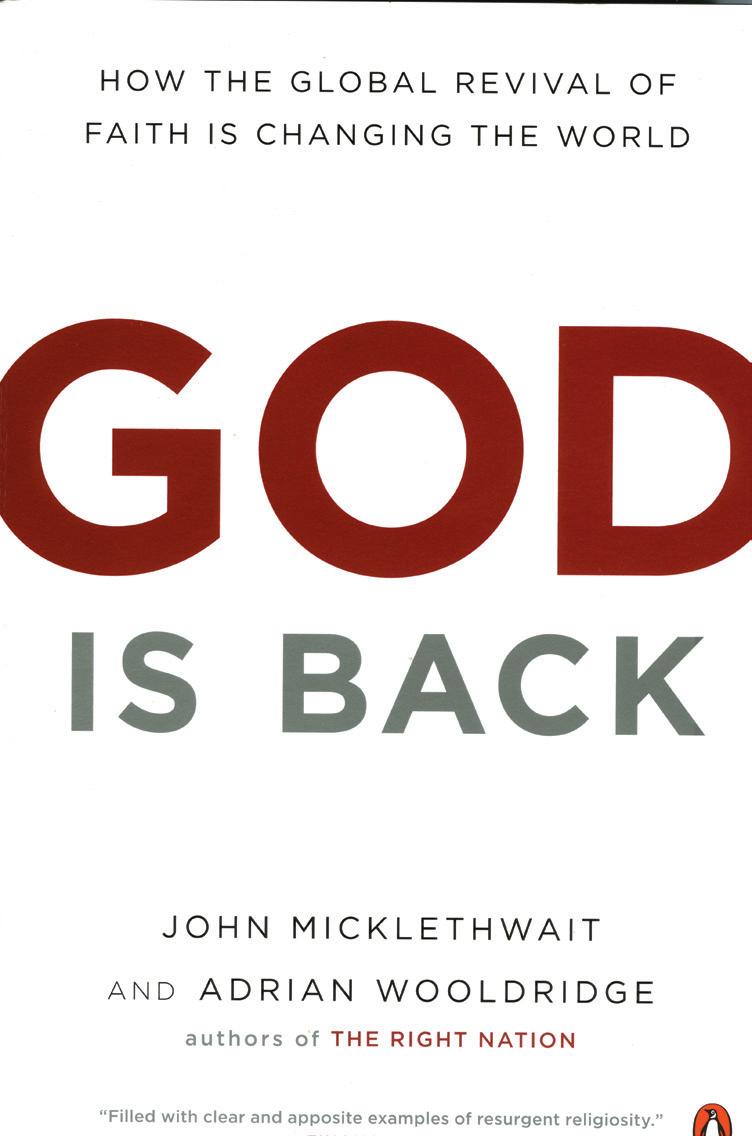

ACROSS
7 “___ Novarum”
8 The Bible
10 Deaconess in the early Church
12 Sarah’s response when she heard that she would have a child
13 Catholic comedienne of “Your Show of Shows”
16 Church instrument, sometimes 18 Communion wafer
20 OT prophetic book
21 Sister of Lazarus
22 Another name for Jacob
25 Tunic-like vestment
26 Ezekiel scattered this to the wind (Ezek 5:1-2)
27 He walked with God (Gen 5:24)
28 Shem’s father
29 Augustine was bishop here
31 Archdiocese and capital of Canada
34 Certain opening
35 Destroyed, in the Douay
DOWN
1 Wife of Jacob
2 An epistle
3 St. Francis is the patron of this
4 God, in Paris
5 State in which the Diocese of Salt Lake City is found
6 St. Thomas ___
9 Prayer to Mary
Gr Ezek 18:25-28 Renounce sin
Ps 24:4-9 Walk in God’s truth Phil 2:1-11 Be Christ-minded
Mt 21:28-32 Change of heart
26 M Ss Cosmas and Damian, martyrs (O)
Gr Zech 8:1-8 The Lord of hosts
Ps 101:16-21,29, 22-23 The Lord leaned down Lk 9:46-50 The least one is great
27 Tu St Vincent de Paul, priest (M)
Wh Zech 8:20-23 The Lord’s favour
Ps 86 O city of God!
Lk 9:51-56 Road for Jerusalem
28 W St Wenceslaus, martyr (O) Gr Ss Lawrence Ruiz and companions, martyrs (O) Neh 2:1-8 King grants requests Ps 136:1-6 Sing Zion’s songs Lk 9:57-62 Spread the news
ARCHANGELS (Feast) Wh Dan 7:9-10, 13-14 one of great age [Alt. Rev 12:7-12 Blood of the Lamb] Ps 137:1-5 I will bless you Jn 1:47-51 The Son of God 30 F St Jerome, priest, doctor of the church (M) Wh Bar 1:15-22 we have not listened Ps 78:1-5, 8-9 Come to our help Lk 10:13-16 Repented long ago
1
11 Martyred Salvadoran, Bishop Romero
14 Archdiocese in Nebraska
15 The table
17 “Love your as yourself”
18 City that was the home of Abram
19 A queen from this country came to hear Solomon speak
23 Diocese of Honolulu greeting
24 Saint Damien’s island
26 It is given after the Gospel
29 “…now and at the of our death. Amen”
30 Leader of the Church
32 Ordinary
33 “And also you.”
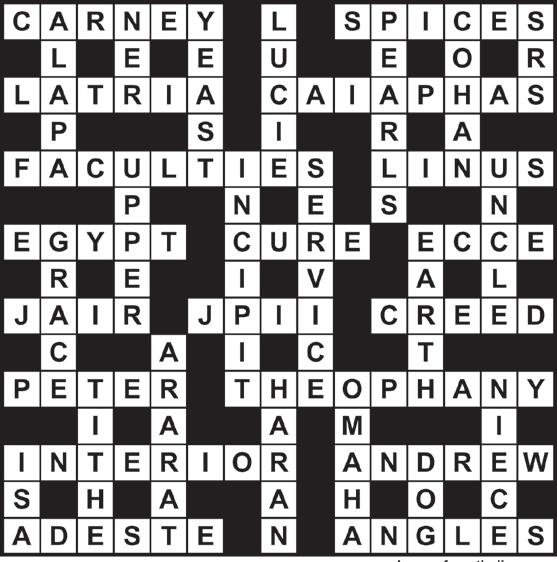
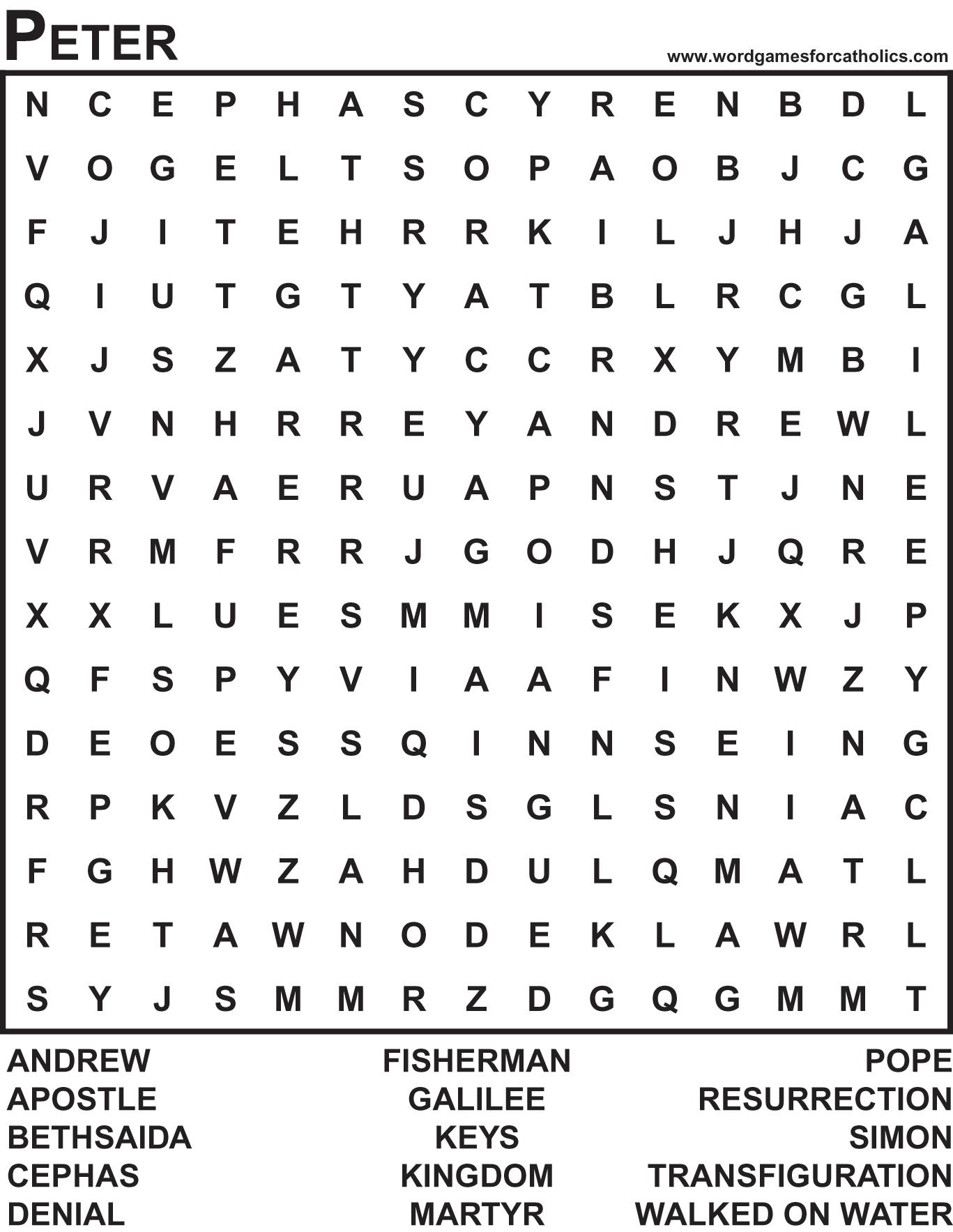
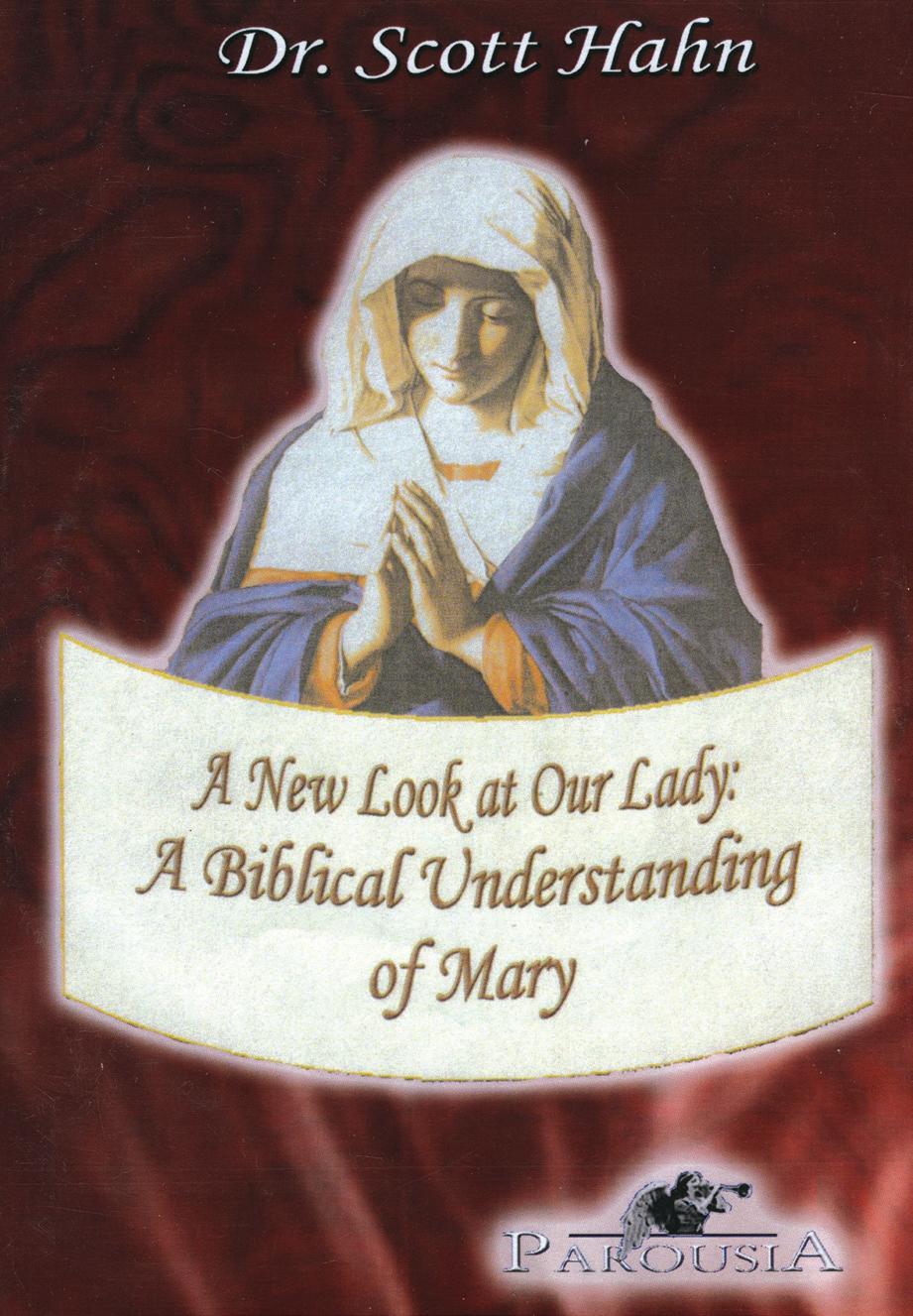
Dr Scott Hahn
RRP $40
If you have ever encountered objections to the Church’s teaching on Mary, then you need these CDs! In one of the most spectacular CD series we offer, Scott Hahn reveals the Biblical basis for the Catholic teaching on Mary, the Blessed Virgin.
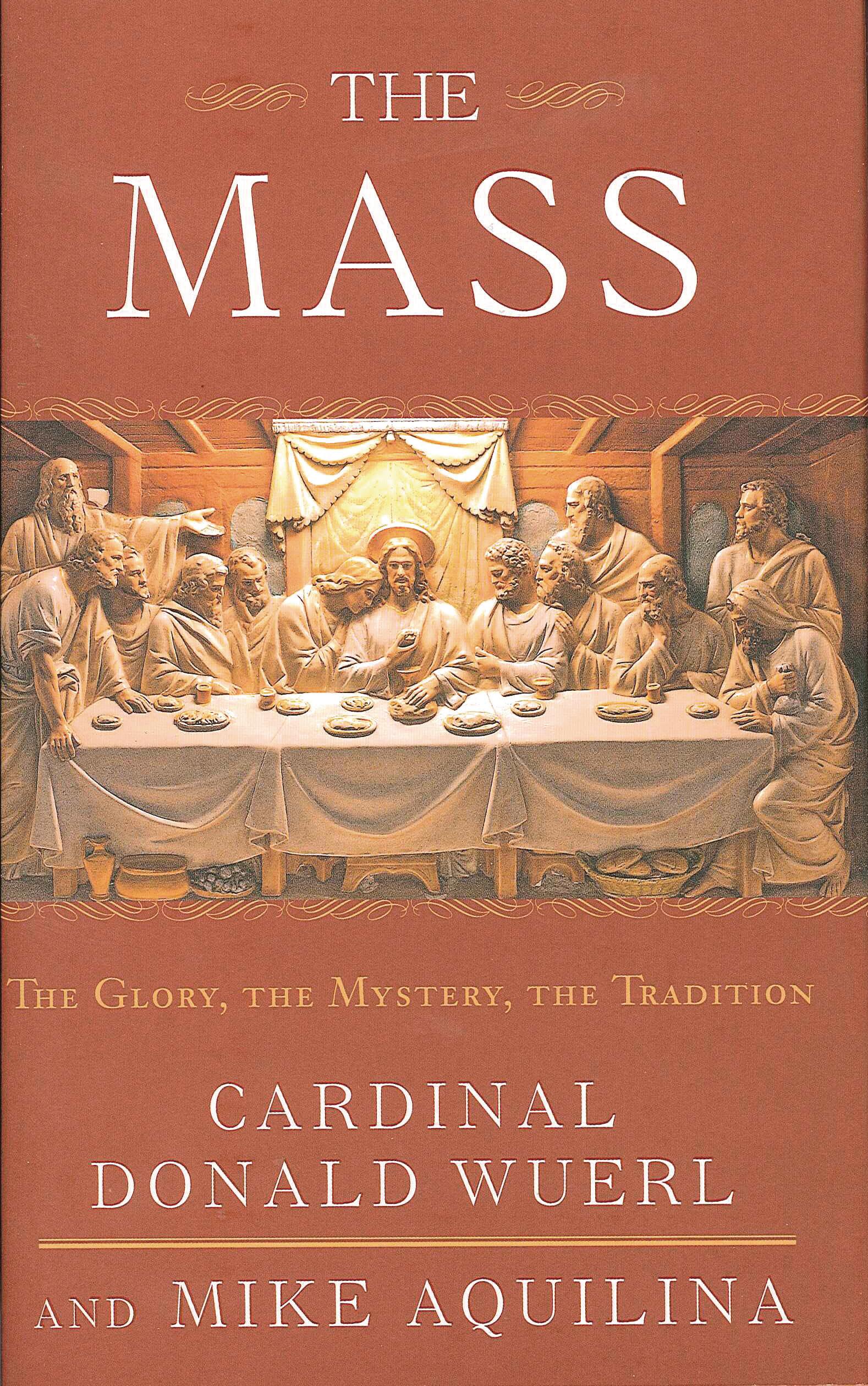
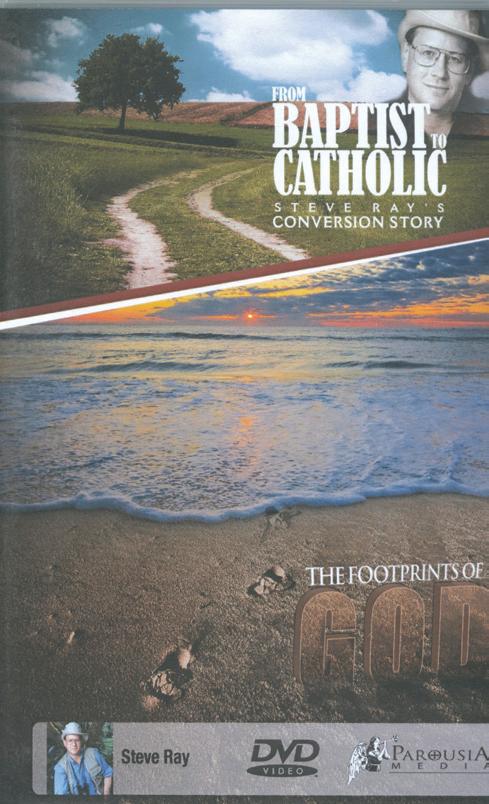
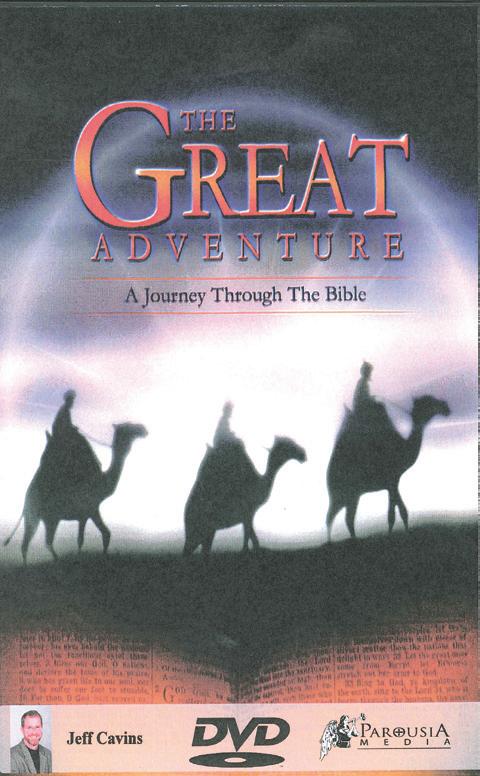
Steve Ray
RRP $16.95
From Baptist to Catholic: The unintended Journey
1) What I used to believe and how I opposed the Catholic Church
2) How the foundations of our Evangelical Protestantism began to crumble
3) Why I had to give up my “Bible Only” theology
4) The Ship and Raft Analogy: How do I view Protestants now
5) Short history of the Bible over the last 2,000 years
6) Final struggles and the moment of decision
7) Our first Mass and reception into the Church
8) Concluding thoughts on being a Catholic.
Jeff Cavins
RRP $20
Now on DVD, the popular host of EWTN’s Life on the Rock guides you through the story of Salvation History with specially selected readings from 14 of the 73 canonical books of Catholic Scripture but that’s not all. Each Great Adventure DVD programme kit also includes an ingenious mnemonic beaded wristband for quick memorisation, a special laminated “cue card” and the Bible timeline, plus a powerful Supplemental Guide which includes an insightful “how to study” topical guide, the Timeline key, reading programme, maps and more!
Cardinal Dinald Wuerl and Mike Aquilina
RRP $35.45
The Mass: The Glory, the Mystery, the Tradition is an engaging and authoritative guide to Catholicism’s most distinctive practice. And now, with the Church introducing revised language for the Mass, Catholics have a perfect opportunity to renew their understanding of this beautiful and beloved celebration.
With eloquent prose and elegant black and white photography, bestselling authors Archbishop Donald Wuerl and Mike Aquilina guide readers through the different parts of the Mass, from the entrance procession to the blessing and dismissal, capturing the deep meaning of elements that are at once ordinary and mysterious: bread and wine, water and candles, altar cloths and ceremonial books.
Email: bookshop@therecord.com.au
Address: 21 Victoria Square, Perth 6000